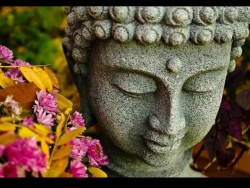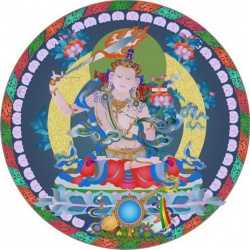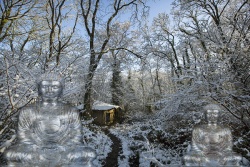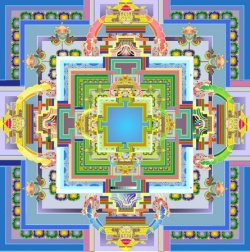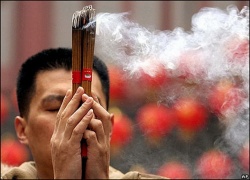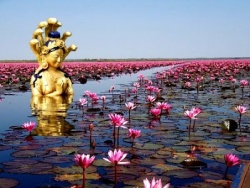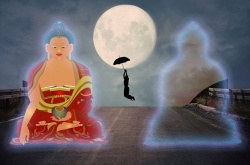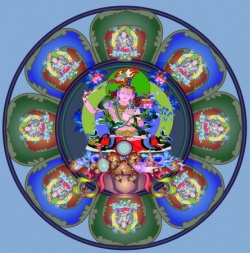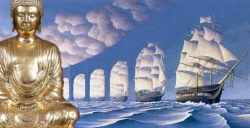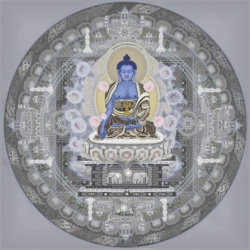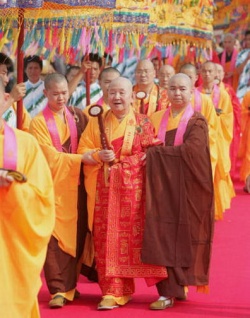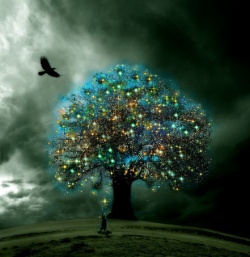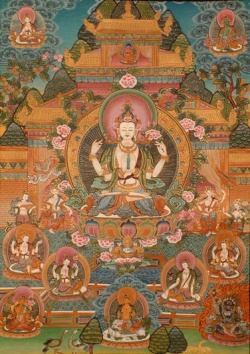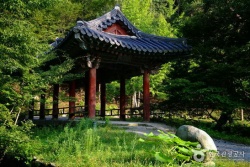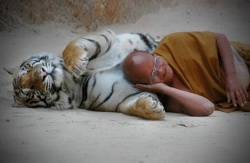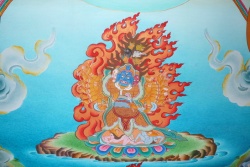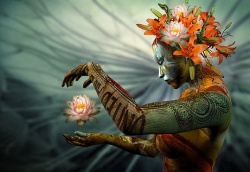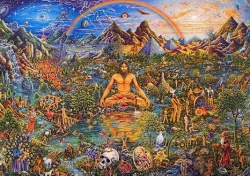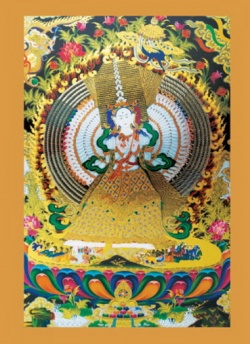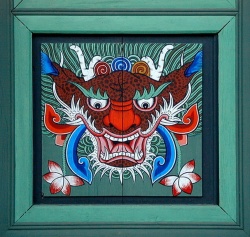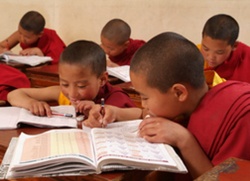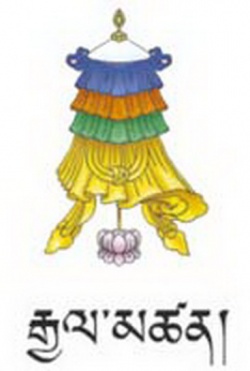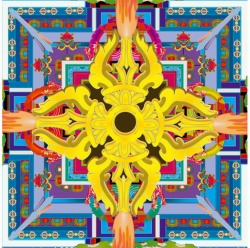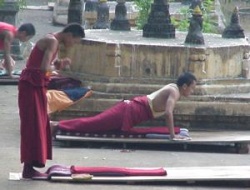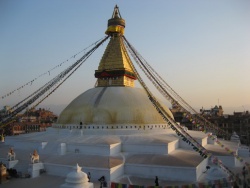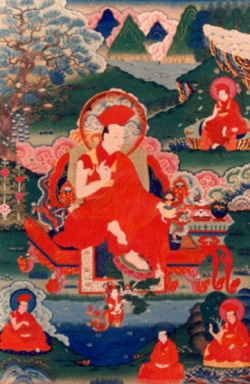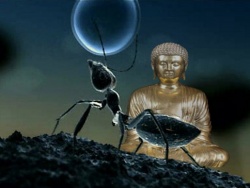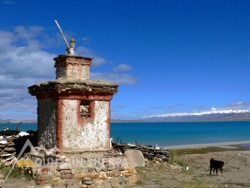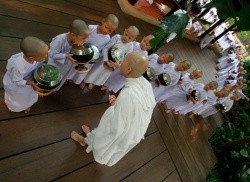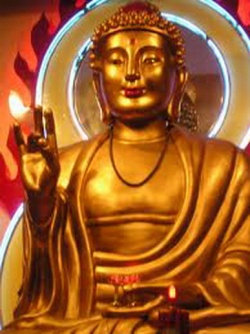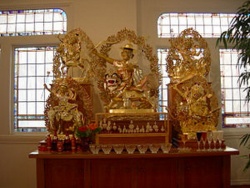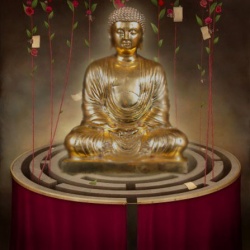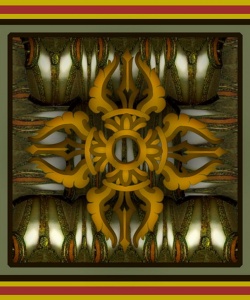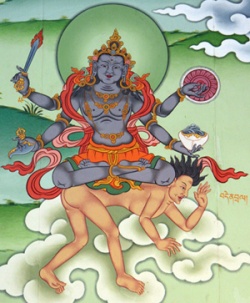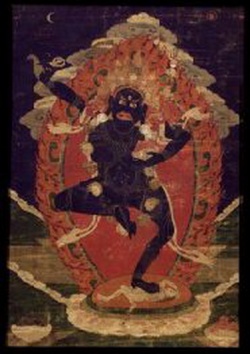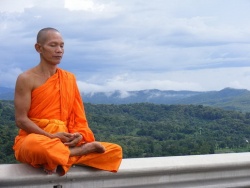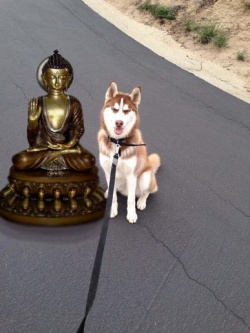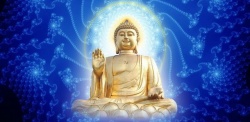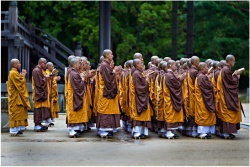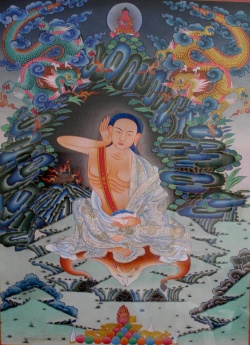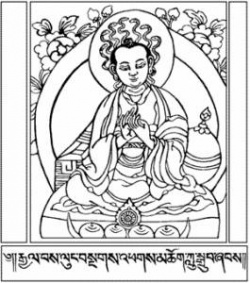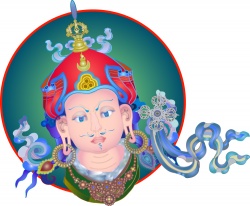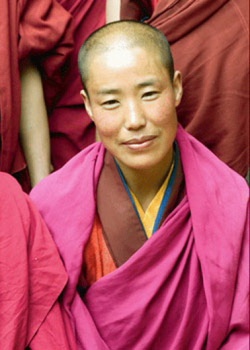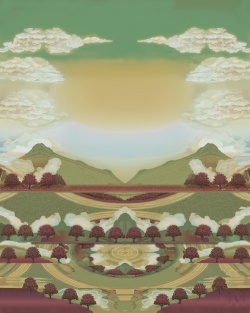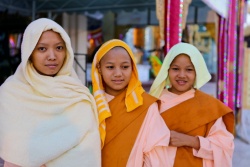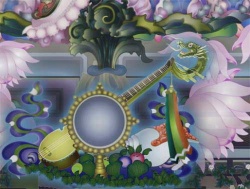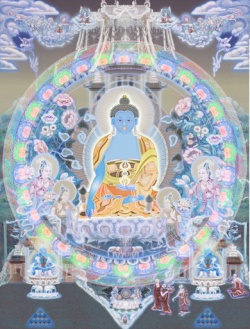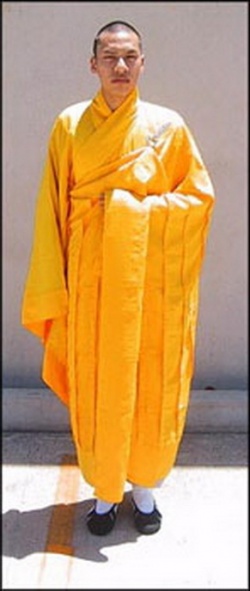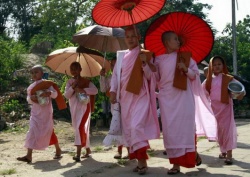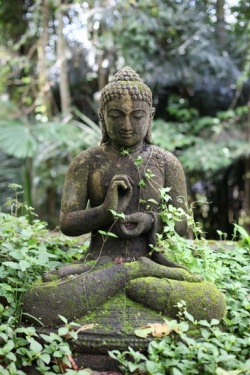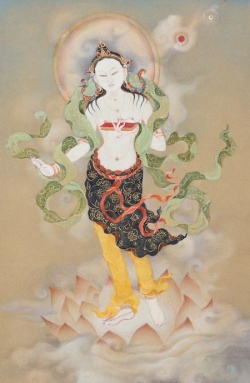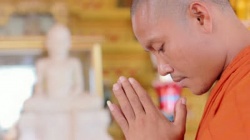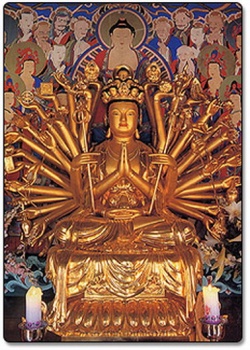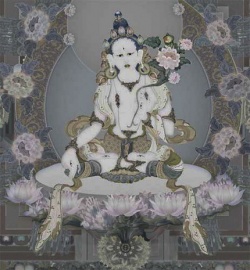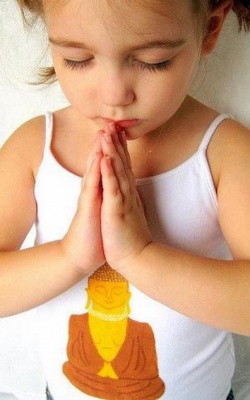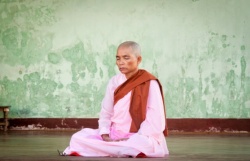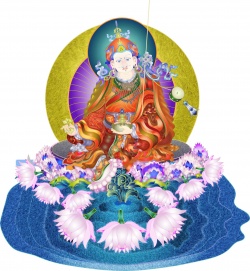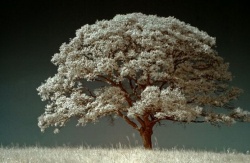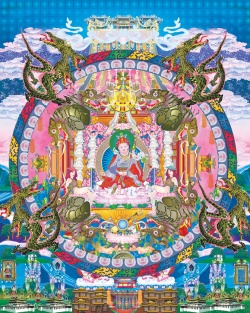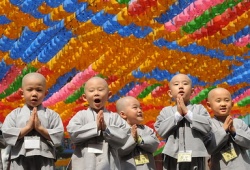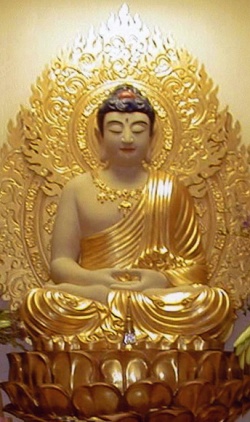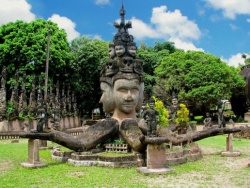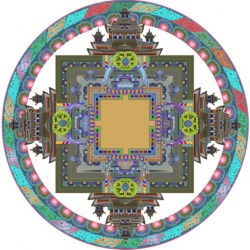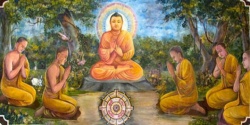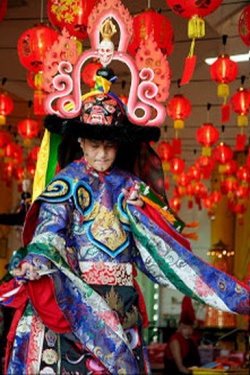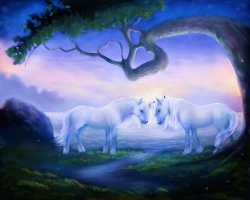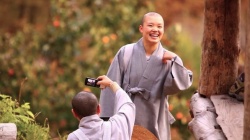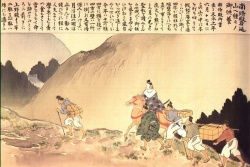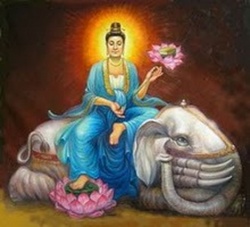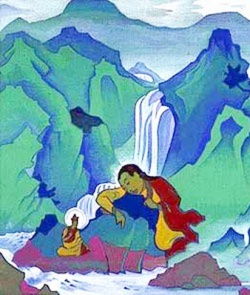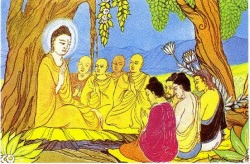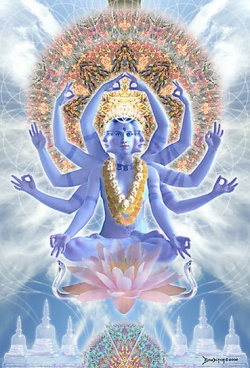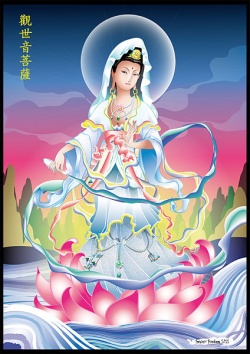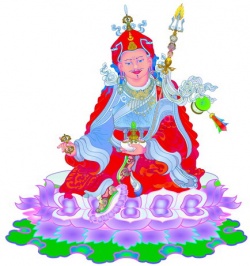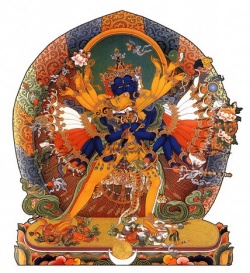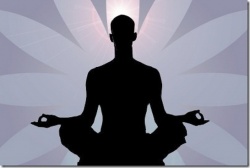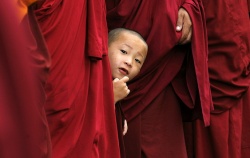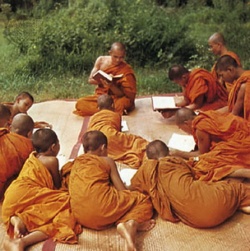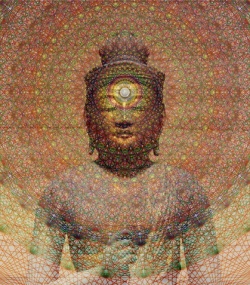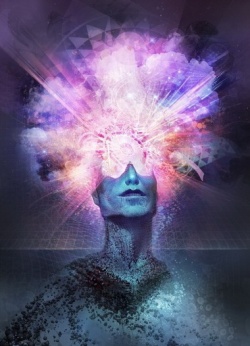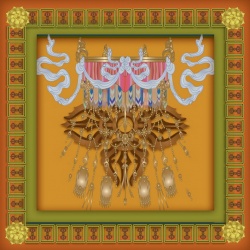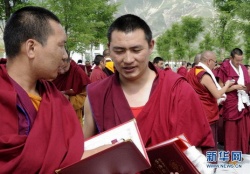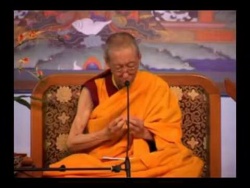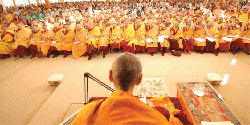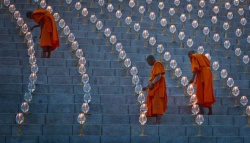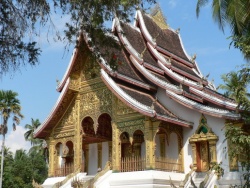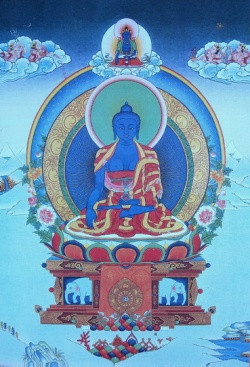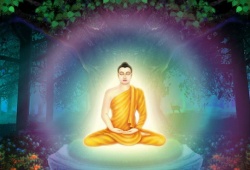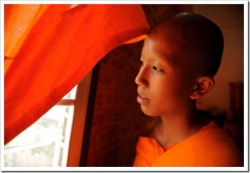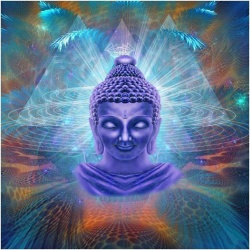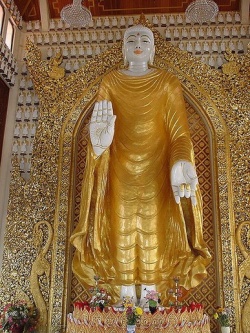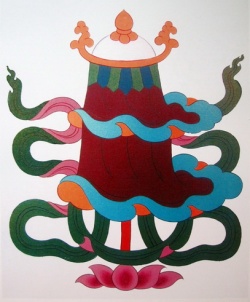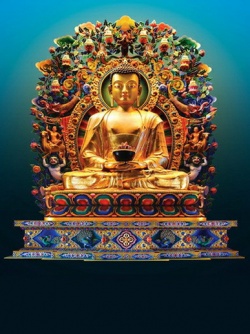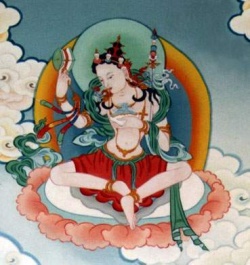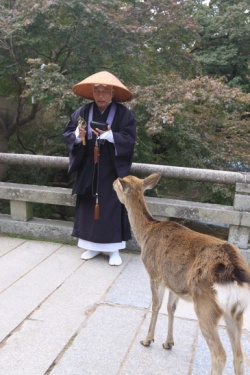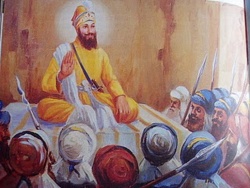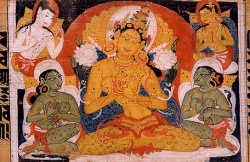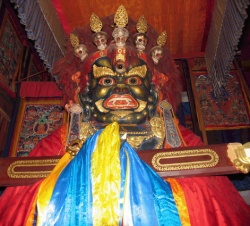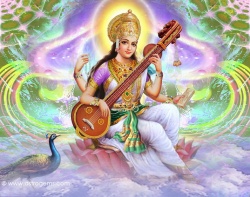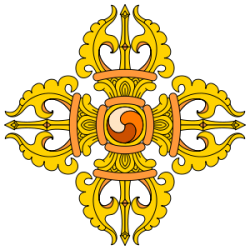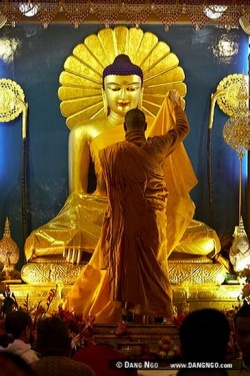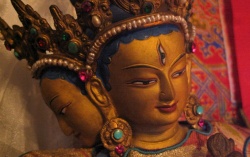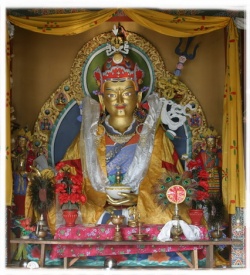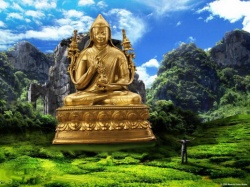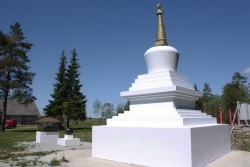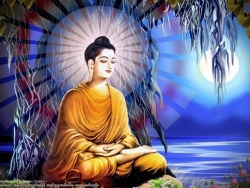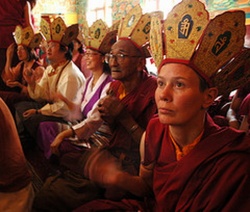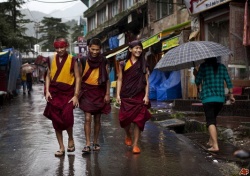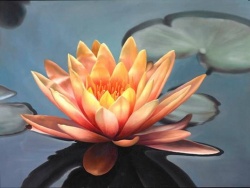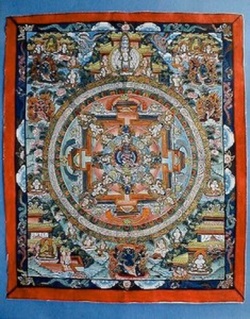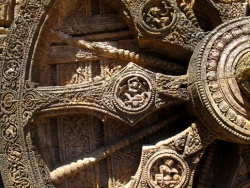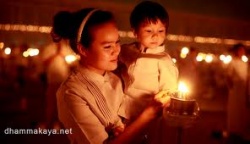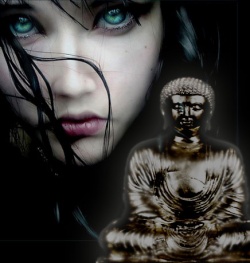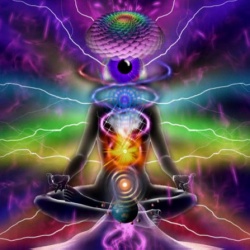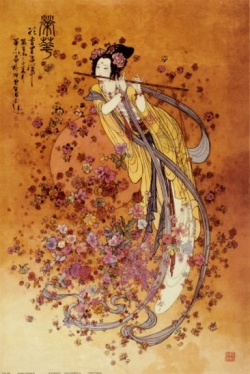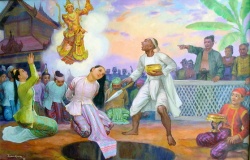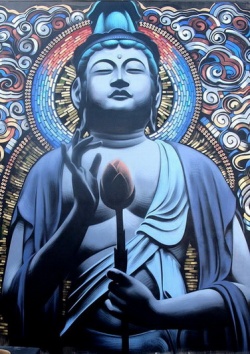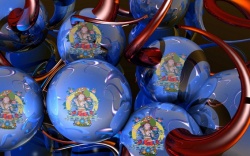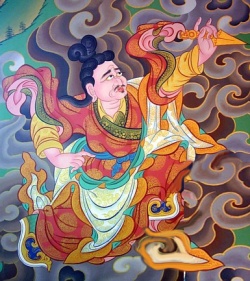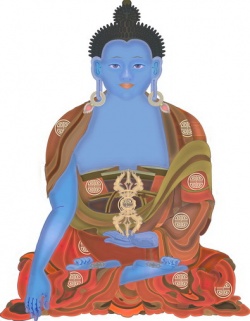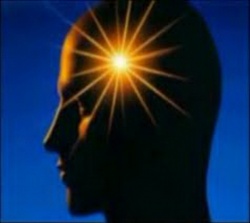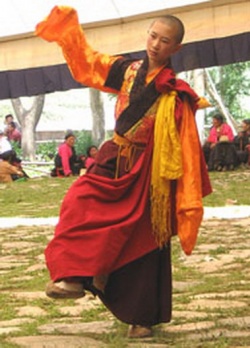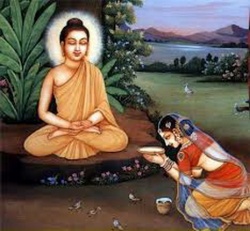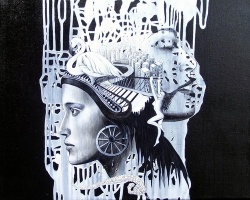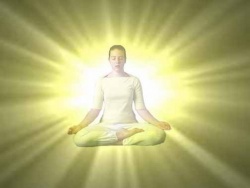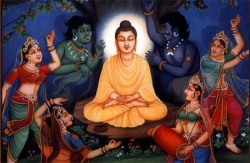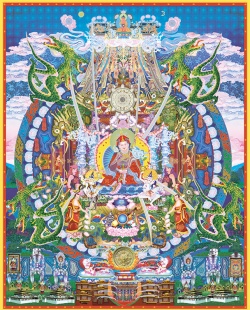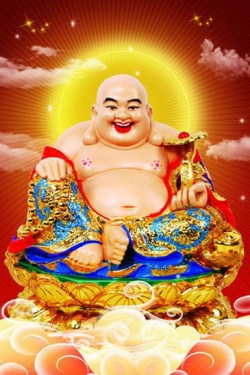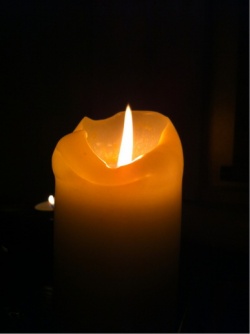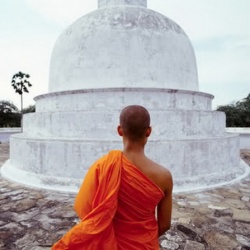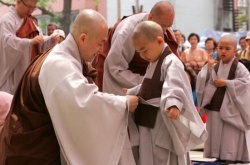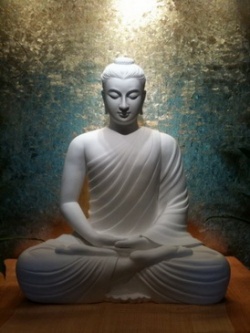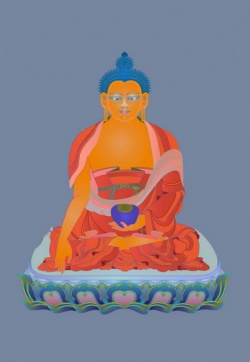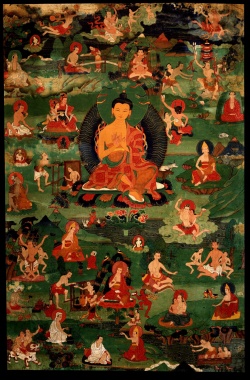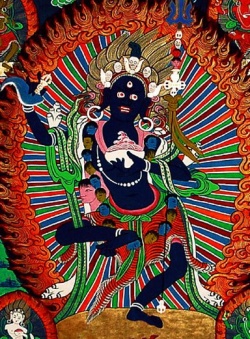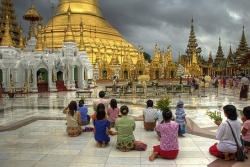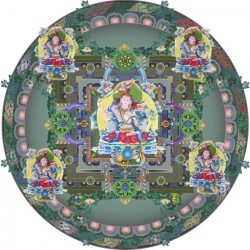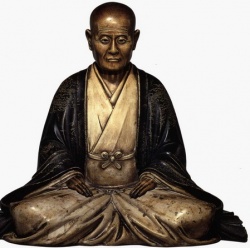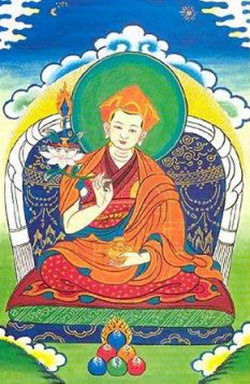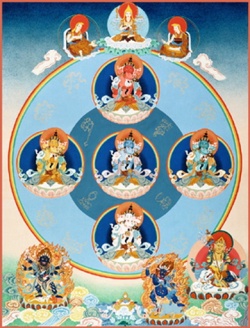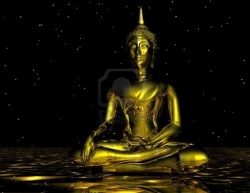Difference between revisions of "The Wonderful Dharma Lotus Flower Sutra with commentary by the Venerable Master Hsuan Hua: Chapter 4: Belief and Understanding"
m (Text replacement - "tangible" to "tangible") |
|||
| Line 1,094: | Line 1,094: | ||
'''Commentary: | '''Commentary: | ||
| − | The wealthy elder could not [[sleep]] at night, [[thinking]] of his son. And he did not have any appetite. Why couldn’t he [[sleep]]? Because he was too wealthy. He do not know what to do with it all. So he was very worried. Then the poor son, who had run away, that is, those of the [[Two Vehicles]] who had run off, seeking clothing and [[food]]. They were seeking the [[Dharma]]. Went from city to city. They passed through the twelve places: the [[eye]], {{Wiki|ear}}, {{Wiki|nose}}, {{Wiki|tongue}}, [[body]], [[mind]], plus [[form]], [[sound]], {{Wiki|smell}}, {{Wiki|taste}}, | + | The wealthy elder could not [[sleep]] at night, [[thinking]] of his son. And he did not have any appetite. Why couldn’t he [[sleep]]? Because he was too wealthy. He do not know what to do with it all. So he was very worried. Then the poor son, who had run away, that is, those of the [[Two Vehicles]] who had run off, seeking clothing and [[food]]. They were seeking the [[Dharma]]. Went from city to city. They passed through the twelve places: the [[eye]], {{Wiki|ear}}, {{Wiki|nose}}, {{Wiki|tongue}}, [[body]], [[mind]], plus [[form]], [[sound]], {{Wiki|smell}}, {{Wiki|taste}}, tangible [[objects]], and [[dharmas]]. They also passed through the eighteen [[realms]] of [[sense]], that is, the [[six sense organs]], plus the [[six sense objects]], plus the six corresponding discriminating [[consciousness]]. |
For example, the [[eye]] {{Wiki|organ}} sees the [[object]] of [[form]], and the [[eye-consciousness]] arises. {{Wiki|Ears}} hear {{Wiki|sounds}}, and the [[ear-consciousness]] arise. The {{Wiki|nose}} {{Wiki|smells}} {{Wiki|odors}}, and [[nose-consciousness]] arises. The {{Wiki|tongue}} {{Wiki|tastes}} {{Wiki|flavors}}, and [[tongue-consciousness]] arises. The [[body]] [[feels]] {{Wiki|touch}}, and [[body-consciousness]] arises. The [[mind]] [[Wikipedia:Cognition|cognizes]] [[dharmas]], and [[mind-consciousness]] arises. When there is no state [[manifesting]], then there is no {{Wiki|discrimination}}. But, once a state [[manifests]], then there is {{Wiki|discrimination}}, and the twelve places extend into the eighteen [[realms]]. Passing through the twelve places and the eighteen [[realms]] they then sought the [[food]] of the Proper [[Path]] and the clothing of the Aids to the [[Path]]. So the text says, “Went from city to city.” They went from the city of [[eye]] to the city of {{Wiki|ear}}, and on to the {{Wiki|nose}}, {{Wiki|tongue}}, and [[mind]]. | For example, the [[eye]] {{Wiki|organ}} sees the [[object]] of [[form]], and the [[eye-consciousness]] arises. {{Wiki|Ears}} hear {{Wiki|sounds}}, and the [[ear-consciousness]] arise. The {{Wiki|nose}} {{Wiki|smells}} {{Wiki|odors}}, and [[nose-consciousness]] arises. The {{Wiki|tongue}} {{Wiki|tastes}} {{Wiki|flavors}}, and [[tongue-consciousness]] arises. The [[body]] [[feels]] {{Wiki|touch}}, and [[body-consciousness]] arises. The [[mind]] [[Wikipedia:Cognition|cognizes]] [[dharmas]], and [[mind-consciousness]] arises. When there is no state [[manifesting]], then there is no {{Wiki|discrimination}}. But, once a state [[manifests]], then there is {{Wiki|discrimination}}, and the twelve places extend into the eighteen [[realms]]. Passing through the twelve places and the eighteen [[realms]] they then sought the [[food]] of the Proper [[Path]] and the clothing of the Aids to the [[Path]]. So the text says, “Went from city to city.” They went from the city of [[eye]] to the city of {{Wiki|ear}}, and on to the {{Wiki|nose}}, {{Wiki|tongue}}, and [[mind]]. | ||
| − | From country to country. The [[eye]] saw [[forms]] and went to [[eye-consciousness]]. The {{Wiki|ears}} heard {{Wiki|sounds}} and went to [[ear-consciousness]]. The {{Wiki|nose}} smelled {{Wiki|odors}} and went to [[nose-consciousness]]. The {{Wiki|tongue}} tasted {{Wiki|flavors}} and went to {{Wiki|tongue}} [[consciousness]]. The [[body]] felt | + | From country to country. The [[eye]] saw [[forms]] and went to [[eye-consciousness]]. The {{Wiki|ears}} heard {{Wiki|sounds}} and went to [[ear-consciousness]]. The {{Wiki|nose}} smelled {{Wiki|odors}} and went to [[nose-consciousness]]. The {{Wiki|tongue}} tasted {{Wiki|flavors}} and went to {{Wiki|tongue}} [[consciousness]]. The [[body]] felt tangible [[objects]] and went to [[body-consciousness]]. The [[mind]] [[Wikipedia:Cognition|cognized]] [[dharmas]] and went to [[mind-consciousness]]. Thus, they went from country to country. |
Sometimes getting something. This refers to those with the [[good roots]] but with outflows, doing [[good deeds]], but not [[Wikipedia:Absolute (philosophy)|ultimate]] good. It means doing [[superficial]] things. Sometimes getting nothing refers to non-outflow [[good roots]]. It means doing good without outflows, that is, ending [[birth]] and [[death]] and entering [[nirvana]]. Although one ends [[birth]] and [[death]] and enters [[nirvana]], there is, in [[actuality]], nothing attained, for [[birth]] and [[death]] is just [[nirvana]], and [[nirvana]] is just [[birth]] and [[death]]. There is nothing attained, and so the text says sometimes getting nothing. | Sometimes getting something. This refers to those with the [[good roots]] but with outflows, doing [[good deeds]], but not [[Wikipedia:Absolute (philosophy)|ultimate]] good. It means doing [[superficial]] things. Sometimes getting nothing refers to non-outflow [[good roots]]. It means doing good without outflows, that is, ending [[birth]] and [[death]] and entering [[nirvana]]. Although one ends [[birth]] and [[death]] and enters [[nirvana]], there is, in [[actuality]], nothing attained, for [[birth]] and [[death]] is just [[nirvana]], and [[nirvana]] is just [[birth]] and [[death]]. There is nothing attained, and so the text says sometimes getting nothing. | ||
Revision as of 14:06, 30 December 2014
The Wonderful Dharma Lotus Flower Sutra
with commentary by the Venerable Master Hsuan Hua
Chapter 4: Belief and Understanding
This Sutra’s first chapter, the Introduction, discusses its causes and conditions. The second chapter, Expedient Devices, tells how one within the Buddhadharma can use various expedients to teach and transform living beings. Because the Buddha feared that people would not understand, he used various analogies to clarify the Buddhadharma’s doctrines. Although we have heard about the expedients and the analogies, now, in the fourth chapter, Belief and Understanding, we find it is still necessary to have belief.
Belief: No matter what dharma is spoken, without personal belief in it you will not be able to accept it. If you cannot accept the dharma, it is just as if the dharma was not there at all. It is said,
Faith is the source of the Way and the mother of merit and virtue;
It nurtures all our good roots.
Faith, or belief, is the beginning of the Way. It is the mother of merit and virtue. If you have faith, you can increase your good roots. If you do not have faith, you cannot. So, faith is extremely important.
It is also said,
The Buddhadharma is like the great sea;
One can only enter it by means of faith.
To enter the great sea of the Buddhadharma you must have belief. If you have no belief, there is no way you can get onto it.
Let us take a look at the Chinese character for the word belief, or faith: xin ( 信 ). On the left hand side is a standing person radical: ren ( 人 ). On the right hand side, we have the character for works: yan ( 言 ). This means that there is a person there speaking. If you cannot believe what he is saying, it is useless. For his words to be of use to you, you must believe them. In the same way, if you believe in the Sutras you will be able to use them to your own benefit. If you do not believe in them, you would not. What is meant by “being able to use them to your own benefit?” Say, for example, you have a big temper. The Sutras say clearly that one should avoid hatred, so you think, “Ah, I would not get angry; I should not hold on to this big temper anymore.” And, you do not know quite when, but one day you find that your temper is gone. Even if others get angry at you, you can bear up under it. That is faith. If you have no faith, when the Sutras say not to get angry, you will think, “Well, that is what the Sutras say, but who does not have a temper?” That is lack of faith. Without faith you cannot obtain advantage from the Sutra. Perhaps you think, “Well, if I listen to the Sutras and just take everything lying down and do not get angry, I would not obtain any advantages either. It will be very hard to take.” Hah! You may feel that there are no advantages, but imperceptibly, by bearing up and not getting angry you gain in virtuous practice. If you get angry, you have no virtuous practice. So, your advantage lies in gaining merit and virtue. In this regard, faith is the most important quality.
I tell you not to have a fiery temper and not to get angry; you agree to my face saying you will do as I say, but as soon as you are apart from me you transform. Or, worse yet, you continue to get angry even in my presence! Utterly reckless, to you there is no law and no Heaven. “He tells me not to get angry? Well, I will just get angrier, and we will see how talented I am.” That is just having no faith. If you had faith, you would follow my teachings.
Understanding: Once you have faith, you can gain understanding. Without faith, you cannot gain understanding. The more I lecture on the Sutras, the less you believe. The less you believe, the more confused you get. The more confused you get, the less wisdom you have--you get stupid. If you give rise to faith and then understand, “Oh, I should really do as the Sutras instruct me to do,” then you will have obtained advantage.
This is the fourth chapter of the Dharma Flower Sutra. Faith: Ultimately, in what does one have faith? Understanding: Ultimately, what is it that one understands? One has faith in the inconceivably wonderful Dharma of the Great Vehicle. One understands and awakens to the cultivation of the practices of the inconceivable and wonderful Great Vehicle. Thus, this Chapter is titled: Belief and Understanding.
Sutra:
At that time the wise and long-lived Subhuti, Mahakatyayana, Mahakashyapa, Mahamaudgalyayana, having heard from the Buddha, Dharma such as they had never heard before, the bestowal of the prediction of anuttarasamyaksambodhi upon Shariputra, felt it very rare. They rose from their seats, jumped for joy, straightened their robes, bared their right shoulders, placed their right knees on the ground, single-mindedly put their palms together, inclined themselves respectfully, gazed at the honored countenance…
Outline :
F2. Leading those of average dispositions to understanding.
G1. Compiler’s preface telling of assembly’s rejoicing.
Commentary:
At that time means right after Shakymuni Buddha had spoken the Analogies Chapter advising Shariputra that he should speak the Dharma Flower Sutra only to those to whom it is appropriate to speak it. Unless people are suited to hear it, you cannot speak it to them. This is to avoid giving unsuitable living beings a chance to slander it. The wise and long-lived Subhuti. Why is only Subhuti called “wise and long-lived”? The others are listed as “Maha” or great. It is because Subhuti has received orders from one of wisdom. It is also because he continues the line of the Buddha’s life of wisdom. Why do we say he has received orders from one of wisdom? Because among all wise people, the Buddha has the foremost wisdom. In the Prajna Dharma Assembly, the Buddha commanded Subhuti to teach all living beings. Shakyamuni Buddha is the “one of wisdom” meant here. He told Subhuti to teach all the Bodhisattvas, and to hand on the inheritance of Dharma. You could also say “Mahasubhuti.” He has a separate name because he is a bit different from the others. Subhuti has three names. He is called Good and Auspicious, Good Manifestation, and Empty Born.
Good and Auspicious is his name because when he was born, his father called in a diviner and the diviner found his birth to be both good and auspicious. Although he was good and auspicious, a strange thing happened. His father was very rich and had lots of gold, silver, and jewels in his storehouse. But when Subhuti was born they all disappeared, and the storehouse was empty. So he was given the name Empty Born. After seven days, all the treasures reappeared in the storehouse, so he was also named Good Manifestation. These three names all refer to Subhuti. The name Subhuti has these three meanings. They are three and yet one; one and yet three. They are neither three, nor one. He was foremost of the Buddha’s disciples in understanding emptiness. He understood the principle of emptiness.
“What is there to understand about emptiness?” you ask. “Do you have to understand emptiness?”
Of course, you do. If you do not understand emptiness, you do not understand the Buddhadharma. If you do not understand the Buddhadharma, you cannot become a Buddha. If you want to become a Buddha, you must first understand emptiness.
“But emptiness is just nothing at all. What is there to understand? You ask.
You must understand that “nothing at all.” If you do not understand that “nothing at all,” you will always be just a common person. If you understand that “nothing at all,” there is unlimited benefit to be gained.
What is emptiness? Let us look at empty space. What does it mean, “empty space”? It does not grasp or reject or receive anything. You cannot grasp it or let it go. If it took anything in, it would not be empty. When Subhuti understood the doctrine of not grasping, rejecting, or receiving, he then suddenly awakened to the principle of emptiness. Although we say that there is nothing at all in emptiness, still there is something true there. Were it not for that true thing which holds up emptiness, it would long ago have been destroyed. We people do not have the talent to shatter empty space. If we did, that would be “realizing the Way”. So the Venerable Elder Master Xu Yun said:
The teacup fell to the ground.
Sharp and clear was its sound.
Empty space was smashed to bits,
And the mad mind was put to rest.
How did the Venerable Master Xu Yun get enlightened? It was in the evening, during a Chan session, when everyone was drinking tea. In the Chan hall, you hold your small teacup in a certain way while someone pours the tea in for you, making sure not to pour too much so that it overflows and scalds your hand. The person who poured the tea for him knocked his teacup out of his hand, on to the floor. It made a loud, sharp noise. The noise woke the Master from his limitless kalpas worth of karmic consciousness. “Oh! So that is what it is all about!” When the cup broke, what do you think happened? Empty space disappeared. Where did it go? Ask Master Xu Yun. He knows where it went. And the mad mind, the mind that climbs on conditions, the mind which is filled with all types of ignorance, it came to rest. It stopped. It was gone. This is what Shakyamuni Buddha was talking about when he said,
All living beings have the Buddha nature.
All can become Buddhas.
It is only because of false thinking and attachment that they are unable to do so.
The Shurangama Sutra says, “When the mad mind comes to rest, then Bodhi appears.” Your mad mind is just your Bodhi mind, and when the mad mind stops, the Bodhi mind arises.
In the Chinese transliteration of the name “Subhuti,” the syllable “Su” is represented by the character, which means “to need” or “to want.” What is needed and wanted? Bodhi. (“Bodhi” and “Bhuti” are represented by the same Chinese characters.) Do you want Bodhi? If not, then I do. If you want it, then you can take it.
Mahakatyayana: “Maha” is Sanskrit and translated into Chinese, it means “great.” He is “great” Katyayana. Katyayana is a Sanskrit word meaning “literary elegance,” “fan cord,” and “good shoulders” as previously explained. He was incredibly eloquent. He could talk the dead back into life. You have to be pretty eloquent to do that. He was called “fan cord” because when he was young his father died, and his mother wanted to marry again; the child, however, was like a cord that bound her, so she could not get away. He was called “good shoulders” because his shoulders were very handsome. They looked good from the back, and even better from the front. Among the Buddha’s disciples, he is foremost in debate. No one could out debate him. At that time there was a member of the outside Way sect of annihilationism who challenged him saying, “I say that when people die, they disappear, you say they do not. I say this because of all the people who have died, I have never heard of one who returned to tell where they had gone, not a single one, from ancient times to the present. They have never come back, written a postcard, sent a telegram or made a phone call. Once they die, it is all over. So I hold to annihilationism.”
Mahakayayana replied, “Well, let us not talk about dead people. Let us take, for example, someone who has broken the law and been put in jail. Does he has the freedom to go home and tell his family where he is being incarcerated and for how long? Is that possible?”
Because the outside Way adherent thought there was some principle in that, there was nothing he could say, except, “Supposing you are right. If someone dies and falls into the hells, they cannot get out and come back for a visit. But what about those who die and supposedly go up to the heavens? Why don’t they send down any news like, ‘Having a wonderful time. Wish you were here?’ They really should.”
Mahakatyayana replied, “Let me ask you. If someone had been stuck in a pit toilet and, through great effort, managed to extricate himself, do you think he would turn around and jump back in? Compared to heaven, the world of human beings is just like a stinking pit toilet. Do you think anyone would be so stupid as to jump back in? What is more, one day in the Tushita Heaven is equal to a hundred years among people. When he got there, it would take a day to get settled and rest, another day to go sight seeing and visit the gods and receive visitors. On the third day, when he thought to return, three hundred years would have gone by back in the human world, and the people he wanted to see would have long since died.
The annihilationist was speechless. This incident proves that Mahakatyayana was truly eloquent. If you do not believe it, try debating with him yourself.
You ask, “How could I meet him?”
He is right here in the Dharma Flower Sutra. He is right in front of you, and you cannot see him. Who are you going to complain to about that? He is right in front of you. This Venerable One has come to our Buddha Hall. Subhuti is here, and Mahakatyana is here, and Mahakashyapa is here. If you cannot see them, whose fault is it?
Mahakashyapa: Mahakashyapa was the first Buddhist Patriarch. He is still in the world and has not entered Nirvana. Why not? He is waiting for Maitreya Bodhisattva to become a Buddha, at which time he will give the bowl, given to him by the Four Heavenly Kings, to Maitreya. The Patriarch is now in China, Yunnan Province, Chicken Foot Mountain in samadhi waiting for Maitreya. “Maha,” again means great. Kashyapa is Sanskrit and means “light drinking clan.” His body emitted light of purple-gold color which covered over all other light--sunlight, moonlight, starlight, lamplight. He outshone them all. It was as if all other light had been, so to speak, swallowed up by his light. This is an analogy. He did not really drink light. Why did his body emit this light? It was because limitless eons ago, following the Nirvana of Vipashyin Buddha, and during that Buddha’s Dharma-image age, he saw an image of that Buddha. The gold had all peeled off of the Buddha.
At that time a woman went out and took up a collection to regild the image. She went to a goldsmith with the money saying, “I want to regild this Buddha image. How much would you charge?” The goldsmith, admiring her very much for her good heart, said, “You should not take the merit and virtue all for yourself. We should share it. I will do it for half the price I normally charge, and we can split the merit and virtue.” The image was regilded and because of the merit and virtue obtained from that deed, in every life he was born with a body that was golden, outshining all other kinds of light. After they gilded the image, since they had such close affinities, they got married. The woman also had a golden body. They vowed that in every life they would be married and propagate the Buddhadharma.
So, during the time of Shakyamuni Buddha they were also husband and wife and then left home to cultivate the Way. Now, you should not misunderstand. Although they were married, it was only in name. They were not married in deed, because they both cultivated the Way and they were not like ordinary married people who give rise to so much ignorance and engage in impure activities. How do we know this? Because their bodies, both emitted golden light. If they had indulged in marital relations they would not have emitted golden light whether or not they regilded the Buddha image. Unless they protected their merit and virtue in their actions, they would not have been able to keep their light.
Mahakashyapa’s name also means “great turtle clan.” This is because his forefathers saw a huge turtle with a diagram on its back telling them how to cultivate the Way. Mahakashyapa’s parents prayed in front of a tree to the tree spirit seeking a son, and he was born. He is also called “Pippala,” then, which was the name of the tree. When he was in his twenties, his parents wanted to find him a wife. He said, “I would not marry any ordinary woman. It must be a woman whose body is the same color as mine.” After a time, his parents found such a woman in another country, and they were married and cultivated the Way together. He was a member of a non-Buddhist sect that worshipped fire. He cultivated the skill of fire.
For example, he did things like walking on fire. He took fire as a god, making offerings and bowing to it. Whenever he saw fire he said, “Fire is god. Look, anything that gets in the fire dies. Fire is just god.” He bowed to fire. When he was 120 years old, he met the Buddha. After the Buddha got enlightened, he first crossed over the five Bhikshus. Then he took a look and saw that in Magadha there was a great immortal, Mahakashyapa. If he crossed over Mahakashyapa, all of his disciples would become Buddhist disciples. He went and spoke the Dharma to Kashyapa. Kashyapa thought his own skill was very highly developed, but no matter what he did, he could not outdo the Buddha. So he bowed to the Buddha as his teacher and cultivated ascetic practices, becoming foremost of the disciples in cultivation of ascetic practices.
There are twelve types of ascetic practices. The Buddha noticed that as old as Kashyapa was, he was still eating once a day and sleeping under a tree and so on, and told him to discontinue his bitter practices. Kashyapa did not waver, however, he just kept on cultivating them. So Shakyamuni Buddha praised him saying that his bitter practices were insuring that the Buddhadharma would dwell long in the world.
Mahamaudgalyayana: His name means “descendant of a family of bean gatherers.” It also means “turnip root.” He is foremost in spiritual penetrations. Because he had great spiritual penetrations, one time he decided to use his spiritual powers and go off to the east through limitless, limitless worlds, but he still could not find a place where the Buddha’s voice did not reach. He was also very filial.
Now in the world, every year on the 15th day of the 7th lunar month, we celebrate the Ullambana Assembly. This came about because of Maudgalyayana. When he obtained the six spiritual penetrations (the heavenly eye, the heavenly ear, the knowledge of others’ thoughts, the knowledge of past lives, the complete spirit, and the extinction of outflows) and the five eyes, he first took a look to see where his parents had gone. He saw that his mother had fallen into the unintermittent hells. She was skin and bones and undergoing tremendous suffering. He took a bowl of food to her. She took the bowl with one hand and covered it with the sleeve of her other hand, fearing that the other ghosts would see it and try to take it away from her. But as soon as she puts a bite of food in her mouth, it turned into burning coals! She could not eat it. Why did it turn into fire? Because her karmic obstacles were too heavy.
Everything people encounter is a manifestation of their karmic obstacles. Because her karmic obstacles were so heavy, this very good food turned into fire. Maudgalyayana, despite all his spiritual powers, had no way to save his mother, so he hurried back to the Buddha and asked for help. The Buddha said, “When your mother was alive, she ate a lot of fish roe. She also slandered the Triple Jewel and was disrespectful towards the Sutras. That is why she fell into hell. Even though you have certified to the fruit of Arhatship, you cannot save her. What is to be done? You should invite the Sangha of the ten directions on the 15th day of the 7th lunar month, which is the day of the Buddha’s rejoicing and the day of the Sangha’s rest, their vacation.
You see, because the Buddha is happy on that day, he does not watch over the Sangha, and so they can do just about whatever they want. If they want to go out into the streets, they can, if they want to sleep, they can; if they want to sit in meditation, they can. Usually, they are very disciplined, but on this day they relax, because it is the end of the Summer Retreat which lasts from the 15th day of the 4th month to the 15th day of the 7th month. During these three months, they are not allowed to go outside. They cannot walk on the ground; they have to stay in their dwellings. On the 15th of the 7th month they are “liberated” and can go out again. Why aren’t they allowed to go walking around outside? Is that a crime? No. It is because during that time of year there are many, many bugs on the roads. If they walked on the ground, they would squash them. Since they do not want to kill, they avoid going anywhere during this time.
Shakyamuni Buddha told Mahamaudgalyayana to invite all the Sangha of the ten directions to gather together on the 15th day of the 7th month and make offerings to them. In this way his mother could leave suffering, attain bliss, and be born in the heavens. He did just that, and his mother was reborn in the heavens. After that, every year on that day they conducted the Ullambana Dharma Assembly so that other living beings could save their parents who had committed offenses and fallen into the hells and cross them over so they could be reborn in the heavens. The Ullambana ceremony is still conducted every year. Ullambana means “releasing those who are hanging upside down.” People in the hells are as if hanging upside down by a rope. On this day they are cut loose, liberated.
Mahamaudgalyayana’s personal name was Kolita, which is also the name of a tree. His father and mother also prayed to a tree spirit seeking a son.
Having heard from the Buddha, Dharma such as they had never heard before. These four Venerable Ones heard Dharma from the Buddha that they had never heard before. The bestowal of the prediction of anuttarasamyaksambodhi upon Shariputra. They figured that since they were Shariputra’s colleagues, and he received the enlightenment prediction, for sure they all had a share. They felt it very rare; their hearts awakened to and understood what was going on. They rose from their seats, jumped for joy. What made them jump right up in the air for joy? It was their limitless eons’ worth of habits. For limitless eons, when people are happy they have danced round, skipped like children. That they rose from their seats represents purity of body karma. That they felt it was very rare represents purity of mind karma. Straightened their robes. This represents that they put down the Small Vehicle doctrines and picked up the Great Vehicle Buddhadharma. Bared their right shoulders. This represents the opening of the provisional to reveal the real. Earlier, before the provisional had been opened, it was as if the right shoulder was covered. Now, baring the shoulder represents opening the provisional. Placed their right knees on the ground. The ground represents the real Dharma, the real wisdom. Single-mindedly put their palms together represent the non-duality of the provisional and the real. The provisional is just the real, and the real is just the provisional. One opens the provisional to reveal the real, and for the sake of the real one bestows the provisional.
Opening the provisional to reveal the real,
the real is contained in the provisional.
Bestowing the provisional for the sake of the real,
the provisional is contained in the real.
Their putting their palms together single-mindedly represents the negation of both provisional and real because they are non-dual, and therefore, there is no provisional or real.
Inclined themselves respectfully. They inclined their bodies. Basically, their bodies were not entirely straight or bent. But they can bend, and they can straighten out again. This represents the assertion of both the provisional and real. Whatever is provisional is real, and whatever is real is just provisional.
Gazed at the honored countenance represents “we turn from provisional teachings and go towards the Buddha’s Real teachings.” Previously, we studied the Small Vehicle. Now, in the presence of the Buddha, we come to study the real Dharma, real wisdom.
Sutra:
“…and spoke to the Buddha, saying, “We, who dwell at the head of the Sangha and are advanced in years, told ourselves that we had already attained Nirvana and had no further responsibility, and we did not go forward to seek anuttarasamyaksambodhi.”
Outline:
G2. An explanation for the Buddha.
H1. Explanation of attaining understanding in prose and verse.
I1. Prose
J1. Understanding through Dharma.
K2. Speaking of Dharma proper.
L1. Based on former understanding they did not seek further.
M1. Statement.
Commentary:
And spoke to the Buddha saying is the purity of the mouth karma. We, who dwell at the head of the Sangha. “We” refers to Subhuti, Mahakatyayana, Mahakashyapa, and Mahamaudgalyayana. These four dwelt at the head of the Sangha. Why didn’t these people seek the Great Vehicle Buddhadharma, the Buddha Vehicle? They were the leaders of the Sangha and models for others. They understood the Buddhadharma at a very high level. They had left home for a great many years. Those who have left home and just received precepts are called new-preceptees. Those who have held the precepts for many years are called old-preceptees. Their precept age is advanced. Those four were very lofty, and those who came after them imitated them.
Because they were the models for others, they felt that if they suddenly changed their course of thought and decided to cast the Small Vehicle aside to study the Great Vehicle, thus changing their principles, then those who followed them would not believe in them. They would say, “Look at that. They are really not reliable. They are not cultivating the Small Vehicle any more; they have switched to the Great Vehicle.” They were afraid others would ridicule them. Thus, they stubbornly held on to the Small Vehicle and refused to change. They were looking out for others, too, fearing that, if they changed, others would lose their faith in them and retreat from their resolve for the Way. Thus, they did not seek the Great Vehicle.
However, because they clung to the Small Vehicle, they could not understand the Great Vehicle. Why didn’t they wish to put aside their hearts for the Small Vehicle? They do not know that the three provisional vehicles were opened to reveal the one real vehicle, The Hearer, Condition-Enlightened, and the Bodhisattva Vehicles are the three provisional vehicles. They were opened to reveal the one Buddha Vehicle, but they were unaware of this and stubbornly held to these lesser vehicles. With this stubborn attachment to the Small Vehicle, they were unable to change. Both their stubborn attachment and their desire to remain consistent so that others would not lose faith constituted their first mistake.
The second reason they did not seek the Great Vehicle was because they were advanced in years. If they were to practice the Bodhisattva Path, they would be required to benefit themselves and benefit others, enlighten themselves and enlighten others, and vastly save all living beings. Now, they were so old they had no further responsibility. They were so old they felt there was nothing much they could do at their age, and so they did not seek the Great Vehicle, which must be understood before Buddhahood can be attained. They looked down upon themselves, thinking themselves too old to try to certify to the Buddha fruit. “We are too old; we are useless,” they thought. Since they could not break through this attachment, they had the false view that they could not be expected to seek the Great Vehicle Buddhadharma. That was their second mistake.
Thirdly, they thought that they had already attained Nirvana, so they figured they do not need to seek the Great Vehicle Dharma. Although they had attained Nirvana, that Nirvana was merely a one-sided Nirvana with residue. It was not ultimate Nirvana. They thought, “Lotuses do not grow on the high ground; they only grow in the low places in the water.” Since they had entered the proper position and obtained the unconditioned, attained Nirvana, they did not bring forth the resolve for the Great Vehicle. Previously, they had understood only the provisional dharma, not the actual Dharma. That is why they thought that they had attained the proper position when they had not attained the ultimate Nirvana at all. Because of this minor attachment on their part, they do not know that they were already cultivating the Bodhisattva Path. That was their third mistake.
These were three reasons why they said to the Buddha, “We, the leaders of the Sangha, who are very old, thought we had already attained Nirvana and did not have any further work, so we did not go forward to seek anuttarasamyaksambodhi, the Buddha fruit, the Unsurpassed, Proper and Equal, Right Enlightenment.
Sutra:
“The World Honored One has, from of old, been speaking the Dharma for a long time. Sitting here all this time, our bodies tired, we have merely been mindful of emptiness, signlessness, and wishlessness, taking no delight in the Bodhisattva Dharmas, in their spiritual penetrations of playfulness, in their purification of Buddhalands, or in their maturation of living beings.”
“What is the reason? The World Honored One has led us to escape the Three Realms and attain certification to Nirvana. Besides, we are now advanced in years and when the Buddha taught the Bodhisattvas of anuttarasamyaksambodhi we did not give rise to even a single thought of longing for it.”
Outline:
M2. Explanation.
Commentary:
The four Elders speak to the World Honored One: The World Honored One has, from of old, been speaking the Dharma for a long time. It has been a long time and the Buddha has spoken Dharma continuously. Sitting here all this time, we old folks find our bodies tired. We have been sitting so long, we got lazy and nodded off during the lectures. Do not think that nodding off and entering samadhi are the same thing! In samadhi your head does not lean this way or that, front or back. It is a very clear and lucid state; it is not being half asleep thinking, “I can still hear the lectures very clearly.” That is just cheating yourself. Hah!
We have merely been mindful of emptiness, signlessness, and wishlessness. Everything is emptiness, signless, and there is nothing to be done. It is empty, and there are not any marks. Therefore, we do not need to practice the activity of the Bodhisattva Path or do merit and virtue. We do not wish for anything at all.” That was what they said, and therefore they found themselves taking no delight in the Bodhisattva Dharmas,their spiritual penetrations of playfulness, that is, their use of various spiritual powers to teach and transform living beings, their purification of Buddhalands, adorning and purifying the lands of other Buddhas, or their maturation of living beings, helping living beings to realize their vows and wishes. They took no delight in these things; they were not the least bit interested in them; they wanted nothing to do with them. Totally uninterested! That is called “being stubborn” again. They thought they were just fine the way they were. They were satisfied with just a small attainment.
What is the reason? Why didn’t we seek the Great Vehicle Buddhadharma, that wondrous doctrine? The World Honored One has led us to escape the three realms, and attain certification to Nirvana. The World Honored One has said that we have left the Three Realms--the desire realm, the form realm, and the formless realm--and certified to the attainment of Nirvana with its virtues of permanence, bliss, true self, and purity. Besides, we are now advanced in years. We are old already. We are so old, we can hardly walk! And when the Buddha taught the Bodhisattvas of anuttarasamyaksambodhi, of the Dharma for attaining the fruit of Buddhahood, we did not give rise to even a single thought of longing for it. Really, we like it the way we are; we are satisfied. We could care less.
Sutra:
“ Now, in the presence of the Buddha, having heard him bestow upon the Hearers the anuttarasamyaksambodhi prediction, our hearts rejoice enthusiastically and we obtain what we never have had. We never thought that now we would suddenly be able to hear this rare Dharma. We rejoice profoundly, having gained great and good benefit.”
Outline:
L2. Attainment in the present assembly.
Commentary:
Now, in the presence of the Buddha, having heard him, Shakyamuni Buddha, bestow upon the Hearers, upon Shariputra--this includes the Conditioned Enlightened Ones and the Bodhisattvas as well--the anuttarasamyaksambodhi prediction, a prediction for their attainment of the Unsurpassed, Proper and Equal, Right Enlightenment, our hearts rejoice enthusiastically. Seeing Shariputra receive a prediction and knowing that he is our peer, we know that we can also attain one. And we obtain what we never have had. We never heard this Buddhadharma before. We never thought, it never would have occurred to us, that now we would be able to hear this rare Dharma,the Wonderful Dharma Lotus Flower Sutra, that wonderful Dharma. We rejoice profoundly, we are really lucky indeed, truly delighted at having gained this great and good benefit.
Sutra:
“It is as if, without our seeking them, limitless precious gems had come into our possession.”
Outline:
K2. Making reference to the analogy.
Commentary:
It is as if, without our seeking them, limitless precious gems had come into our possession, so many Dharma gems, and we did not need to seek for them. We just got them without asking. When Shariputra received a prediction, they knew they had a share in it. They were not excluded. They, too, were sure to obtain a prediction for the Unsurpassed, Proper and Equal, Right Enlightenment from the Buddha.
Sutra:
“World Honored One, we would now like to speak a parable to clarify this principle.”
Outline:
J2. Understanding through analogy.
K1. Setting up the analogy.
L1. Expressing the wish to speak.
Commentary:
World Honored One, we would like to speak a parable; we are delighted to do so in order to clarify this principle.
Sutra:
“It is as if there were a person who, in his youth, left his father and ran away, dwelling long in another country, perhaps ten, twenty or even fifty years.”
Outline:
L2. Setting up the analogy proper.
M1. Father and son are separated.
N1. Son turns his back on father and runs away.
O1. Turning his back on father and running off.
Commentary:
It is as if there were a person who, in his youth, left his father and ran away. This person represents a follower of the Two Vehicles. Youth means that his good roots were few and weak, very scanty. Having scanty good roots, he was not disposed to the Great Vehicle, and so he left his father. The father represents the Thus Come One’s response body. During the time of twenty thousand million Buddhas, Shakyamuni Buddha taught living beings: however, after Shakyamuni Buddha’s response body went to Nirvana and the living beings were separated from their teacher, they all retreated from the Great Vehicle mind. Basically, Shakyamuni Buddha taught them at that time to cultivate the Great Vehicle Dharma. However, once they were separated from the World Honored One, they retreated from the Great Vehicle disposition. They left their father.
“They ran” means that they covered themselves with ignorance. They ran “away” means that they headed for birth and death.
Dwelling long in another country. The other country refers to the Triple Realm--the desire realm, the form realm, and the formless realm. Within the Triple Realm, they got caught up in the five desires: wealth, sex, fame, food, and sleep. They got caught up and forgot to return for perhaps ten, twenty or even fifty years. Ten refers to the gods. Twenty refers to the human realm. Fifty years refers to the five paths: the gods, human, hell-beings, hungry ghosts, and animals. Asuras are not included, because they are found in each of the five paths. Living beings in the Triple Realm do not know that they should cultivate the Dharma door which leads to escape.
Sutra:
“As he grew older, he became poor and needy and ran about in the four directions in search of clothing and food. Gradually he wandered until he accidentally approached his native land.”
Outline:
O2. Returning towards the origin.
Commentary:
This describes the Great Vehicle disposition. In the past, they had received the Buddha’s teaching. Although they had retreated from the thought of the Great Vehicle, still the seeds of the Great Vehicle imperceptibly remained and grew. Therefore, the text says, as he grew older. The Great Vehicle potential was just about ready. Even though the Great Vehicle seeds had more or less matured, still their blessings in the Great Vehicle were about to run out. How could their Great Vehicle seeds be growing and their blessings run out at the same time? It was because they retreated from the Great Vehicle and cultivated the Small Vehicle. So, the more they cultivated, the poorer and more needy they got. They were destitute because they lacked blessing and virtue.
He became poor and needy. They were poor from having undergone the Eight Sufferings: birth, old age, sickness, death, the suffering of being separated from what one loves, the suffering of being together with what one hates, the suffering of not attaining what one seeks, and the suffering of the raging blaze of the five skandhas. In the Three Realms, they had undergone all these Eight Sufferings and yet they did not know how to seek a way to escape the Three Realms. They were oppressed by the Eight Sufferings and so they were poor. As if being poor were not bad enough, they were “poor and needy,” that is, they were attacked on all sides by the eight sufferings. There was suffering to the left of them, suffering to the right of them, suffering in front, behind, and all around them. It was as if they were being burned by a fire on all sides. They were poor and needy because they had retreated from the Great Vehicle and were being burned in the Triple Realm, which is compared to a house on fire.
And ran about in the four directions, as if mounted on a horse and galloping to the left, right, front, and back. The four directions refer to the Four Applications of Mindfulness with regard to body, feelings, thoughts, and dharmas. They had been through all of the Four Applications of Mindfulness running about therein.
In search of clothing and food. This represents that they were seeking the food of the Proper Path and the clothing of the Aids to the Path. The Proper Path alone is not enough; one must have the Aids to the Path, which aid one’s cultivation and are like clothing.
Gradually, he wandered, taking his time step by step, day by day. Originally, he had run off a long way to another country. Having run so far and grown older, passing a year in each country, he made his way back to his own country. Until he accidentally approached his native land. He did not do it intentionally; it was by accident. This represents the bitter practices cultivated by those of outside way religions. Basically, they are incorrect, but sometimes they can create a causal affinity enabling them to receive the proper teaching. For example, after Shakyamuni Buddha realized Buddhahood, he went everywhere and crossed over those of outside ways, leading them to be the first to attain the Way and gain liberation.
Sutra:
“His father, from the first, had set out seeking his son but in vain. He settled midway in a city. His household was one of great wealth, with limitless wealth and jewels, gold, silver, lapis lazuli, coral, amber, crystal, pearls, and other jewels. His granaries and treasuries were overflowing, and he had many servants, ministers and assistants, as well as countless elephants, horses, carriages, cattle, and sheep. The profits from his trade extended to the other countries, and there were also many traders and merchants.”
Outline:
N2. Father seeks son and stops halfway.
Commentary:
His father, from the first, had set out seeking his son but in vain. The father is the Buddha. The Buddha taught living beings, but they did not cultivate the Great Vehicle. They preferred to cultivate the Small Vehicle. They ran far, far away to another country. The Buddha set out searching for them but did not find them. The Buddha was looking for his disciples, but they did not have the potential for the Great Vehicle, so they did not meet up with him; he sought them in vain. He settled midway in a city. Midway means halfway between the Adorned Land of Real Reward and the Land of Expedients with Residue. He stopped there and did not continue to speak the Dharma and teach living beings. His stopping in a city represents that he wished to enter Nirvana. However, his household was one of great wealth. Although the Buddha wanted to enter Nirvana, he thought it over: “I have so many Dharma treasures and have no one to pass them on to. Who am I going to give them to? The great wealth refers to the Three Storehouses and Twelve Divisions of the Canon and all the limitless treasures of the Dharma.
With limitless wealth and jewels, gold, silver, lapis lazuli, coral from the ocean, amber, crystal, and pearls, which are more or less like as-you-will pearls. If you obtain one, everything is as you wish it to be. And he also had other jewels of all kinds. This represents the Buddha’s Thirty-seven Wings of Enlightenment--the Seven Bodhi Shares, the Eightfold Right Path, the Five Roots, the Five Powers, the Four Applications of Mindfulness, the Four Right Efforts, and the Four Bases of Psychic Power--as well as the Four Truths, Twelve Links, and the Six Perfections--all the Dharma treasures.
His granaries, where the grain was stored, and the treasuries where gems were stored represent the Buddha’s treasury, were overflowing, being filled with limitless Dharma jewels.
And he had many servants which represent the expedient dharmas. They will do any work you ask them to do. They will sweep the floor or cook or do other work. Expedients are used in many ways.
He had great ministers and assistants, as well as countless elephants. Elephants represent the Three Contemplations in a single thought of the Great Vehicle: One simultaneously contemplates things as being empty, false, and the middle. There is no order in contemplations--they are done simultaneously. Emptiness is falseness and falseness is emptiness and so on. The very emptiness is itself falseness, is itself the middle. This is cultivated by the Bodhisattvas of the Perfect Teaching whose dispositions are very quick and who does not need to cultivate step by step. It is the Dharma door of the Sudden Teaching. They certify to attainment immediately.
Horses represent the Three Contemplations in succession: First, one contemplates emptiness, after that falseness, and after that, the middle. This guides Bodhisattvas of the Special Teaching to the position of the Great Vehicle. They cultivate step by step.
There are carriages of all kinds.
Cattle represents the two contemplations of analyzing emptiness and experiencing emptiness and leads Bodhisattvas of the Pervasive Teaching to the Great Vehicle.
Sheep represents the Vehicle of Hearers. The Conditioned Enlightened Vehicle is not mentioned because when a Buddha is appearing in the world, the Hearers and the Conditioned Enlightened Ones are basically the same. “Countless” means that there were countless beings of the Small Vehicle.
The profits from his trade. Trade means literally going and coming. “Going” refers to the doctrine that the mind gives rise to the ten thousand dharmas. “Coming” refers to the doctrine that the ten thousand dharmas return to the mind. “Profits” refers to the benefits attained by the living beings who are taught and transformed. It is like interest in the bank. When living beings are saved and led to the Great Vehicle position, it is as if they collect interest. The profits from his trade extended to the other countries, that is, filled the Three Realms.
And there were also many traders and merchants. Traders are businessmen who travel around. Merchants refer to those who stay in one place and do business. The traders and merchants represent those of Great and Small Vehicle dispositions, the Bodhisattvas and Hearers being present in large numbers.
Sutra:
“Then the poor son, having wandered through various villages and passed through countries and cities, at last reached the city where his father had settled.”
Outline:
N3: Son reaches the city where his father is living.
Commentary:
Then the poor son, that is, those of the Two Vehicles, having wandered through various villages; that is, running around in the burning house of the Three Realms, and passed through countries and cities, having travelled in many paths, through many different lands and small settlements, at last reached the city where his father had settled. Unknowingly, he arrived at the city where his father was living.
The anniversary of Guanyin Bodhisattva’s Leaving Home, the 19th day of the 6th lunar month, is coming up. The Bodhisattva has three anniversaries each year commemorating his birth, leaving home, and realizing the Way, and you should remember them. If you do not remember them, it indicates that you do not really have faith in Guanyin Bodhisattva. For example, in China we say, “You should know your parents’ age, so you can sigh and know fear.” This means that you should know how old your parents are in order to be filial to them. When you know, for example, that your father is eighty years old you will be very happy and sigh, “Ah! He is a ripe old age.” On a deeper level you will be afraid. Of what? “He is eighty already. He will soon die. My father will leave me soon.” We should be just as filial to the Buddhas and Bodhisattvas and know, for example, the Buddha’s birthday is the 8th day of the 4th month. The anniversary of the Buddha’s realizing the Way is the 8th day of the 12th month. The day of the Buddha’s entry into Nirvana is the 15th of the 2nd month. The anniversary of the Buddha’s leaving home is the 8th day of the 2nd month. These you should remember.
Guanyin Bodhisattva has special affinities with all of us living beings in the Saha world. So we should always remember these dates. What is more, on each anniversary, students of the Buddhadharma should come and do acts of merit and virtue. On these anniversaries or on the 1st and 15th of the lunar months, if you do merit and virtue or make offerings to the Triple Jewel the merit and virtue is greater by hundreds of millions of times.
Sutra:
“The father had always been mindful of his son. Although they had been separated for over fifty years, he had never spoken of the matter to anyone, but merely pondered over it, his heart filled with regret, as he thought, ‘I am old and decrepit. I have much wealth: gold, silver, and precious gems, granaries and storehouses filled to overflowing. Such a pity that I have no son! One day I’m bound to die, and when I do, my wealth will be scattered and lost, for I have no one to bequeath them to.’ This is why he ever earnestly thought of his son. ‘If I could only get my son back, I’d make him heir to my wealth. I’d be contented and happy and have no further worries.’”
Outline:
N4. His father worries.
Commentary:
Subhuti, Mahakashyapa, Maudgalyayana, and Katyayana continued their parable, the father had always been mindful of his son, that is, the Buddha constantly recollects his disciples, he always recollects the living beings with the disposition of the Great Vehicle. And although they had been separated for over fifty years. The living beings the Buddha taught had been separated from him for over fifty years. “Fifty years” represents the Five Paths: gods, humans, hungry ghosts, animals, and hell-beings. But he had never spoken of the matter to anyone. For such a long time the Buddha never told anyone about this. He never told anyone that his Small Vehicle living beings had left their father and run away from home. Did the Bodhisattvas know about it? Yes. But, since the Buddha never talked about it, they never brought it up. The Great Vehicle Bodhisattvas knew that the further the Small Vehicle people ran, the further off they would get. And yet the Buddha never talked about this, but merely pondered over it,his heart filled with regret. “Oh, why didn’t I teach them more doctrine before, so that they would not retreat from their Great Vehicle resolve?” He was upset because the children were simply too foolish. Those of the Two Vehicles did not know enough to come back home, that is, to return to the Buddha.
As he thought, “I am old and decrepit. I have about finished teaching and transforming living beings. I have much wealth, Dharma wealth, Dharma treasures: gold, silver, precious gems, all the various Dharma gems, granaries and storehouses filled to overflowing. Granaries represent all the dhyana samadhis. Storehouses represent the real mark wisdom. Such a pity I have no son! I have no disciple. One day I’m bound to die, and when I do, my wealth will be scattered and lost. I have so many Dharma treasures and no one to inherit them. When I enter into Nirvana, they will be scattered and lost. For I have no one to bequeath them to. The Buddha sighs to himself for he could not find anyone to inherit his wealth, and so he was very anxious. This is why he ever earnestly thought of his son. He thought of his disciples. If I could get my son back, my living beings with Great Vehicle dispositions, I’d make him heir to my wealth, transmit the Dharma to them, pass the Dharma treasures on to them. I’d be contented and happy and have no further worries. Having gotten what he wished for, he would be extremely happy and tranquil. With an heir to inherit the Dharma, the Buddha would have no more worries.
Sutra:
“World Honored One, the poor son then, hiring himself as a laborer here and there, unexpectedly arrived at his father’s house. Standing by the gate, he saw his father seated on a Lion-seat. His feet were resting on a jeweled footstool, and he was reverently surrounded by Brahmans, Kshatriyas, and laypeople. Necklaces of pearls, their value in the millions, adorned his body. Attendants and servants, holding white whisks, waited on him right and left.
Above him was a jeweled canopy hung with flowers and pennants. Fragrant water was sprinkled on the ground, and expensive flowers were scattered about. Precious objects were placed in rows, which were passed out and taken in on leaving and entering. Such were the adornments, and the majesty and authority of his awesome virtue.
When the poor son saw his father, possessed of such great power, he was immediately afraid and regretted having come there. Secretly he thought, ‘This is perhaps a king, or one equal to a king. This is no place for me to hire myself out. I’d better go to a poor village where there will be room for me to work and where I can easily obtain clothing and food. If I stay here any longer, I may be forced to work.’ And with this thought, he quickly ran off.”
Outline :
M2. Father and son see one another.
N1. Son sees the father.
Commentary:
Subhuti, Mahakashyapa, Katyayana, and Maudgalyayana called out again, World Honored One, the poor son then, hiring himself as a laborer here and there, getting different jobs from day to day. The Buddha’s disciples had run off. Those of the Great Vehicle disposition had run away into the Three Realms. There, they were forced to undergo the eight sufferings, and so they were looking for a way out, a path out of suffering. They ran here and there seeking a method to escape but could not find one.
Unexpectedly arrived at his father’s house. After a while, when they had been to many places, they came in turn to the place where the Buddha lived, that is, the Land of Expedients with Residue and the Land of Adornment of Real Reward. Standing by the gate, he saw that his father’s house was beautifully adorned. He did not dare stand in the middle of the gate, but only off to one side. This represents the Small Vehicle people who dwell in two extremes: one is emptiness and the other falseness. They do not stand in the Middle Way. He saw his father at a distance. Although he was far away, his son could still see him. This shows that the Small Vehicle people still had the Great Vehicle disposition. Seated on a lion-seat. The seat was beautifully carved with lions on it. This represents that the Buddha sits on the Dharma King’s seat manifesting the ten thousand foot high Reward Body. His feet were resting on a jeweled footstool. The jeweled footstool represents the Buddha’s perfection of both wisdom and samadhi.
And he was reverently surrounded by Brahmans. Brahmans are those who cultivate pure conduct. Here, they represent the Bodhisattvas at the stage of Equal Enlightenment who were present in the Avatamsaka Assembly. Kshatriyas are the ruling class. Here they represent the Bodhisattvas from the First to the Ninth Grounds present in the Avatamsaka Assembly. Laypeople refer to the other Bodhisattvas in the Avatamsaka Assembly. The Buddha was surrounded by these great Bodhisattvas.
Necklaces of Real pearls represent the ultimate keeping of precepts, the Shurangama Samadhi, and all the various aspects of real mark wisdom, as well as the four methods of conversion and so on. Their value in the millions means that the Buddhadharma is wonderful beyond description, past all reckoning. Adorned his body: These Dharma jewels adorned his Dharma appearance, and the Great Bodhisattvas surrounded him. Attendants refer to Bodhisattvas who have certified to the fruit. Servants refer to those still cultivating the perfection of expedients. Holding white whisks. They are brushes that look like horse tails and are used like dusters. In the Forty-two Hands there is the White Whisk Hand. Waited on him right and left represents entering into the wisdom of emptiness and brushing away the dust of the Four Dwellings:
1. dwelling in the love of views;
2. dwelling in the love of desire;
3. dwelling in the love of form;
4. dwelling in the love of the formless.
The left represents entering into the wisdom of the false and brushing away the dust of “unknowing.” “Right and left” then refers to brushing away the dust of emptiness and falseness (existence).
Above him was jeweled canopy. The jeweled canopy represents his real compassion, his great compassion heart. Hung with flowers and pennants. The flowers represent the four methods of conversion: giving, kind words, conduct profitable to others and similar work. There are three kinds of giving:
1. The giving of wealth.
2. The giving of Dharma.
3. The giving of fearlessness.
Kind words means speaking with compassion, speaking gently and without harshness or temper. It means dealing with all living beings by using compassion, kindness, sympathetic joy and giving. Practice profitable to others means that you benefit other people. Similar work means that you are one of their kinds. Pennants represent spiritual powers. There are six spiritual powers:
1. The heavenly eye.
2. The heavenly ear.
3. The knowledge of other’s thoughts.
4. The knowledge of past lives.
5. The cessation of outflows.
6. The complete spirit.
Fragrant water was sprinkled on the ground. The fragrant water is the water of Dharma. The water of Dharma is sprinkled on the ground of the minds of the Great Vehicle Bodhisattvas, washing away all the dust of their delusions. The water is also the water of samadhi, which is sprinkled on the scattered mind to “unscatter it.”
Expensive flowers were scattered about. They were scattered in profusion, exquisite and valuable. The Great Vehicle Bodhisattvas have seven pure flowers. The flowers above represented the four methods of conversion. These flowers represent the seven pure flowers:
1. The three groups of pure precepts;
2. The great Shurangama Samadhi;
3. Real wisdom;
4. Cutting off doubts about the two truths;
5. Practicing the wrong path while penetrating the Buddha Path;
6. Virtue of wisdom;
7. Virtue of severing.
To gain samadhi, one must first keep the precepts. If you have samadhi, then you can gain wisdom. If you do not keep the precepts, you would not gain samadhi, and you will never give rise to wisdom. Therefore, in cultivating the Way, the precepts are the most important requirement.
There are five basic precepts:
1. No killing.
2. No stealing.
3. No sexual misconduct.
4. No false speech.
5. No taking intoxicants.
Some people say, “killing and stealing should be prohibited. Sexual misconduct is a little harder, but that should also be prohibited. Lying is no good, so that should be prohibited. But drinking--what problem is there with drinking? Why include that? The Buddha must have made a mistake when he set up that precept.”
Do you think this person’s reasoning is correct? It may seem to have some principle, but actually it is totally wrong. Intoxicants confuse the nature. Once you drink, say, although you may never think about murdering someone, you might. You might not steal ordinarily, but under the influence of intoxicants you might steal, or with your desire inflamed by the alcohol you might commit sexual misconduct. You might lie under the influence, too. You might be asked what precepts you had broken, and you would answer, “I did not break any.”
This reminds me of a story about the five precepts. There was a layman who took the five precepts and swore off drinking. He did not drink for two or three years, until the urge hit him. He thought, “killing, stealing, sexual misconduct, and lying are definitely to be avoided. But it is not going to make any difference if I drink a little wine.” He went out and bought some wine and took it home. He was a little tipsy, looking for some hors d’oeurves when, quite accidentally, the neighbor’s chicken ran right into the house. “Fried chicken!” he thought, forgetting all about the precept against killing. “A gift from god.” he thought. “Probably, because I have not had a drink in so long, God has forgiven me and given me this chicken.” He cut off its head and poured boiling water over it to remove the feathers. Then he fried it till it was quite crispy. The more he ate, the better the chicken tasted and the sweeter the wine got. He got so carried away, he even ate the chicken bones! He was ninety percent drunk by this time, when the neighbor lady knocked on his door. “Did my chicken come this way?” she asked him.
He was in a tight spot, indeed, but he got himself out of it by lying “I did not see no chicken!” By this time he had drunk the wine, killed, stolen and lied. Even though the chicken ran over on its own, still he took it and ate it without the owner’s permission, so it counts as stealing. So he had broken four of the five precepts already. Because he was drunk, lust rose up in him. “She is really pretty,” he thought, as he locked the door. Then he raped her! Thus, he broke all five precepts, just because he broke the precept against intoxicants. So, you cannot break that precept.
The great Shurangama Samadhi, the Solid Samadhi, is the second flower. In whatever you do, you must be firm and solid. If you are not, you would not be able to persevere or attain to any greatness. If you are firm and solid, you can preserve and attain great, endless samadhi. The great Shurangama Samadhi can never be destroyed. Nothing can destroy it; it surpasses all.
The third pure flower, real wisdom, is our original wisdom inherent in everyone. No one lacks it. However, we forget about it and fail to make use of it. We use provisional wisdom instead, the wisdom of expedients, which is false and unreal. It is the wisdom of the world. Real wisdom is transcendental wisdom. With it one can penetrate the real mark of all dharmas; one can understand all dharmas.
The fourth pure flower is that of cutting off doubts concerning the two truths. The two truths are the common truth and the real truth. The common truth refers to attachment to all worldly marks. The real truth is the nature of the transcendental. One refers to the marks and the other to the nature.
Neither of these two truths reaches the absolute. They correspond to the first two of the three contemplations. The common truth is the truth of emptiness, and the real truth is the truth of falseness. They do not reach the level of the middle way, but fall into the two extremes. Cutting off delusions concerning these two truths, then, is the fourth pure flower. While delusions concerning them remain, one is not pure. When the delusions are cut off, one is pure.
The fifth pure flower is that of practicing on the wrong path, but penetrating to the Buddha path. Although one is going down the wrong road, one still manages to return to the Buddha path. In this case, one’s cultivation is not in accord with the wonderful doctrine of the Great Vehicle, with the proper path. Perhaps one cultivates the Small Vehicle dharmas, or dharmas of outside religions, or unbeneficial austerities.
The sixth pure flower is the virtue of wisdom. When the virtue of wisdom is perfected, one clearly sees the original nature. One recognizes the original nature, that is, see the original mind. One understands the mind and sees the nature.
The seventh pure flower is the virtue of severing. When this virtue is perfected, ignorance is broken, is ended, not just for a time, but forever.
These are the seven pure flowers referred to in the text by the phrase “and expensive flowers were scattered about.”
Precious objects were placed in rows represents the wonderful dharmas of the Great Vehicle, which were passed out and taken in on leaving and entering. Real wisdom was taken in. Passed out means that he went to transform those with affinities. Taken in means those of the TwoV ehicles were attracted. Passed out means they were given the Great Vehicle Dharmas. Such were the various adornments, as above mentioned, and the majesty and authority of his awesome virtue. This represents the limitlessness of his spiritual powers, the sea-like limitlessness of his thirty-two marks and eighty characteristics. These various marks, like the sea, are extremely majestic and awesome.
When poor son saw his father. When those of the Small Vehicle saw the Buddha. They had run outside and did not know the real method for cultivation. They ran all over, back and forth. When they returned, they saw the Buddha. Possessed of such great power and authority. His great power represents the greatness of his wisdom. “Great authority” represents the greatness of his spiritual powers. They saw that the Buddha’s wisdom and spiritual powers were so great, he was immediately afraid. Upon seeing the Buddha’s marks and characteristics of such adorned majesty, truly a body with sea-like marks, those of the Small Vehicle were afraid. Why? They had never seen anything so wonderful before. These marks surpassed those of the gods! So they were afraid. They thought, “Probably it is a demon king.” And regretted having come there. “How did I get here?” Secretly he thought. “This is perhaps a king or one equal to a king.” “King” here does not refer to the king of a country nor does it refer to the Great Brahma Heaven King. It refers to the demon king.
He was like Shariputra, who thought, “Could this be a demon come to disturb my mind?” Shariputra, with all his great wisdom, had some doubts. Now the poor son, who could not hold a candle to Shariputra as far as wisdom goes, thought this was a demon king or one of the demon’s retinue that is, the demon’s children and grandchildren. This is no place for me to hire myself out. This is no place for me to cultivate. This is no place to make money. If I cultivate here, I would not get enlightened, I would not get any advantages. I’d better go to a poor village where there will be room for me to work. I would be better off on the other side of the tracks, actually. This means he would be better off cultivating the Two Vehicles. I can work at my cultivation there. And where I can easily obtain clothing, the clothing of the aids of the Path, and the Food of the Proper Path. I would be better off cultivating there. If I stay here any longer. If I wait around for very long I may be forced to work. I will be made to cultivate the Great Vehicle Dharma. I cannot cultivate the Great Vehicle Dharma! You cannot make me cultivate it, either! You cannot force me, my gosh! And with this thought, this secret thought, he quickly ran off.
He thought that the Great Vehicle Dharma was too difficult to cultivate. The Great Vehicle Bodhisattvas must enter birth and death. Those of the Two Vehicles are afraid of birth and death. Those of the Great Vehicle roam and sport in birth and death, purifying the Buddhalands, while teaching and transforming living beings. They do not change and yet accord with conditions. They accord with conditions and yet do not change. They enter birth and death, and yet they are not subject to birth and death. They abide in the dust of the common world and yet transcend the dust of the common world. That is the realm of the Great Vehicle. The people of the Two Vehicles find this terrifying. “Gees! I am not doing that! I cannot cultivate that Dharma.” They look upon themselves as about as big as a mote of dust. They are not like the Bodhisattvas who encompass all of existence. Because followers of the two vehicles’ state is so small, they are afraid and quickly run off. Where do they run to? To the small vehicle.
Sutra:
“Then the wealthy elder, seated on the Lion-seat, seeing his son, recognized him and his heart rejoiced greatly, as he thought, ‘I now have someone to whom I can bequeath my wealth and treasuries. I have constantly been mindful of my son, but had no way of seeing him. Then, all of a sudden, he came on his own, and my wish has been fulfilled. Although I am old and decrepit I still longed for him with regret.’”
Outline:
N2. The father sees the son.
Commentary:
Then the wealthy elder, the Buddha, seated on the lion-seat, the seat of the Dharma King, seeing his son, recognized him. As soon as the Buddha saw those of the Two Vehicles, he recognized them. He said, “Although now they are living beings of the Two Vehicles, in the past I have taught them the principles of the Great Vehicle; consequently, they have the seeds of the Great Vehicle within them.” Thus, he recognized them, and his heart rejoiced greatly. He was very, very happy, because the Buddha’s vows are fulfilled when living beings are saved.
As he thought, “I now have someone to whom I can bequeath my wealth and treasuries. My wealth of Dharma and the treasuries of all the Dhyanas and liberations are limitless, the thirty-seven aids to the path, the Six Perfections, and the Ten Thousand Practices, the Four Truths and the Twelve Links--all these Dharma treasures -- now there is someone to inherit them.
I have constantly been mindful of my son, thinking of those living beings of the Two Vehicles, but had no way of seeing him. They were too far away; I could not see them. Then, all of a sudden, he came on his own. They returned from the Small Vehicle and went to the Great Vehicle. And my wish has been fulfilled. This is exactly as I wished it would be. Although I am old and decrepit, very old and about to enter Nirvana, I still longed for him with regret. I regretted that those of the Two Vehicles had not been crossed over. Now that those of the Two Vehicles have come, I can fulfill my dearest wish.
Sutra:
“He then sent attendants to follow him and bring him back. Thereupon, the servants quickly apprehended him. The poor son in alarm shouted in resentment, “I have committed no offense. Why have I been seized?” The servants, with even greater haste, grabbed him and dragged him back. The poor son thought to himself. ‘I am blameless and yet have been imprisoned. This surely means that I will die,’ and, even more frightened, he fainted and fell to the ground.”
“The father saw his son from afar and said to the servant, “I do not need this person. Do not force him to come along. Sprinkle cold water on his face to bring him to, but do not speak further with him” Why was this? The father knew that his son’s resolve and will were inferior and lowly, and that his own nobility was a source of difficulty to his son. Therefore, although he was certain that this was his son, he expediently refrained from telling anyone, “This is my son.” The servant said to the son, “I now set you free. You may go wherever you wish.” The poor son was delighted, having gained what he had never had before. He rose from the ground and went to a poor village to seek clothing and food.”
Outline:
M3. Going after the son.
N1. Sending people after the son.
Commentary:
He then sent attendants. Because he recognized the Two Vehicle people and saw that they had returned and were about to run off yet again, he sent attendants; Bodhisattvas, Knights of the Dharma-body, to go teach and transform them. To follow him and bring him back. He said, “Go, cross them over and tell them to return.” The servants, the Bodhisattva, quickly apprehended him. The Bodhisattvas were in a great hurry to teach and transform them; they went there and spoke the Great Vehicle Dharma to them straight away, saying, “Hurry up and practice the Bodhisattva Path! The Bodhisattva Path is the Way to realization of Buddhahood.” “Apprehended” him means that he spoke praises of the Great Vehicle Dharma hoping to cross them over.
The poor son in alarm. The people of the Two Vehicles had never before heard the Great Vehicle Dharma. They had never before heard the Great Vehicle Dharma. They had spent their whole lives studying the Small Vehicle. Naturally, they were frightened. “Is there such a Dharma?” they wondered. “No...”
And shouted in resentment. They had doubts about this Dharma door and felt resentment, because they felt they are unable to cultivate it themselves. I have committed no offense. I do not want to cultivate the Great Vehicle Dharma. Why are you trying to force me into it? Why have I been seized?
The Servants, with even greater haste, grasped him and dragged him back. The more they did not want to cultivate it, the more they insisted that they do. “No way! You absolutely must cultivate the Great Vehicle Dharma and return from the small towards the great. If you do not cultivate the Great Vehicle Dharma, how can you become a Buddha? Do not be so unreasonable. Hurry up and cultivate the Great Vehicle.” The more they did not want to listen, the more they force them to listen. The more they tried to get them to listen, the less they wanted to listen, and they grew fearful.
The more servants tried to drag him back, the more frightened he became. “What is going on here?” he thought. “I am being taken under false pretenses. If you really wanted me to cultivate, why would you be so impatient and rash about it?”
The poor son thought to himself, “I am blameless.” I never wanted to cultivate this Dharma. Why are you trying to make me cultivate it now? Why are you taking me into custody like this? And yet have been imprisoned. I should be able to cultivate whatever Dharma I want to. Why are you trying to force me to cultivate your dharma? This surely means that I will die. If I cultivate your Dharma, it is all over for me. I will die. That is, I would not realize the Way. And even more frightened. The more they tried to cross him over, the more frightened he became. He fainted and fell to the ground. He was scared to death!
The father, the Buddha, saw his son, those of the Two Vehicles, from afar, that is, scared to death. “From afar” means that he saw that those of the Two Vehicles refused the teaching of the Bodhisattvas. He then decided to use an expedient device. He said to his servant, and said to the servant, “I do not need this person.” Do not speak the Dharma to him. Do not try to talk him into it saying, “The Buddhadharma is great. It is the most wonderful. You can end birth and death and gain wisdom if you study it” Since he does not know anything at all about it, he simply thinks, “What is he talking about? What is ‘ending birth and death’? What do you mean, ‘gain wisdom’?” If you tell him too much, he just runs away.
You have to be able to see what people like. So, today one disciple first gave her son a piece of candy. She did not worry about whether or not he believed in the Buddhadharma. First give them something sweet. Then, ever afterward they will remember the Buddhist Lecture Hall as being sweet, and it will be a pleasant memory. If you give them bitter-melon as soon as they get here, they would not like it. If you tell them, “It is really bitter here. It is very difficult to cultivate the Way,” they would not want to cultivate. They would not want the bitterness. I believe that if some of my disciples had known how hard it was here when they first came--you have to get up early, and you get to bed late--they would have run off long ago for sure. But they have gained a taste for cultivation and now, even though they may think about running off, still they want to give it a try.
I have one disciple who wants to leave home, but he has lied to me several times. People said to me that I should not allow him to leave home, because in the future if he did not follow the precepts it would be bad. It would be best just to tell him to leave. I thought it over and people all come to understanding from having not understood. Now, he wants to cultivate the Way, and this is not an easy matter. In America, this heavenly place, no one wants to fall into hells. Those who have left home do not eat well, their living arrangements are not the best, and most people would consider this hell. But, this hell is a hell for ending suffering. It is not like the Avichi hells which have no end. So, we will let him have another chance to cultivate the Way. In Buddhism one must be compassionate. We will see how it goes, give it a try.
I do not need this person. Do not force him to come along. Do not force him to cultivate the Great Vehicle Buddhadharma. Wait a while.
Sprinkle cold water on his face to bring him to, but do not speak further with him. He was so frightened that he fainted on the spot. Now, the cold water on his face brought his spirits back and revived him once again. This means that he just waited, and the son thought it over and understood by himself. I am waiting now, too.
Why was this? The father knew that his son’s resolve was inferior and lowly, and that his own nobility was a source of difficulty to his son. The poor son was afraid of the Great Vehicle Buddhadharma so he passed out, collapsing on the ground. The servant sprinkled cold water on his face. This represents the water of the teaching of the Four Holy Truths. The teaching of the Four Truths “brought him to,” that is, led him to cultivate and certify to the fruit.
The father knew that his son’s: the Buddha knew that those of the Small Vehicle’s -- resolve was inferior and lowly. They did not have much sense. Because their dispositions inclined to the Small Vehicle, one could not teach them the Great Vehicle Buddhadharma. And that his own nobility: the Buddha knew that he himself was powerful; his Dharma-body pervades all places. Both his Reward and Response Bodies are very noble and esteemed, was a source of difficulty to his son. It is very hard for those of the Small Vehicle to believe in. It is very hard to believe in.
Therefore, although he was certain that this was his son. The Buddha, observing the potentials and the causal conditions, knew that these living beings had already, during the time of twenty-millions Buddhas been taught and transformed, thus acquiring the seeds of the Great Vehicle. Therefore, he knew for sure they were sons of the Buddha. He expediently refrained from telling anyone, “This is my son.” Since they could not accept the Great Vehicle Dharma, he used the expedient device dharma-doors to teach and transform those of the Small Vehicle. “He refrained from telling anyone,” means that, in this present incarnation, when teaching the Four Truths, the Twelve Links, and so on, from the Agama to the Prajna Teachings, he never told anyone that those of the Two Vehicles could become Buddhas. He never said, “This is my son,” as he did in the Dharma Flower Assembly when he told Shariputra that in the future he would be a Buddha by the name of Flower light. The Buddha never said that the Hearers were the Buddha’s sons. He only said that of the Bodhisattvas.
The servant said to the son. The servant refers to the Buddha’s wisdom, to the Buddha’s teaching, and also to the Bodhisattvas.
I now set you free. I am not going to force you to cultivate the Great Vehicle. You may go wherever you wish. Do what you like. If you want to cultivate the Small Vehicle, go ahead, as you please. I would not insist on teaching you the Great Vehicle Dharma.
The poor son was delighted. Those of the Small Vehicle thought, “We get to do whatever we want! We can keep cultivating the Small Vehicle.” They had never been so happy. Having gained what he had never had before. He rose from the ground. He had fainted and was still lying on the ground. Now, having been revived with cold water, he rose. He had thought to quit cultivating, but now he resolved to continue cultivating his Small Vehicle Dharmas. And went to a poor village to seek clothing and food. He went to a poverty-stricken village, that is, to the realm of the Two Vehicles, to cultivate the small vehicle path, to seek the clothing of the Proper Dharma and the food of the Aids to the Path.
Sutra:
“Then the elder, wishing to induce his son, set up an expedient and secretly sent two people, haggard and undignified in appearance, saying to them, “You may go there and gently speak to that poor one. Tell him there is a place for him to work here where he can earn twice as much. If he agrees, bring him back and put him to work. If he asks what he is to do, tell him, ‘You are being hired to sweep out dung. We two will work along with you.’”
Outline:
N2. Sending two people after the son.
O1. The instruction.
P1. Suitability of three carts.
Commentary:
Those of the Two Vehicles on the Position of Seeing the Way (first stage Arhatship) and the Position of Cultivating the Way (second and third stage Arhatship), were in the poverty stricken village. Then the elder, wishing to induce his son. The Buddha was just about to do this; he was developing a plan and contemplating the potential conditions in order to teach and transform these living beings. He was going to use a clever expedient method to induce his son, and so he set up an expedient and secretly sent two people. What does this mean? Who are these two people? They are Bodhisattvas who have transformed themselves into Hearers and Conditioned Enlightened Ones. In terms of the Dharma, the Teaching, we would say that they are the Four Truths and the Twelve Links.
“Secretly sent” according to the Teaching, represents the “Half Teaching” and the “Full Teaching.” The Full Teaching is The Lotus Sutra, the Perfect Teaching. The Storehouse Teaching and the Pervasive Teaching are the “Half Teaching.” The Full Teaching is represented by the word “Secretly.” The Half Teaching is represented by the word “sent.”
To explain it according to the people, “secretly” means that inwardly they practiced the Bodhisattva path, but outside they manifested as Hearers “sent” to induce living beings.
According to the two teachings, provisional and real, the word “secretly” represents the real teaching; the word “sent” represents the provisional teaching. The Bodhisattvas are sent in secret; as Hearers they are sent to do the work.
The Bodhisattvas transform into Hearers, haggard and undignified in appearance. Those of the Small Vehicle do not cultivate fine marks. What do they do? They cultivate the dharmas of suffering, emptiness, impermanence, impurity, and no self. They think, “Everything is really suffering. It is incredible. I had better cultivate, hey! There is nothing to be attached to. It is all empty--meaningless! The Twelve Links, all dharmas, are impermanent. What is there to cling to? There is no self; attachments must be broken.
The world of the five turbidities is impure; it is filthy, indeed. The body is dirty--everything is unclean.” They cultivate in order to attain bliss, permanence, true self, and purity. They awaken to the principle of one-sided emptiness. They have not been enlightened to the principle of the middle way, so they do not cultivate the thirty-two marks and eighty minor characteristics of the Buddha. Their appearance is haggard. If one manifested the ten thousand-foot Nishyanda body of the Buddha, they would not believe in it. So the Bodhisattvas disguise themselves as haggard-looking ound Hearers.
“Undignified” means they had no awesome virtue. They do not have the Ten Powers or the Four Fearlessnesses. Without the Ten Powers and Four Fearlessnesses, the Bodhisattvas were the same as those of the Two Vehicles. You may go there and gently speak to that poor one. So the Buddha had the Bodhisattvas disguise themselves as poor folks, too, as those of the Two Vehicles. Then he sent them to the poor village to speak to the poor person gently. They should not be nervous and try to drag him back like they did before. They should take their time and not speak the Great Vehicle Dharma to them right away.
Tell him there is a place for him to work here, a place for him to cultivate the Way. This means that there was a place for him to cultivate the position of seeing the Way, First Stage Arhatship, and the position of cultivating the Way, the Second and Third Stages of Arhatship. A place to work means a place to cut off their delusions of views and thought. The Bodhisattvas will gradually teach him to cut off his delusions of views and thoughts and give him a Position of Seeing the Way and of Cultivating the Way.
Now, those of outside ways can subdue their delusions, thereby gaining birth in the form and formless realm heavens. They talk about being born in Paradise, but they have only subdued their delusions; they have not cut them off. Although they may be born in the heavens, they still have not ended birth and death; they have not escaped the Three Realms in the Burning house.
Where he can earn twice as much. This means he can certify to the Fourth Fruit of Arhatship. When they teach him the Four Truths and the Twelve Links and he cultivates according to them, he can end birth and death. By ending birth and death, he can certify to the Fourth Fruit, thus transcending the Three Realms and the Five Elements. By ending birth and death, he can “earn twice as much.”
If he agrees, bring him back and put him to work. “Agrees” means if that potential is there and he can be saved, then save him. If he cannot be saved, then stop. Bring him back and put him to work cultivating the Way.
If he asks what he is to do, tell him, ‘you are being hired to sweep out the dung.’ This just means cleaning out the toilets. What are the toilets? They are an analogy for the first two of the Four Holy Truths: suffering and origination, and also for casting out the delusions of views and of thought. It also refers to casting out the “dung” of ignorance. Those of the Two Vehicles cultivate suffering and emptiness, but they do not care about purifying the Buddhalands. They merely cast out the dung and do not care to purify the Buddhalands and bring living beings to accomplishment. They do not care to practice the Bodhisattva path, and so they simply sweep out the dung. That is what they are hired to do.
We two will work along with you. These two refers to the Small and Great Vehicles side by side. The Great Vehicle is leading the Small Vehicle and the Small Vehicle is turning towards the Great Vehicle. This refers to those of provisional potentials and those of real potentials cultivating together, that is, the Bodhisattvas and Hearers working together.
Sutra:
“Then the two servants sought out the poor son, and when they found him, they told him the above matter in detail.”
Outline:
P2. Knowing son’s former thoughts.
P3. Praising the three carts.
Commentary:
Then the two servants sought out the poor son, and when they found him. The Buddha sent the two off with instructions. Once they were in their disguises, they sought out the poor son, the small vehicle person. Then they talked with him, chatting about the Small Vehicle Dharma and told him the above matter in detail.
Sutra:
“At that time the poor son first took his salary and then joined them in sweeping away the dung. When the father saw his son, he felt pity and amazement.”
Outline:
P4. Inducing resolve to escape the burning house.
Commentary:
The poor son probably had been cheated before, and so he wanted to be paid in advance. At that time the poor son first took his salary and then joined them in sweeping away the dung. What does this mean? This means that he asked first of all, “If I cultivate, what benefits will I obtain? You want me to cultivate the Four Truths and the Twelve Links. What is in it for me?” He insisted on taking his wages first, before joining the two in sweeping away the filth. “Sweeping away the dung” means getting rid of the filth of the Truth of Suffering and of Origination. It also means getting rid of the dung of the delusions of views and thought.
When the father saw his son. When the Buddha saw those of the Two Vehicles he felt pity, he thought they were pitiful. “I have the Dharma Jewel of the Great Vehicle. Why don’t you cultivate it? Why do you insist on cultivating the fruit of the Small Vehicle? It is pathetic. And amazement. They do not seek the Great Vehicle Buddhadharma. This is really very strange. Why do they insist on cultivating the Small Vehicle Dharma? Weird.”
The “salary” refers to the wages within The Dharma Flower Sutra. When we speak of the worth of The Dharma Flower Sutra, it is inconceivable, subtle, and wonderful, indeed. This reminds me of a story about a person who used to recite The Lotus Sutra. This took place during the Jin Dynasty in China. There was a Dharma Master name Tan Yi. This Dharma Master was not a person. He was a pheasant. Where did he come from? Previously, in Yu Han there was a Dharma Master named Fa Zhe. He specialized in lecturing on The Lotus Sutra. Once, a pheasant came to listen to his lecturers. The pheasant came to all his lectures for seven years! Then it died.
Someone is thinking, “Listening to Sutras must not be that good. The pheasant listened to death! Let us not Listen.” Well, the pheasant may have died, but that very night, Dharma Master Fa Zhe had a dream in which he saw a young boy who spoke to him saying, “I am that pheasant who used to come to your Sutra lectures. Now, because of the power of listening to The Lotus Sutra, I would not be born again as a pheasant; I will be born as a person. I will be born in the house of a Mr. Wong at the foot of the mountain tomorrow, and in the future I plan to leave home under you.
About three or four years later, Mr. Wong asked Dharma Master Fa Zhe to lunch, and as soon as he went in the door the boy said, “My Dharma Master has come!” Because he had had a dream, he knew that the boy was a pheasant. He said to the boy’s father, “Your son is a pheasant,” and he ripped the boy’s shirt off his back, and sure enough, there were three feathers on his back! That was proof. Mr. Wong said, “Oh, so he is a pheasant. Now he can cultivate.” And when the boy was seven years old, he allowed him to leave home.
He then concentrated on reciting The Lotus Sutra and built a hut for cultivation, called the Dharma Flower Cottage, in which he recited the Sutra for about ten years. One day a woman came. She was carrying a basket with a little white pig and garlic bulbs in it. She was wearing brightly colored clothes, like a woman who does not follow the rules. She wanted to stay overnight at the cottage. She had been gathering medicinal herbs in the mountains all day. She had not found any and was afraid of the tigers and other wild beasts that roamed those mountains, and so she insisted on staying. Dharma Master Tan Yi refused. “I cannot allow a woman to stay here. Go find some other place.” There was not any other place, however, and she was bound and determined to stay with him. There was no way he could get rid of her. So he let her stay on a heap of straw.
That night something very strange happened, too. In the middle of the night the woman started crying and complaining that her stomach hurt. She insisted that he come and massage her stomach. What do you think he did in the face of such a karmic obstacle? He wrapped his staff in a cloth and, from a great distance, he rubbed her stomach with the staff. That way he did not have to touch her. After a bit she felt better.
However, the next day, at dawn, her bright colored clothes rose up into space and turned into a five-colored cloud. Her little white pig turned into an elephant. The two cloves of garlic turned into two white lotuses upon which her feet rested. She spoke to him from her place in space saying, “Your cultivation is not bad. I am Samantabahadra Bodhisattva. In a few days you are due to enter my Dharma Assembly, and so I decided to test you out ahead of time. Your mind of the Way is not bad at all; it is quite solid. You have passed my test, then, and in the future you will be one of my retinue.” Then empty space was filled with light and fragrance. The Emperor saw it and later built Dharma Flower Monastery there.
Think of it, a pheasant heard The Dharma Flower Sutra and obtained such a great response. If we people hear The Dharma Flower Sutra, we should attain an even greater response.
During the time of Liang Wu Di in China, there was a Bhikshuni by the name of Tao Qi. Her other name was Cong Chi. She was Bodhidharma’s disciple. She lived alone in a hut and recited The Dharma Flower Sutra exclusively. That was what she did all her life. When she died, they buried her little hut. After seven or eight years a blue lotus grew up out of her grave. The Emperor found out about this. When he saw it, he ordered the grave opened, so they could see where the blue lotus was growing from. They found it was growing from her mouth. This is an inconceivable state. Why did the blue lotus grew out of her mouth? Because, when she was alive, she recited The Lotus Sutra. This is proof of the inconceivability of reciting The Dharma Flower Sutra.
There was also a Bhikshuni named Hua Shou (flower hands). She kept the precepts very purely and never broke them. She also recited The Dharma Flower Sutra. Every time she recited the Sutra, a lotus would appear on the lines of her hand. Her entire hands became covered with these lotuses, as she recited the Sutra all her life. The Emperor asked her to visit him, and when he saw all the lotuses on her hands he gave her the name “Flower hands.”
These are some of the inconceivable things that have happened in China as a result of reciting The Dharma Flower Sutra. To say nothing of hearing the entire Sutra explained, even to hear the name means that one has great good roots.
You say, “Well, then, do we who are listening to it now have good roots?”
Of course! If you did not have good roots you would not even be able to get in the door. Or you might get in, but you would immediately want to run. You would not be able to stay very long. It is not that simple. The worth of The Dharma Flower Sutra is inconceivable. This present lecture series on The Dharma Flower Sutra is also inconceivable.
Another thing: There was also a Dharma Master named Fa Yin who specialized in lecturing on The Dharma Flower Sutra. When he did so, he was wonderfully eloquent and intelligent. He lectured extremely well. Another Dharma Master made a vow that in every life he would be just like this Dharma Master, that he would look the same and have the same eloquence and vow power. That night he had a dream in which someone said, “Do not think it is so easy to be like him. He was lecturing on the Sutra even at the time of the Buddha Sun-Moon-Lamp Brightness. This is not new for him. That is why he is so incredibly good at it. If you want to be like him, it will have to be done gradually.” So the lecturing of this Sutra is Dharma which is hard to encounter. That is why I say that its worth is inconceivable.
Sutra:
“Later, on another day, through a window, he saw his son at a distance…”
Outline:
O2. The intention.
P1. Provisional wisdom’s suitability.
Commentary:
Later, on another day. “Another” refers to those of the Two Vehicles who take the doctrines of the Provisional Teaching as their own. They think the doctrines of the Real Teaching belong to “another.” “Another” represents the doctrine of the Real Teaching. “Day” could also mean “time” or “wisdom.” Relying on the wisdom of the Real Teaching, the Buddha teaches all those with potential.
Through a window. The door is at the center, and the windows are off to either side. This means that one looks from a one-sided viewpoint. Why? Was the Elder sneaking looks at them? No. It was because, if the Buddha looked at them from the point of the middle way, they would be afraid, fearing the Buddha’s awesome virtue. Thus, he stands on the side of one-sided emptiness, looking at those of the Two Vehicles.
He saw his son at distance. A distance means that because they are so small compared to the Great Vehicle, they seem very distant.
Sutra:
“… thin, haggard, soiled with dung, dirt, and filth.”
Outline:
P2. Knowing for a long time the son’s delight in lesser dharmas.
Commentary:
Thin means that they had no wisdom. They had not cultivated great wisdom and intelligence, so they were thin. They were thin, also because they had not cultivated blessings. They are not like the Buddha, cultivate blessings and wisdom for three asankheya eons and perfect the fine marks for another hundred eons. That is why they were so skinny.
Haggard means that, within the Three Realms they were burned by the Five Skandhas. They were hassled by the eight sufferings, as well.
Soiled with Dung. Dung is the afflictions of the Four Dwellings:
1. The affliction of the dwelling in views and love;
2. The affliction of the dwelling in desire and love;
3. The affliction of the dwelling in form and love;
4. The affliction of the dwelling in formlessness and love.
These four afflictions are the “dung.”
Dirt refers to the affliction of ignorance.
Soiled with this filth of the afflictions of the Four Dwellings and the afflictions of ignorance; they have not cut off their false thinking or stopped climbing on conditions. If you have false thinking and climb on conditions, that is being soiled with filth. Without them, you are pure. So, those who cultivate the Way should not borrow money. That is dirty. And you should not have false thinking, hoping people will make offerings to you. If you do that, if you tell people to make offerings to you and you climb on conditions, that is dirty, it is being soiled with filth. Now do you understand?
Real cultivators would not care if they starved to death. So what? It is no problem. It is going to happen sooner or later anyway. Why look at it as so important? Why recite some song to get a god to come and help you out? Do not be afraid! Wei Tuo Bodhisattva has made a vow that if someone is even 30% sincere in their cultivation, they will obtain 70% of a response. He will help you out. If you do not cultivate, then, of course, there will be no response. If you have not the slightest bit of cultivation, how can you expect a response? No matter how great or small, you should apply some effort every day in cultivation.
What is cultivation? Bowing to the Buddha, reciting the Buddha’s name, reading the Sutras, bowing to the Sutra are all cultivation. In general, do not rationalize for yourself saying, “I have got to rest, take a nap. Or perhaps I will just sneak off for a break. That is the best way.” Do not do that, and you can be considered cultivating, and Wei Tuo Bodhisattva will protect you. If you just take breaks, that is not cultivating, and no one will make offerings to you no matter how hard you try to climb on conditions and soil yourself with that filth.
Once, I was without food. Originally, people made offerings but somebody tried to ruin my reputation and told everyone not to make offerings to me. He told them they should not make offerings to me because I did not cultivate and had no Way Virtue. He said he had the Way Virtue and that they should make offerings to him, not me. The temple that had been making offerings to me suddenly stopped. How could they make offerings to someone who lacked Way Virtue? After a while, I was on the verge of starvation and so, stupid as I was, I thought, “If I starve to death, I am starving to death. Let it be.” Although I was, in fact, starving, I did not tell anyone that I had no food. Wei Tuo Bodhisattva got on the case and he appeared in a dream to certain layperson, telling him to make offerings to me. I have told you about this before. So I know that Wei Tuo Bodhisattva will certainly help you if you have a true mind to cultivate the Way, a mind which is not even afraid of death. Do not worry that no one will make offerings to you.
Sutra:
“He then removed his necklace of beads, his soft upper garments, and his adornments and put on a coarse, worn out, and filthy robe, smeared himself with dirt and holding a dung shovel, looking frightful…”
Outline:
P3. Knowing for a long time the necessity of praising the three carts.
Commentary:
He then removed his necklace of beads. This refers to hiding away the Thus Come One’s ten-thousand-foot tall Nishyanda Buddha body. The necklace is an analogy for all the Buddha’s dharmas, the precepts, samadhis, and wisdom, the dharanis--all the dharmas. He hid away his awesome and majestic appearance, so the text says, he “removed his necklace of beads.”
His soft upper garments, the most expensive clothing. The Buddha’s great, adorned body, has fine marks which are like the sea. The Buddha has limitless marks, like the sea. This refers to the thirty-two marks and the eighty minor characteristics. He is adorned with awesome virtue. Now, he has hid away this body. Why? Because those of the Two Vehicles do not recognize the Buddha. The Buddha is basically their father, but they do not admit this, because he is too wealthy and they are so terribly poor. If the Buddha tried to cross them over with this majestic body, they would grow frightened. Why? Because those of the lesser vehicle have not ever seen such a venerable body adorned with such marks. That is why the Buddha removes the necklace of beads and the soft upper garments and his adornments and put on a coarse. What is meant by “coarse?” The Buddha hid away his ten thousand-foot high Nishyanda body and manifested the six foot high body of an old Bhikshu, which looked more or less the same as that of every-one else.
Worn out. Worn out refers to the Small Vehicle dharma’s patience of production and patience of dharmas.
Filthy robe means that it was badly stained.
Smeared himself with dirt. The outflows of conditioned existence are unclean. Conditioned dharmas and the causes of outflows are the dirt. Affliction is also like dirt and dust.
And holding a dung shovel in his right hand. The right hand represents the use of expedient dharmas to teach and transform those of the Small Vehicle. The dung shovel refers to the dharma-door breaking through the delusions of views and thought, that is, getting rid of the dung. The Buddha uses this dharma to cut off delusions of views and thought and the delusions of ignorance and thereby become a Buddha. He uses this kind of dharma to teach all living beings. He teaches those of the Small Vehicle to rely upon this method to cut off their delusions and accomplish the Buddha Path. This is represented by “holding a dung Shovel.”
Looking frightful. He appears in the guise of one of the Small Vehicle, fearing birth and death. The Bodhisattva ends birth and death while in the midst of birth and death. Bodhisattvas are not afraid of suffering, nor are they afraid of birth and death. Those of the Two Vehicles are afraid of both birth and death. They are afraid of impermanence and afraid of suffering. Thus, the Buddha manifests as if he were afraid of birth and death, impermanence, and suffering, too.
This also represents the Buddha enduring the retribution of the headaches and of horse feed.
When the Buddha was on the causal ground, a long, long time ago, in his country there was a drought. Since there was nothing else to eat, people started eating fish. A very large fish was caught and brought up on the shore. Shakyamuni Buddha was then just a child. He picked up the fish and hit it over the head twice. So, even after he had become a Buddha, he sometimes had headaches.
Another time, in a former life, while cultivating, he saw a Bhikshu begging for alms, and he thought, “That Bhikshu can darned well eat horse feed! Why do people give him such tasty things to eat?” Because when he was on the causal ground he said that one sentence, when he became a Buddha the following event took place: The Buddha went to another country to spend the rainy season. The king had said he would make offering to him, but when the Buddha got there, the king reneged. “Just give these Bhikshu horse feed!” he said, and for three months the Sangha ate horse feed.
In spite of his great awesome virtue, even the Buddha had to suffer retribution when it manifested. That is what the text means by “looking frightful.” It is discussing the doctrine of cause and effect. It is said:
Plant a good cause, reap a good effect.
Plant an evil cause, reap an evil effect.
The causes you planted in your former lives determine the effects you now undergo. Shakyamuni Buddha, long ago, hit the fish twice, and over five hundred people ate its flesh. Thus, after he became a Buddha, he often had headaches.
There was also the incident when the Great King Crystal tried to wipe out the Shakyan clan. He was King of India, and he wanted to kill every one of them. The Shakyan clan was, in fact, composed of those very people who, in the past, had eaten that fish. King Crystal was formerly that fish! Since they had eaten his flesh, he wanted to drink their blood. He was determined to kill them all. The Buddha, although he had become a Buddha and possessed all the spiritual powers, wonderful as they are, could not save his kinsfolk.
Mahamaudgalyayana, however, could not stand this, and he tried to use his spiritual powers to save them. The Buddha could not save them because it was fixed retribution, determined by former causes and effects. Maudgalyayana did not know the cause and effect. He was an Arhat, and he could only see into the past as far back as eighty thousand great aeons. He thought, “My teacher’s clans - folks are going to be killed by the King. I must manifest my spiritual powers and save them!”
Everyone knows that he was number one when it came to spiritual penetrations. Well, he recited a mantra and put five hundred members of the Shakyan clan into his begging bowl and sent it up into empty space. “There is no way King Crystal can kill them now,” he thought. When King Crystal had finished off the Shakyan clan, Maudgalyayana brought the bowl down again. Much to his dismay, he found the five hundred Shakyans he had saved had turned into a sea of blood. There was no life there at all. Maudgalyayana asked the Buddha, “With my power, why couldn’t I rescue them?”
The Buddha told him, “There is no way to avoid the workings of cause and effect. If they could be avoided, I would have saved them myself. I would not have needed to wait for you to save them.”
Cause and effect is difficult to escape. Causes you planted in former lives take their toll in this present life; one must undergo the retribution.
As a good example of cause and effect, take a look at what happened to National Master Wu Da. It was just his one thought of arrogance, “Here I am, sitting on the beautiful carved chair given to me by the Emperor. I must be the highest Dharma Master there is!” That brought all his karmic obstacles down on him again.
When one thought of arrogance arises,
Eighty-four thousand karmic obstacles arrive.
His karma of resentment dated all the way back to the Han Dynasty, when he had murdered a man out of jealousy. Later, repenting, he left home. While he was being a conscientious cultivator, and repenting of his former evil deeds, his obstacles had to stay away. But once he got arrogant, the Dharma Protectors, who had been fending of his ghost, ran away, “He is so arrogant. What a creep!” they thought. “We are not going to protect you.” Since Bodhisattva Wei Tuo left him, the ghost came back, and his leg broke out with a sore which looked just like a human face. It could even talk! All day long it asked for meat to eat. It was a lot of trouble, but it all came from that one arrogant thought.
Sutra:
“…he addressed his workers, saying, “All of you, work hard! Do not be lax.” By this device he draws near to his son, to whom he later says, “Hey, my boy! You should stay here and work. Don’t go elsewhere. I will increase your wages. Whatever you need, be it pots, utensils, rice, flour, salt or vinegar or other such things, don’t trouble yourself about it. I also have an old, worn-out servant you can have if you need him. So put your mind at rest. I am like your father, so have no more worries. Why? I am very old, and you are young and strong. Whenever you are working, you are never deceitful, remiss, angry, hateful, or grumbling. I have never seen you commit such evils as I have other workers. From now on you shall be just like my own son.”
“Just then the elder gave him a name, calling him his son. The poor son, although delighted at his happening, still referred to himself as a lowly worker from outside. For this reason, for twenty years he was constantly kept at work sweeping away dung.”
Outline:
P4. Knowing his wish to receive and practice.
Commentary:
He addressed his workers saying. “Workers” are those he employs. This is an analogy for the Dharma of the four Applications of Mindfulness. “Speaking to his workers” means that he taught the Four Applications of Mindfulness. They are: mindfulness with regard to the 1) body; 2) feelings; 3) thoughts, and 4) dharmas.
First of all, one contemplates the body as impure. Most people think that their bodies are the most important things. For this reason, they forget about their self-natures. Actually, the body is by no means the real self. You can say, “This is my body.” But you cannot say, “I am my body.” If you get attached and cling to your body, then you will daily grow stupider and more confused. You should understand that the body is not really you. It is yours, like a house which you live in for a while. You cannot say that your body is you. If you lived in a house, you would say it was yours; you would not say that it was you! If you did, everyone would think you were pretty stupid. Our bodies are like houses, too. We live in them and take care of them for a while, but there is no need to get so attached to them.
You should contemplate the body as impure. I have lectured these many times before, but the more you hear it, the more Bodhi seeds you plant. The body is filthy, in fact. When you are alive, it oozes filth from nine apertures. The eyes excrete matter, the nose and ears do, too. There is saliva in the mouth. These are the seven apertures. Add the eliminatory orifices and you have nine. Unclean things pour from them constantly. That is while you are alive. But everyone takes special care of their bodies. They find them good food to eat, nice clothes to wear, and a comfortable place to live in, so that they can enjoy themselves and “feel” good. However, the more comfortable your body is, the more uncomfortable your self-nature becomes. Your self-nature grows defiled, unclean.
No matter how good your are to your body, no matter how much you indulge your emotions and desires, still, when it comes time to die, your body is going to take off. No matter how good you have been to it, it is not going to hang around; it is going to die. When you die, it is not over, by any means. Depending on what you did during your life, you will move to another “home.” If you did good things, you will move to a good “home.” If you committed offenses and planted unwholesome causes, you will move to a bad place. Perhaps you will fall in with the animals. Perhaps you will fall into hells or among the hungry ghosts. There is nothing fixed about it. Be they men or women, no matter how beautiful they may have been when alive, once people are dead, they stink! After a few days the body starts swelling. Even skinny ones get fat. Then, they turn mottled green. The most handsome man rots. The most handsome woman rots. The body then breaks open and bleeds. At that time, no matter how beautiful they may have been, no one would love them. Why not? It is the same person, but, even if it were your father or your spouse, you would not pay them any attention at all. Even in the most dedicated relationships, there has never been a case of the spouse crawling into the coffin of his or her dead mate. Children do not care to die along with their parents either. Just look at Gold and Silver for an example. No matter how they may love you, they would not accompany you to the grave.
Soon the corpse is crawling with who knows how many worms. Yecchi! A worm in every hairpore. Eight-four thousand hairpores with eighty-four thousand worms. Hah! The worms crawl in; the worms crawl out! They crawl across your face down to your feet and back up to your head again, looking for those good things to eat, blood and meat. Then the birds join in the feast, should the corpse be out in the open. The Peng bird, when short of dragons, will eat human corpses. Once the birds are through with them, there is nothing left but a pile of bleached bones. No one wants the loved one then, for sure. When the bones are burned only ashes remain. So where did your body go? You were so fond of it, now it is gone.
Secondly, one contemplates feelings as suffering. Thirdly, contemplate thoughts as impermanent. Thoughts change constantly; the process never ends. Fourthly, one contemplates all dharmas as without self. This line of text enjoins us to cultivate the Four Applications of Mindfulness. In this way one can sever attachments.
All of you work hard! Do not be lax. The workers, that is, the cultivators, are told to work hard. “Working hard” refers to the Four Right Efforts: 1) goodness that has not come forth is caused to come forth: 2) goodness that has already come forth is caused to increase; 3) evil which has not come forth is not permitted to come forth; 4) evil which has already come forth is eradicated. One, in every thought, should attentively cultivate these four and not forget them.
The Four Right Efforts correspond to the first of the Four Additional Practices (explained in detail in the Shurangama Sutra), that of heat. It is like the heat given off by a drill, when drilling to make a fire. In one’s cultivation one applies the Four Right Efforts and begins to feel heat. Then one should increase one’s vigor, and do not be lax. If you gain some skill, do not be satisfied and quit. The harder you work, the more inconceivable your states become. So the text says, “Work hard! Don’t be lax.” Work hard and cultivate the Way. Do not be lax. Do not allow yourself to doze off and take naps and so on. It is extremely important that you do not slack off. It is like drilling for the fire. As you drill, the wood becomes warm. But if you stop for even a second, it will cool off and not catch fire. You must increase your Vigor.
By this device he draws near to his son. Cultivating the Four Right Efforts, he has already become neighbors with True Suchness. To whom he later says, “Hey!” Wake up, right now!! Do not be so confused! “My boy!” “Boy” still refers to the Four Right Efforts, cultivated with vigor. It says, “Boy!” but, basically in cultivation there are neither men nor women. Men should not dwell on the fact that they are men, and women should not dwell on the fact that they are women. Do not think in terms of male or female. That is true purity. The Four Right Efforts are associated with the yang aspect of cultivating, that is, with vigor and strength. The Four Bases of Psychic Power are associated with the yin aspects, the receptivity, etc. If one merely cultivates the Four Right Efforts, one would not obtain the truly wonderful advantages of cultivation. The Four Right Efforts must be complemented by the Four Bases of Psychic Power. The Four Right Efforts belong to wisdom and the Four Bases of Psychic Power belong to samadhi. Wisdom is “yang.” Samadhi is “yin.” Samadhi and wisdom aid one another. Wisdom aids samadhi, and samadhi aids wisdom. They help one another and give rise to the wisdom of non-outflows.
You should stay here and work. Stay here and work. Don't go elsewhere. Do not go anywhere else. This phrase represents the second of the Four Additional Practices, Summits. When you get to the Summit, you should not move. Stay here and work. You are at the top. Do not run away. This is the highest peak, so where else can you go?
I will increase your wages. Do not run away again. There is no place to run to. If you run, you will fall. You will fall into the hells. If you reach the stage of Summits, you should have Patience, the third of the Four Additional Practices. You may not feel very comfortable at this stage, but you must bear it patiently. If you crave comfort, you will fall to a lowly place, either among the animals, into the hells, or in which the hungry ghosts. It may be hard to take, but you must bear with it. The ancients said,
If the bitter cold strikes not to the bone,
How can the fragrant plum blossoms bloom?
Without experiencing the bitter cold of winter, the plum would not smell so piercingly sweet. If you want to reach the top, you must have patience. So the text says, "Do not go elsewhere." This means, do not go study with the outside ways. If you run off with them, or run back into the world, or yield to your desires and improper thoughts, you will fall. You should keep proper thoughts and cultivate well. "I will increase your wages." This means, "You will obtain to the stage of no outflows. Originally, you had a body with outflows and nine holes constantly oozing impure substances. If you cultivate the Proper Path, the food of the Proper Path, and the clothing of the Aids of the proper Path, you can obtain the stage of no-outflows. In other words, you will certainly certify to the fruit and break through the Delusions of Views and the Delusions of Thought. You will obtain the stage Beyond Study (Fourth Stage Arhatship) and be without outflows." So the text says, "I will increase your wages," and you will be without outflows.
Whatever you need, the food of the Proper Path and the clothing of the Aids to the Path, you shall have. Be it pots, utensils, rice, flour. "Pots and utensils" represent the Four Dhyanas. "Rice" represents the emptiness of beings (people), while "flour" represents the emptiness of dharmas. The wisdom of the emptiness of beings (people) is a coarse wisdom, while the wisdom of the emptiness of dharmas is a subtle wisdom.
Why is it we cannot put anything down? Because we have not seen through to the emptiness of people. Why can't we let go of anything?" Because we have not realized the emptiness of dharmas. Thus, we cannot put anything down, and we cannot pick anything up. People and dharmas must be realized as empty; it is not good enough just to speak of them as empty.
Long ago, when Shakyamuni Buddha was still in the world, a layperson asked him to come to his home for offerings. All the Bodhisattvas, great Bhikshus, and the Buddha went there, leaving a young novice at the temple to watch the door. While he was watching the door, another layperson came and asked the Sangha to receive offerings at his house. Since there was no one at the temple but the young novice, off they went. The layperson fed him a delicious, rich lunch, and he ate his fill. However, it is not okay just to eat and run. If you receive offerings of food, you must make an offering of the Dharma in return. The layperson gives wealth, and the left-home person gives Dharma.
After lunch the Sangha always lectures on the Dharma, but the young novice did not know how to speak the Dharma! He knew how to eat lunch, for sure, but he had no idea how to speak the dharma. The layperson was unaware of this, and he knelt very respectfully and asked the young novice to teach him the Dharma. According to the Indian custom, the layperson bows and listens to the Dharma in that position. As he was kneeling there, not raising his head, the young novice employed his great spiritual powers. He got up from his seat, sneaked out, ran back to the temple, and locked himself in his room. The layperson had been kneeling for some time, waiting for the Dharma, without hearing any words of wisdom. After about half an hour he raised his head and the young novice was nowhere to be seen! People and dharmas both were empty! What do you think happened? He got enlightened on the spot, understanding the principle of the emptiness of both people and Dharmas! He certified to the First Fruit of Arhatship.
He ran to the temple to thank the novice whom he found locked in his room. When he knocked on the door, the young novice was terrified to think he had been followed. In his extreme agitation, he also got enlightened and certified to the First Fruit! That was how it was when the Buddha was in the world. The layperson and the novice both certified to the Fruit and understood the emptiness of people and dharmas. Now, however, it is the Dharma Ending Age, very few people can understand the emptiness of people and dharmas.
"Rice" and "flour" also represent the Proper Path.
Salt represents impermanence. One should cultivate the contemplation of impermanence. Vinegar represents the contemplation of suffering. "Salt" and "vinegar" represent the Aids to the Path. Rice and flour represent the food of the Proper Path. Without salt and vinegar, rice and flour are difficult to eat just plain. Likewise, although the Proper Path should be cultivated, it is not easy without the Aids to the Path.
What are the Aids to the Path? The Thirty-seven Wings of Enlightenment, that is: the Four Applications of Mindfulness, the Four Bases of Psychic Power, the Four Right Efforts, the Five Roots, the Five Powers, the Seven Bodhi Shares and the Eightfold Path.
The Four Bases of Psychic Power are:
1. Zeal;
2. Vigor;
3. Mindfulness;
4. Thought.
Zeal means that you should be zealous in your cultivation. You should enjoy cultivating. Then you should be vigorous. You should be constantly vigorous in the six periods of the day and night. With vigor you will then be mindful. The last is "thought" which just refers to dhyana. You think about your topic, "Who is mindful of the Buddha?" or "Before my parents gave birth to me, what was my original face?" By means of the contemplation of the Four Bases of Psychic Power, one can give rise to various types of samadhis.
The Four Bases of Psychic Power Complement the Four Right Efforts. The Four Right Efforts alone will not enable one to gain the state of non-outflows. The combined cultivation of the Four Right Efforts and the Four Bases of Psychic Power and the Four Applications of Mindfulness bring forth the wisdom of non-outflows. So the text says, "Salt or Vinegar or other such things," and this includes the other Dharmas such as the Five Roots, the Five Powers, and so on.
Don't trouble yourself about it. You should not doubt yourself. You should deeply believe in these dharmas and have no doubts.
I also have an old, worn-out servant you can have if you need him. This represents spiritual powers which can act as extra hands and arms for one. It is an inconceivable state. They can save you a lot of work. Why does it says, "old and worn out?" Because these spiritual powers are extremely weak, soft, as if old, and falling apart. If you need the spiritual powers, you can have them. All you have to do is cultivate the Four Bases of Psychic Power. So put your mind at rest. This refers to the Third of the Four Additional Practices, that of Patience. At this stage one must stand securely in Patience, rest securely in Patience. One must not indulge in false thinking.
I am like your father. The Buddha says that he is like our father. At this point the Elder has not said right out, "I am your father." He has merely indicated that he is like a father. The poor son, that is, those of the Two Vehicles, do not know that they really are "sons" of the Buddha and that in the future they will become Buddhas.
So have no more worries. Why? Do not worry, and do not go somewhere else, because I am very old. The Buddha has reached the end of the Path and has perfected both the virtue of wisdom and the virtue of cutting off. And you are young and strong. "You" refers to those of the two Vehicles. They dwell at the beginning of the Way. They have not perfected either the virtue of wisdom or the virtue of cutting off. They lack these two virtues entirely, as a matter of fact. They are, therefore, said to be young.
Whenever you are working, you are never deceitful, remiss, angry, hateful or grumbling. "Whenever you work" refers to the Five Roots: faith, vigor, mindfulness, concentration, and wisdom. Because he has the root of faith, he is not deceitful. Because he has the root of vigor, he is not remiss or lazy. Because he has the root of mindfulness, he is free from anger, and because he has the root of concentration, he has no hatred. Because he has the root of wisdom, he speaks no words of resentment.
I have never seen you commit such evils as I have the other workers. Since he has the Five Roots, he gives rise to the Five Powers. He does not commit such evils. Cultivating the Four Applications of Mindfulness, the Four Right Efforts, the Four Bases of Psychic Power, the Five Roots, the Five Powers, all these dharma-doors, keeps you free from deceit, laziness, hatred, anger and grumbling--evils others often commit.
The "other workers" are those of outside ways. They cultivate unbeneficial bitter practices.
From now on, from today forward, you shall be just like my own son. Just then the elder gave him a name, calling him his son. This refers to the Fourth of the Four Additional Practices, that of Supreme Mundane Dharmas.
The poor son, although delighted at this happening, still referred to himself as a lowly worker from outside. He referred to himself as an outsider. Although he had met up with the Great Vehicle Buddhadharma, he still thought of himself as belonging to the Small Vehicle. He did not think he was really of the disposition of the Great Vehicle; he did not think he was really the Elder's son.
For this reason, for twenty years he was constantly kept at work sweeping away dung. For twenty years, he worked at sweeping out the dung of the delusions of views and thought. Twenty years can also represent the principle of unobstruction and the principle of liberation.
Sutra:
“After this, they trusted one another, and he came and went without difficulty. However, he still stayed in the same place as before.”
Outline:
M4. Bequeathing the inheritance.
N1. The inheritance.
O1. The son's familiarity and trustworthiness.
Commentary:
After this, means after he had been clearing away dung for some time, getting rid of the delusions of views and thought completely, they trusted one another, and he came and went without difficulty. Those of the Two Vehicles had gained some attainment in their cultivation of the Way, and they believed in the Great Vehicle Dharma. After this, they did not feel that it was all that difficult to cultivate the Great Vehicle Dharma. However, he still stayed in the same place as before. Although the Two Vehicles knew that they had a share in Great Vehicle Buddhadharma, still they remained in the Small Vehicle and were unable to give up the Small Vehicle teaching. Thus they remained at the level of the Small Vehicle, finding it difficult to change their thinking. People's habits are hard to change. The Buddha taught living beings, hoping that they turn away from the Small and go towards the Great, that is, to cultivate the Great Vehicle Dharma, but living beings do not want to change.
When The Lotus Sutra was lectured, at the very beginning there were five thousand who retreated, that is, got up and left the assembly. It is definitely not easy to hear the Buddhadharma or to cultivate it. The Buddha most compassionately taught living beings, hoping that they would all become Buddha, but living beings just want to slide down. The Buddha tries to raise them up, teach, and save them, but they always want to retreat, saying that they cannot become Buddhas. They "stay in the same place," they remain in the Two Vehicles.
Sutra:
“World Honored One: At that time, the elder grew sick and knew he would die before long. He said to the poor son, “I now possess much gold, silver, and jewels, and my granaries and storehouses are filled to overflowing. You should know in detail their quantities and the amounts to be received and given. Such are my thoughts, and you should understand what I mean. What is the reason? You and I are now no different. You should be even more careful that nothing be lost.”
Outline:
O2. The command
P1. Son's knowledge of household affairs.
Commentary:
World Honored One: at that time, the elder grew sick and knew that he would die before long. The Buddha knew that he was about finished teaching and transforming living beings; he was about to enter into Nirvana. He said to the poor son, "I now possess much gold, silver, and jewels.” I have many dharma jewels--the dhyanas and the liberations and so on. They are limitless. And my granaries and storehouses are filled to overflowing. You should know in detail their quantities and the amounts to be received and given. Such are my thoughts, and you should understand what I mean. I have already transmitted my Dharmas to you; you should cultivate accordingly. You should know the Great Vehicle Buddhadharma. Such are my thoughts that I turn over all my Great Vehicle Dharma treasures to you. And you really ought to figure out what I mean. What is the reason? The Buddha says, "Why is this?" You and I are now no different. You should be even more careful that nothing be lost. You are all disciples of the Buddha. We are not different. You are just like my own son. You should be even more careful. Pay close attention that nothing be lost. Do not let the Dharma be cut off. In every thought propagate the Buddhadharma, and do not allow it to become-extinct.
Sutra:
“At that time, the poor son, having received these instructions, took charge of all the goods, the gold, silver, and precious gems, as well as the granaries and storehouses, and yet he did not long for so much as a single meal. He continued to stay in the same place, still unable to let go of his lowly thoughts.”
Outline:
P2. Son receives the command.
Commentary:
At that time, after he had been commanded not to lose anything, that is, not to lose the Great Vehicle doctrine or the Bodhisattva Path, the poor son, those of the Two Vehicles, having received these instructions, the Great Vehicle Buddhadharma, the Buddha's command, took charge of all the goods, the gold, silver, and precious gems, as well as the granaries and storehouses. The gold represents the doctrine of the middle way. Silver represents the Real Truth. The precious gems represent the Buddha's merit, virtue, and wisdom. The granaries and storehouses represent the dhyanas, the liberations, and the samadhis. And yet he did not long for so much as a single meal. He was not like he had been before. He was not just concerned with attaining the low wages of a dung-shoveler. He was not living from hand to mouth; he was no longer content with a small portion. He had started "thinking big." He was not cultivating just for the Small Vehicle; he was now cultivating the Great Vehicle Dharma.
He continued to stay, he lived in the same place, in the state of the Two Vehicles. He still thought that he was not cut out to be a Great Vehicle Bodhisattva. In the Vaipulya Teaching, the Buddha had scolded the Small Vehicle for its one-sidedness and told them the good points of the Great Vehicle, praising the Perfect Teaching. The Buddha had said that those of the Small Vehicle who had certified to the one-sided doctrine were wrong. He scolded those of the Small Vehicle, calling them withered sprouts and sterile seeds. He praised the Great Vehicle and commended the Perfect Teaching, saying that the Perfect Teaching was the most wonderful of the Great Vehicle Dharma-doors. Although those of the Two Vehicles previously had heard the Buddha speak of the various Dharma-doors, praising the Great Vehicle, they still felt that they belonged to the Small Vehicle, and so the text says, "He continued to stay in the same place."
Still unable to let go of his lowly thoughts. "Lowly thoughts" means being content with small attainment, the attainment of nirvana with residue. They could not put down their Small Vehicle thoughts to seek diligently the Great Vehicle. They had not yet brought forth their hearts to do so.
Sutra:
“After a short while, the father knew that his son had grown more relaxed, that he had accomplished the great resolve and despised his former state of mind. Knowing that his own end was near, he ordered his son to gather together all the relatives, kings, great ministers, Kshatriyas, and lay people. When they had all assembled, he spoke to them saying, “All of you gentlemen should know that this is my son, begotten by me. In a certain city, he left me and ran away to suffer desolation, poverty, and hardship for over fifty years. His original name was such and such, and my name was such. Long ago, in my native city, I anxiously sought him. Suddenly, here, I have found him again! This is really my son. I am really his father. All of my wealth now belongs to my son, and all that has been paid out and taken in is known by him.”
Outline:
N2 Passing on the inheritance.
O1. Passing on the inheritance proper.
Commentary:
After a short while refers to the interval from the Agama Period up to the Dharma Flower Period. The Avatamsaka Period is analogous to when the sun has just risen and shines only upon the high peaks. The Agama Period is comparable to when the sun shines equally upon the dark valleys and the high peaks. In the beginning when the sun illuminates the high peaks, it cannot illuminate the valleys. When the valleys are illuminated, so are the high peaks. Thus, in the Avatamsaka Period, the Buddha taught the Great Lords of the Dharma-body: the Bodhisattvas. During the Agama Period, the Bodhisattvas were also present in the Dharma assembly. During the Prajna Period, the Buddha was preparing to turn the Teaching toward the Great Vehicle and to pass on his wealth, his inheritance, to his disciples. He had nt actually done so. It was not until the Dharma Flower Assembly that he passed his wealth on.
The father knew that his son had grown more relaxed. He was no longer afraid. When he first heard the Buddha speak the Great Vehicle Dharma, he thought the Buddha was a demon! Now, after some time, his mind understood the principles of cultivating the Great Vehicle Buddhadharma, that he had accomplished the great resolve. He had a mind to cultivate the Great Vehicle Buddhadharma and seek the Buddha Way. And despised his former state of mind. He knew that his former Small Vehicle state was not of much value, too pitiful. Now, three times he requested the Great Vehicle Buddhadharma.
Knowing that his own end was near. The Buddha was about to enter Nirvana, because he had saved the living beings he was supposed to save and had transformed those with whom he had affinities. Since there was no one left to be saved, he was going to enter Nirvana. He ordered his son, those of the Two Vehicles, to gather together all the relatives, kings, great ministers, Kshatriyas, and laypeople. “Relatives” refers to the Bodhisattvas from other directions who came to the Dharma Assembly to act as an influential assembly. “Kings” refers to the Twelve Divisions of the Canon, that is, to all the Sutra the Buddha spoke. Each Sutra, you might say, is like a country, and each country has its king. Now, The Dharma Flower Sutra Assembly penetrates the principles of all the Sutras, and so the “kings” are all gathered together.
The “ministers” are the Equal Enlightenment Bodhisattvas. The “kshatriyas” are the Bodhisattvas on the Ten Grounds. The Bodhisattvas of the thirty minds are the “laypeople”.
When they had all assembled, he spoke to them, saying, “all of you gentlemen should know that this is my son, begotten by me.” When they had all gathered, the Buddha said to the Bodhisattvas of the Ten Dwellings, Ten Practices, and Ten Transferences, “these people of the Two Vehicles are also my own begotten sons. I started teaching them the Buddhadharma long ago during the time of the Buddha Great Penetration and Supreme Wisdom. Since I caused them to understand the Buddhadharma, it is as if I gave birth to them myself. In a certain city, he left me and ran away. They rejected the Great Vehicle Buddhadharma and ran off to study the Small Vehicle Buddhadharma. To suffer desolation, poverty, and hardship for over fifty years. He did not have any belongings. He was very much alone. “Fifty years” represents the Five Paths of rebirth and also the over fifty positions one passes through on the way to Buddhahood. His original name was such and such, and my name was such. Long ago, in my native city, I anxiously sought him. Those of the Two Vehicles ran off, choosing not to study the Great Vehicle. This caused the Buddha to worry. Since they refused to believe, he had to search for some other expedient device. Suddenly, here, I have found him again! The Buddha meets up with those of the Two Vehicles once again and prepares to set up a clever expedient to teach and transform them.
This is really my son. Those of the Two Vehicles are really the Buddha’s sons. It was not like it was before in the Agama Period, or the Vaipulya Period, or the Prajna Period where it was never said that they were the Buddha’s sons. I am really his father. The Buddha is for sure the father of those of the Two Vehicles. All of my wealth, all of the Buddha’s wealth of Dharma, the wealth of his merit and virtue and wisdom, now belongs to my son. It all belongs to those of the Two Vehicles, and in the future they shall become Buddhas. And all that has been paid out and taken in is known by him. The Dharma I taught, from the Avatamsaka Period, through the Agama, Vaipulya, and Prajna Periods, right up to the Lotus-nirvana Period--all my Dharma--my sons of the Two Vehicles know it all. They understand it completely now.
Sutra:
“World Honored One, when the poor son heard what his father had said, he rejoiced greatly, having obtained what he had never had, and he thought, ‘Originally, I had no thought to seek anything, and now this treasury has come to me of itself.’”
Outline:
O2. Rejoicing at gaining the inheritance.
Commentary:
World honored One, when the poor son heard what his father had said. The Four Great Disciples, including Mahakashyapa spoke to the Buddha saying, “When those of the Two Vehicles heard the Buddha bestow a prediction upon them of their future Buddhahood. He rejoiced greatly, having obtained what he had never had. They had never been so happy. They congratulated themselves on their good fortune.
And he thought, ‘originally, I had no thought to seek anything’. Originally, I hadn’t hoped to become a Great Vehicle Bodhisattva or to be a real son of the Buddha. It never occurred to me. And now, this treasury has come to me of itself. All of the Buddha’s wisdom, merit, and virtue, Dharma wealth and treasure, have come to me. I did not expend the slightest bit of effort to attain it. I am really lucky!
Sutra:
“World Honored One, the great and wealthy elder is the Thus Come One. We are all like the Buddha’s sons.”
Outline:
K1. Correlation of analogy with Dharma.
L1. Correlating separation of father and son.
Commentary:
World Honored One, the great and wealthy elder, whom in this analogy we have just presented, is the Thus Come One, the Buddha. We are all like the Buddha’s sons. All of us Hearers now know that we are the Buddha’s sons. Originally, one could just say, “We are the Buddha’s sons. But the text says, “We are all like the Buddha’s sons.” They are not his sons in the truest sense of the word. The Bodhisattvas are the Buddha’s real, true sons. Hearers are like the Buddha’s sons. The Hearers have not yet realize that they are, in fact, walking the Bodhisattva Path, and so they say they are like the Buddha’s sons.
Sutra:
“The Thus Come One always says that we are his sons.”
Outline:
L2. Correlation of father and son meeting again.
Commentary:
The Thus Come One, the World Honored One, in the Avatamsaka, Agama, Vaipulya, and Prajna Periods always says that we are his sons. Continually said, “All living beings are the Buddha’s sons.”
Sutra:
“World Honored One, because of the three kinds of suffering, we have suffered much torment in the midst of births and deaths. Deluded and ignorant, we clung to petty dharmas.”
Outline:
L3. Correlation of bringing the son back.
M1. Correlation of sending people after him.
Commentary:
World Honored One, because of the three kinds of suffering, that is, 1) the suffering within suffering, which refers to all the misery we must undergo as a result of having a physical body. As the body gradually decays one undergoes, 2) the suffering of decay. As this process continues, thought after thought, without interruption, one undergoes, 3) the suffering of process. Because of these three sufferings, in the midst of births and deaths, life after life, death after death, we have suffered much torment. In the burning house of the Triple World, we are burned by the blaze of the Five Skandhas.
Deluded and ignorant, we clung to petty dharmas. We have taken a thief as our own son, turned our backs on enlightenment to join with the defilement of the mundane world. We are stupid and lacking wisdom, because we are deeply deluded by our ignorance and our afflictions. Not only that, we preferred the lesser dharmas, the Small Vehicle, failing to understand the Great Vehicle Buddhadharma.
Sutra:
“Today, the World Honored One has caused us to think about getting rid of the dung of frivolous discussions of the Dharma. We increased our vigor to earn one day’s wage of Nirvana. Having attained this, our hearts rejoiced greatly, and we were content, saying to ourselves that, through our diligence and vigor, what we had gained in the Buddhadharma was plentiful.”
Outline:
M2. Correlating sending two people after him.
N1. Correlating the instructions.
Commentary:
Today, the World Honored One, now in the Dharma Flower Assembly, has caused us to think about getting rid of the dung of frivolous discussions of the Dharma. The petty, Small Vehicle Dharmas we studied before are but frivolous assertions about the Dharma. This refers to the afflictions involved with views and thought. We increased our vigor. We, Hearers increased our vigor, cultivating the Small Vehicle, fearing birth and death, suffering and impermanence. We worked real hard at our cultivation to earn one day’s wage of Nirvana. We gained one-sided nirvana with residue. Having attained this, our hearts rejoiced greatly, and we were content, saying to ourselves that, through our diligence and vigor, what we have gained in the Buddhadharma was plentiful. Attaining this one-sided Nirvana, we are very happy and content with this little portion, something we have never had before. That is it; we have made it!
So we see that in cultivating Dhyana, if one obtains some small state, one should not be satisfied. On should increase one’s vigor and make further progress. They said, “through our diligence and vigor, working industriously as we have, what we have gained in the Buddhadharma is plentiful. We have got just too much!” Really, they had obtained one small speck of the Buddhadharma, not a lot.
Sutra:
“However, the World Honored One, knowing all along that our minds were attached to lowly desires and took delight in petty dharmas, let us go our own way and did not specify to us saying, ‘You are all to have a share in the treasury of the Thus Come One’s knowledge and vision.’”
Outline:
N2. Correlating the intention.
Commentary:
However, the World Honored One, even though we ran, the Buddha knowing all along that our minds. He know it all the time, knew that our minds were attached to lowly desires, base cravings: 1) wealth, 2) sex, 3) fame, 4) food, 5) sleep and took delight in petty dharmas. They were attached to the Small Vehicle Dharma. Let us go our own way. And so the Buddha just let them go; he did not speak of the Great Vehicle. And did not specify to us, saying how with the Great Vehicle one can become a Buddha, practice the Bodhisattva Way, teach and transform living beings, and purify the Buddhalands. He did not speak of the state of the Great Vehicle.
You are all to have a share in the treasury of the Thus Come One’s knowledge and vision. In the future, you will have the Thus Come One’s wisdom, his knowledge, and vision, and the treasuries of the Buddha. He knew that they like the Small Vehicle, and so formerly he never told them that they were the genuine sons of the Buddha.
Sutra:
“The World Honored One, using the power of expedient devices, has spoken of the Thus Come One’s wisdom. Having gained from the Buddha the one day’s wage of Nirvana, we took it to be a great attainment; we had no ambition to seek the Great Vehicle. Besides, the wisdom of the Thus Come One had been set forth for the sake of the Bodhisattvas, and so we held no expectations regarding it. What is the reason? The Buddha knew that our minds took delight in petty dharmas. He used the power of expedients to teach us in the appropriate manner, and we did not know that we were truly the Buddha’s sons.”
Outline:
L4. Correlating the inheritance.
M1. Correlating the inheritance itself.
Commentary:
The World Honored One did not tell the Small Vehicle people of the Great Vehicle directly. He used expedients to teach them of the Buddha’s wisdom. The World Honored One, using the power of expedient devices, has spoken of the Thus Come One’s wisdom. All of us Hearers who studied the Dharma under the Buddha, having gained from the Buddha the one day’s wage of Nirvana, attaining the one-sided nirvana with residue, like laborers who get paid by the day, took it to be a great attainment, a big thing. We had no ambition to seek the Great Vehicle. We had no inclination to seek the wonderful doctrine of the Great Vehicle.
Besides, the wisdom of the Thus Come One had been set forth for the sake of the Bodhisattvas, and so we held no expectations regarding it. The Buddha had assisted Shariputra and Subhuti in the teaching of Prajna. Shariputra and Subhuti thought it was not their own power. They thought it was the Buddha’s power that enabled them to speak Prajna, and so they had neither hope for the Great Vehicle nor ambition to practice the Bodhisattva Path themselves. What is the reason? The Buddha knew that our minds took delight in petty Dharmas. The Buddha knew that we of the Small Vehicle were quite attached to our Small Vehicle. He used the power of expedients to teach us in the appropriate manner. He taught us the Dharma according to our dispositions. And we did not know that we were truly the Buddha’s sons. We of the Two Vehicles did not know that, all the time, we were the Buddha’s sons; we did not understand the doctrine of the Great Vehicle. We, too are the Buddha’s sons!
Sutra:
“Now we know that the World Honored One is by no means ungenerous with the Buddha’s wisdom. Why? From of old, we truly have been the Buddha’s sons, and yet we delighted only in petty dharmas. If we had thought to delight in the great, the Buddha would then have spoken for us the Great Vehicle Dharma. This Sutra speaks of only One Vehicle. In the past, in the presence of the Bodhisattvas, the Buddha had belittled the Hearers who delight in lesser dharmas, but he was actually employing the Great Vehicle in teaching and transforming them.”
Outline:
M2. Correlating the bequest.
N1. Passing it on.
Commentary:
We did not know before that those of the Small Vehicle were also the Buddha’s sons, but now we know, here in the Dharma Flower Assembly, that the World Honored One is by no means ungenerous with the Buddha’s wisdom. It was not that the Buddha did not want to teach those of the Two Vehicles. Why? From of old, we truly have been the Buddha’s sons, and limitless aeons ago we had already been taught and transformed by the Buddha, and the seeds of the Great Vehicle had been planted in us. We were the Buddha’s real sons all the time, but we were like the poor son who ran away from home and failed to recognize his father. But now we know we did not study the Great Vehicle Dharma because we delighted only in petty dharmas, in the Small Vehicle Dharma.
If we had thought to delight in the great, if we had delighted in the Great Vehicle Buddhadharma, the Buddha would then have spoken for us the Great Vehicle Dharma. The Buddha would have placed before them the entire Great Vehicle’s wonderful doctrine. Now, this Sutra, The Dharma Flower Sutra, speaks of only One Vehicle, the Buddha Vehicle. It says there is only the Buddha Vehicle; there is no other vehicle.
In the past, in the presence of the Bodhisattvas, in the Vaipulya and Prajna Assemblies, the Buddha had belittled the Hearers who delight in lesser Dharmas, he scolded those of the Small Vehicle and praised the Great Vehicle and the Perfect Teaching. He scolded those of the Two Vehicles, saying ‘You Hearers are gutless. You have no future at all and no light either. You are like withered sprouts and sterile seeds. You are stuck to your small dharmas.’ But he was actually employing the Great Vehicle in teaching and transforming them. He was bestowing the Provisional for the sake of the Real. The Small Vehicle Dharmas were set forth for the sake of the Real. Now, in the Dharma Flower Assembly, the Provisional Teaching of the Small Vehicle is dispensed with, and the real Dharma is revealed, the real, wondrous doctrine.
Sutra:
“Therefore, we say that originally we had not hoped for or sought anything, and yet now these great jewels of the Dharma King have come to us of themselves. That which the Buddha’s sons should attain, we have already attained.”
Outline:
N2. Correlating the Rejoicing.
Commentary:
Therefore, we say that originally we had not hoped for or sought anything. We figured we were just Small Vehicle types. We did not dare raise our hopes too high. And yet, now these great jewel of the Dharma King have come to us of themselves. After observing the potentials of living beings, the Buddha speaks the Dharma which accords with their dispositions. Some have mature dispositions, and others are still immature. Now, in the Dharma Flower Assembly the Dharma king’s Great Jewels, all the Buddha’s Dharmas, have spontaneously arrived. The Buddha has opened the Provisional to reveal the Real. Previously, for the sake of the One Buddha Vehicle, he taught the Three Vehicles--those of the Bodhisattvas, Conditioned Enlightened Ones, and the Hearers. Here, in the Dharma Flower Assembly, he returns the three back to the one. The Three Vehicles revert to the One Buddha Vehicle. They did not expend the slightest bit of effort to gain the Buddha’s inheritance, that is, to gain the entire Dharma treasury of the Buddha.
That which the Buddha’s sons should attain, the wealth, the Dharma jewels of the Buddha, we have already attained. We have got them all.
Sutra:
At that time, Mahakashyapa, wishing to restate this meaning, spoke verses, saying,
“We, on this day,
Hearing the sound of the Buddha’s teaching,
Jump for joy!
Gaining what we never had.
The Buddha says that Hearers,
Shall become Buddhas in the future.
A cluster of supreme gems,
We have gained, without our seeking.”
Outline:
I2. Verses.
J1. Verses of Dharma.
Commentary:
At that time, Mahakashyapa, representing the four great disciples: Mahakashyapa, Mahamaudgalyayana, Mahakatyayana, and Subhuti, wanted to speak the doctrine yet again, wishing to restate this meaning, spoke verses saying.
Tomorrow, the second six-week summer session begins. It must be entirely different from the first six weeks. The first six weeks was “a snap,” and no one really cultivated. Originally, although there were not a lot of people, if they had not been so lax, there might have been several who became enlightened. But, as soon as they got lax, they were off by a hair’s breadth from gaining the response needed to get enlightened. One disciple’s skill at meditation is very good. He has broken through the Three Gates, but he has not opened his Five Eyes. If he had not been so lazy during the first six weeks, they would have opened right away. But, since he was afraid of hard work and like to take it easy, they still have not really opened. They have sort of opened--a small state.
If you want to make progress in your work, you have to toil bitterly, unafraid of suffering and difficulty. You have to work straightforwardly to have success. Those who attend the second session must bear up under the struggle and toil. Do not forget that you came to the session to gain advantage, to gain some genuine wisdom and real understanding of the Buddhadharma and to understand the basic principles of being human. If you want to do that, then do not be afraid of suffering or hardship, and do not sneak off to take it easy! At all times, work hard. When it is time to meditate, meditate. When it is time to investigate Buddhism, do that. During the lectures, pay attention. Everyone should write notes and do not miss a day. Do not be lazy for a single day or a single moment. Then, in these six weeks you would not have wasted your time. If you just fiddle around and do not really work, it will be a pitiful waste. You could have been out taking a vacation or seeing the sights and having a good time. If you are not going to cultivate, why come to the Buddhist Lecture Hall? You should be having a good time somewhere else instead of wasting your time. We do not waste time here. We really work hard.
The following section of verse is intended to repeat the principles set forth in the preceding prose section in a simplified manner. You could also say it is to present the principles in a more detailed manner. You could say that the prose was detailed, and the verse was simplified; you could also say that the prose was simplified and the verse gives more detail, whichever you like. In any case, Mahakashyapa was responding to the needs of living beings when he spoke the verses.
We, Hearers, on this day, hearing the sound of the Buddha’s teaching, the doctrines he has set forth to teach and transform living beings, jump for joy! We are so happy. We jump because we are just too happy. Super happy! Why? Because we never had such Dharma Jewels before, and now we have attained them, gaining what we never had. We have attained Dharma which we never had before.
What is this rare Dharma? The Buddha had not bestowed predictions upon Hearers before. Now, the Buddha says that Hearers have the chance to become Buddhas. The Buddha says that Hearers shall become Buddhas in the future. Hearing that we shall become Buddhas, we feel as if a cluster of supreme gems we have gained, without our seeking. We did not seek for those unsurpassed Dharma treasures; they came to us of their own accord.
Sutra:
It is like a youth,
Who, young and ignorant,
Ran away from his father
To another distant land,
Roaming from country to country
For fifty years and more.
Outline:
J2. Verses of analogy.
K1. Verses setting up the analogy.
L1. Verses of father and son being separated.
M1. Verses of son turning his back on his father and running off.
Commentary:
It is like a youth, who, young and ignorant. Mahakashyapa now restates the analogy. It is like a small child who has no real understanding. He ran away from his father. He does not realize that he should stay close to his parents. He forsakes his father. He gives him away! Who does he give him away to? Nobody wants him! At any rate, he leaves his father and runs away. Why did he run away? He was just a child and did not know what he was doing.
To another, distant land. The countries represent the three realms. Roaming from country to country. He roamed from one to the next, like water flowing from stream to river to the sea. He went around to all the different countries. He was, as you say, on a “bum trip.” for fifty years and more. That represents the Five Paths. There are originally Six Paths, but the path of asuras pervades the other five, so we just say five paths.
Sutra:
His father, worried about him,
Sought him in the four directions
Until, tired of the search,
He stopped in a certain city,
Where he built himself a house
And amused himself with the five desires.
His household was large and wealthy,
With much gold and silver,
Mother-of-pearl, carnelian,
Real pearls, and lapis lazuli,
Elephants, horses, cattle, and sheep,
Hand-drawn carts, palanquins, and chariots,
Husbandmen and servants,
And a multitude of subjects.
The profits from his trade
Extended to the other countries.
Traders and merchants
Were present everywhere.
Multitudes in the hundreds of millions
Surrounded him reverently.
And always, by kings,
He was cherished and remembered.
The ministers and noble clans
All honored him.
For those reasons,
Those who came and went were many.
Such was his nobility, wealth,
And his great authority.
Outline:
M2. Verse of seeking his son and stopping halfway.
Commentary:
His father, worried about him. His father had hoped his son would see him through his old age, but he ran away instead! So he was worried, and grew older and older every day, thinking about him until he got wrinkles on his face. Now, the Hearers are like children. They left the Buddha and ran outside. The Buddha wanted to save the Hearers and looked for them everywhere, “worried.”
Sought him in the four directions until, tired of the search. After a while he got tired. He stopped in a certain city. This represents Shakyamuni Buddha looking for living beings to save and coming to the Saha world where he built himself a house and amused himself with the five desires. The five desires: wealth, sex, fame, food, and sleep. They are the five roots of hell. Does this mean that the Buddha was greedy for the five desires? No. It is just an analogy. The Five Desires represent the living beings in the five paths that the Buddha wants to save, to lead to Buddhahood. So do not get it wrong and think, “If the Buddha is attached to the five desires, why shouldn’t I be attached to them?”
His household was large and wealthy. The Buddha is the wealthiest person there is. With much gold and silver, an uncountable amount, mother-of-pearl, carnelian, real pearls, and lapis lazuli, elephants, horses, cattle, and sheep, hand-drawn carts, like the carts the Emperor’s concubines would ride in ancient times. They were even more comfortable than our cars nowadays, and since they were hand-drawn, they had better suspensions systems. In Manchuria, the cars have terrible suspension. They bounce up and down, and your butt gets sore from riding in them! Palanquins are the carts that the Emperors ride in. Chariots are vehicles in general. This great elder was very wealthy, and so he had the best of everything, husbandmen and servants and a multitude of subjects.
The profits from his trade extended to the other countries. His investments extended into neighboring lands. Traders and merchants: The traveling traders and the sedentary merchants were present everywhere. Mmultitudes in the hundreds of millions surrounded him reverently. A thousand, ten thousand, million of them and always, by Kings, he was cherished and remembered. The Kings of other countries thought of him fondly. The Ministers and noble clans, all honored him. For these reasons, those who came and went were many. Such was his nobility, wealth and great authority. “Great authority” means that the Buddha is complete with all dharmas, and so he is the King of all Dharmas. Because he possesses all dharmas, he is reverently surrounded by all the Great Bodhisattvas, Hearers, and Arhats. The Buddha occupies the highest position of authority. Also, the Buddhas of the ten directions surround and protect the Buddha, and the Bodhisattvas of the ten directions protect his Bodhimanda. The Buddha turns the wheel of the unsurpassed and wonderful Dharma to teach and transform boundless numbers of living beings.
Sutra:
But then, as he grew old and decrepit,
He was filled with worry for his son.
Morning and evening, his only thought was,
“My time of death is drawing near.
My foolish son has left me now,
For over fifty years.
The things in my granaries and store-houses,
Whatever shall I do with them?
Outline:
M3. Verses of his father’s worries.
Commentary:
The Elder may have had great wealth, but then, as he grew old and decrepit, his health declined. Why did his health decline? Because he was filled with worry for his son. He spent all his energy worrying about his son. So he was not so strong and healthy anymore. He was like an old piece of dry wood. In fact, the Chinese word for decrepit, 朽 (xiu), is the wood radical 木 (mu), plus the word for decline. There is a saying, “A rotten piece of wood cannot be carved,” as soon as you take a chisel to it, it crumbles. “A wall of mud cannot be painted.” If the wall is made of mud, you cannot paint frescoes on it; no matter how pretty the flowers or the scenery, it would not look good on a plain mud wall. This means that when people get older, they grow more compassionate, and they think about their children a lot. The Elder thought about his son. Morning and evening, his only thought was “Where is he? He ran away when he was very small. I have not been able to find him anywhere.” When a child runs away from home, it is hard for the parents to locate him again. But, if the child wants to return to his parents, it is very easy; all he has to do is go back home. So, the Elder was “filled” with worry for his son. He thought of him every single day. “Morning” and “evening”, he thought of him. He could not sleep at night wondering where he had gone. He had terrible insomnia. They did not have sleeping pills in those days, so he just laid there and stared at the ceiling all night. My time of death is drawing near. I am not getting any younger. I do not know which day I will die.
This reminds me of a story. Long ago, there were three old people who got together to drink some wine--or perhaps some tea. It is not fixed. If I say wine, then those of you who like wine will find your mouths watering. So, let us not say for sure what they were drinking--maybe tea or coffee. Or maybe they were just eating some vegetables. Anyway, one of them was sixty, one was seventy, and one was eighty. The one who was sixty always liked to get his two cents in, and so he said, “old brothers, we are eating vegetables here together this year. But next year, who knows which one of us would not be here?” What he meant, of course, was that they did not know which one of them would be dead. They were all pretty old. The seventy-year old man thought, “That is sensible enough, but I bet I can think of something better.” Then he said, “Hey Old Buddy! That remark was really off the wall you know, tonight when we take off our shoes and socks and to go to sleep, we do not know who will be around to put them back on in the morning!” Well, the sixty-year old did not have a thing to say in reply to that.
It so happened that the eighty-year-old was especially fond of the sixty-year old, and when he saw that the seventy-year old had put him down, he retorted, “Hey! You think you topped him with your statement, there. Try this one, when I take in one breath, I do not know if I will be around to exhale it!”
We can see that the eighty-year old was the clearest about the question of birth and death, and so he out-talked them both. The other two were most impressed and thought, “He is right. We do not know if we will get our next breath. There is nothing left for us to do but cultivate like crazy and meditate and recite the Buddha’s name and go to Sutra lectures.”
You may wonder, “If they do those things, will they not die?”
Not necessarily.
“Then what use are they?” Although it would not prevent them from dying, they will make a difference in how they die. Before, they drew in a breath and did not know if they were going to be around to exhale it. But, if one works hard at cultivating the Way, meditates, recites Sutras and the Buddha’s name, then if one wants to exhale, one can exhale. If you do not want to inhale again, you can do that, too. You have control over it. If you think, “I want to stay around for a few more meals,” then you can. If you think, “I have had it. No more meals for me. It is all pretty meaningless. This stinking skin-bag is just too much work. I have to take it to the toilet everyday at the very least. And then when I move the food out, I have to put more food in. It is too much trouble. I do not want it anymore. I am going to put it down.” then you can just let it go.
My foolish son has left me now. My child has not returned. He is really just too stupid. Stupid, stupid. Never thinks of his father who is so old. For over fifty years: In the Five Paths he turns. The things in my granaries and storehouses, all the treasures, all the fine things, whatever shall I do with them? What am I going to do? Huh? What would you do?
Sutra:
Then the poor son,
Seeking clothing and food,
Went from city to city,
From country to country,
Sometimes getting something,
Sometimes getting nothing.
Starving, emaciated,
Covered with scabs,
He went on his way until eventually,
He arrived in the city where his father lived.
Outline:
M4. Verses of son arriving in father’s city.
Commentary:
The wealthy elder could not sleep at night, thinking of his son. And he did not have any appetite. Why couldn’t he sleep? Because he was too wealthy. He do not know what to do with it all. So he was very worried. Then the poor son, who had run away, that is, those of the Two Vehicles who had run off, seeking clothing and food. They were seeking the Dharma. Went from city to city. They passed through the twelve places: the eye, ear, nose, tongue, body, mind, plus form, sound, smell, taste, tangible objects, and dharmas. They also passed through the eighteen realms of sense, that is, the six sense organs, plus the six sense objects, plus the six corresponding discriminating consciousness.
For example, the eye organ sees the object of form, and the eye-consciousness arises. Ears hear sounds, and the ear-consciousness arise. The nose smells odors, and nose-consciousness arises. The tongue tastes flavors, and tongue-consciousness arises. The body feels touch, and body-consciousness arises. The mind cognizes dharmas, and mind-consciousness arises. When there is no state manifesting, then there is no discrimination. But, once a state manifests, then there is discrimination, and the twelve places extend into the eighteen realms. Passing through the twelve places and the eighteen realms they then sought the food of the Proper Path and the clothing of the Aids to the Path. So the text says, “Went from city to city.” They went from the city of eye to the city of ear, and on to the nose, tongue, and mind.
From country to country. The eye saw forms and went to eye-consciousness. The ears heard sounds and went to ear-consciousness. The nose smelled odors and went to nose-consciousness. The tongue tasted flavors and went to tongue consciousness. The body felt tangible objects and went to body-consciousness. The mind cognized dharmas and went to mind-consciousness. Thus, they went from country to country.
Sometimes getting something. This refers to those with the good roots but with outflows, doing good deeds, but not ultimate good. It means doing superficial things. Sometimes getting nothing refers to non-outflow good roots. It means doing good without outflows, that is, ending birth and death and entering nirvana. Although one ends birth and death and enters nirvana, there is, in actuality, nothing attained, for birth and death is just nirvana, and nirvana is just birth and death. There is nothing attained, and so the text says sometimes getting nothing.
Starving, emaciated. This does not mean that he was starving because he had nothing to eat. Rather, he was starving because he had not attained the Great Vehicle Buddhadharma. Once one has “eaten” the doctrine of the Great Vehicle, one is full. Those of the Two Vehicle who have not yet understood the Great Vehicle are hungry, famished! “Emaciated” means they have not obtained the great function, and they have not obtained great merit and virtue. Covered with scabs. His body was covered with sores and scabs. This means that one is confused about true principle and takes the false to be true; one takes a thief as one’s own son, or we can say that one casts away the root and seeks the branches. Not understanding true principle, one gives rise to view delusions and thought delusions.
What are view delusions? View delusions refer to giving rise to greed and love when face with a state. Why do you give rise to greed and love? Because you view the state and become confused. You see it and do not understand it. So, view delusion arises out of ignorance. Because you have not broken through you basic ignorance, when faced with a state you give rise to greed and love.
View delusion refers to what you see. Thought delusion takes place within the mind and is not related to what you see. You lack understanding, but go ahead and use the sixth (mind) consciousness to discriminate all kinds of things: good, bad, right, wrong, long and short, etc, etc. Most people think the discriminating mind is good thing. Actually, it is the worst thing! You discriminate until you are entirely confused. Once you get confused, you do stupid things. Giving rise to view delusion and thought delusion is what the text means by “covered with scabs.” Most people think these delusions are just great. They do not know what they really are.
He went on his way until eventually, step by step, he went from country to country until he arrived in the city where his father lived, where the Buddha was dwelling. Those of the Two Vehicles ran outside looking for the Dharma everywhere. They sought it everywhere but found no ultimate Dharma and finally wound up back with the Buddha.
Sutra:
Hiring himself out along the way,
He finally reached his father’s house.
At that time, the elder,
Within his gateway,
Was covered by a large canopy,
And seated on a Lion-throne,
Surrounded by his retinue,
And various attendants.
Some of them were counting up
His gold, silver, and other valuables.
His income and expenses were
Recorded there on ledgers.
When the poor son saw his father,
Of such nobility and wealth,
He said, “This must be a king,
Or the equal of a king.”
In fright, he reproved himself,
“Why have I come here?”
And further to himself, he said,
“If I stay here long,
I may be oppressed
And forced to go to work.”
Having had this thought,
He hurriedly ran off
To a poor village, asking
To be hired to work.
Outline:
L2. Verses of father and son meeting again.
M2. Verses of son seeing the father.
Commentary:
Hiring himself out along the way. The poor son hired himself out to do odd jobs to keep himself alive. He finally reached his father’s house. Without even realizing it himself, he arrived at his father’s house. At that time, the elder, the greatly wealthy Elder, the one who had lost his son, within his gateway. He was within the confines of his property, was covered by a large canopy and seated on a lion-throne. It was an especially expensive seat. Surrounded by his retinue, many members of his household, and various attendants. He had many people to help him. Some of them were counting up his gold, silver, and other valuables. His income and expenses were recorded there on ledgers. People were figuring his accounts for him recording the transactions in detail. The ledger represents the Four Vast Vows:
I vow to save the boundless number of living beings.
I vow to sever the endless afflictions.
I vow to study the limitless Dharma-doors.
I vow to attain the Supreme Buddha Way.
If one makes the Four Vast Vows, one has been “written in the ledger” to become a Buddha. One has a guarantee. The act of writing in the ledger is an analogy for cultivating the Way.
When the poor son saw his father of such nobility and wealth, he said, “This must be a king or the equal to a King”. This person is so noble and wealthy. He must certainly be a royal personage of one sort or another. In fright, he reproved himself “Why have I come here?” He was scared practically out of his wits, and he blamed himself saying, “What did you come here for? This is a king’s place! You do not belong here! Whatever possessed you to come here?” He was hard on himself. “Why, you are just a poor nobody. How did you get in the king’s house?” And further to himself he said “If I stay here long, I may be oppressed. I better not hang around here gawking! These people have a lot of clout. I am sure to get pushed around and forced to go to work. I will have to work for them. Having had this thought, he hurriedly ran off. He ran off as fast as he could, hoping to avoid a scene.
To a poor village, asking to be hired to work. He did not dare speak with the rich people. He went to the poor section of town asking for work. He felt more at ease with the poor folks, and he asked them if they had any odd jobs he could do.
Sutra:
Just then, the elder,
Seated on the lion-throne,
Saw his son at a distance,
And silently recognized him.
Outline:
M2. Verses of father seeing son.
Commentary:
Just then, the Elder, the Buddha, then seated on the lion-throne so high and grand, saw his son at a distance. The minute he saw him, he knew that it was his own son, the son who had run off when he was quite small. And silently recognized him. He did not tell anyone.
Sutra:
He then commanded his attendants
To seize him and bring him back.
The poor son cried out in alarm,
And fainted, falling to the ground.
“These people have caught me!
I shall certainly be killed!
Why, for food and clothing’s sake
Did I come to this place?”
The elder knew that his son
Was foolish and lowly.
“He wouldn’t believe me if I told him
He wouldn’t believe that I am his father.
Outline:
L3. Verses of sending people after him.
M1. Verses of sending people.
Commentary:
He then commanded his attendants to seize him and bring him back. “See that person?” he said, speaking of his son, “Go get him and bring him back here.” The poor son cried out in alarm. This is exactly what he was afraid would happen! They were coming after him! “What are you doing? Why are you seizing me? I have not committed any crime! Are you going to kill me? I have not broken any laws! I would not mind working for you, but I insist on a salary.” And fainted, falling to the ground. He was so scared, he fainted. Those of the Two Vehicles did not understand the Great Vehicle and wondered why they were being forced to study it. These people have caught me. I shall certainly be killed! Why, for food and clothing’s sake, did I come to this place? They are going to kill me for sure. What shall I do? If they kill me, I would not be able to keep on eating and wearing clothes. Rats! Why are you forcing me to go with you?
The elder knew that his son was foolish and lowly. He knew that his son was used to hanging around with poor people and that he had never been to school, that he was stupid and base, that he had no wisdom at all. In fact, he was rotten. Because the son was so unintelligent, the Elder knew that He wouldn’t believe me if I told him. He would think I was trying to cheat him. If I told him the truth, he would never believe me. He wouldn’t believe that I am his father. So the father had lost his son. The son was poor, and the father very rich; he would never believe that he was his father. The father uses his wisdom to think up an expedient device. If he had told the boy directly that he was his father, the poor son would not have believed him. The son had been away too long, you see, and so he just could not have believe him.
Someone says, “The son ran away, and so now he does not recognize his father. The father recognizes his son. This happens all the time in the world.”
True enough. However, this is no ordinary father and son. This is a “transcendental,” not a worldly, father. This is the great, compassionate father. He is genuinely compassionate towards all living beings. “Genuine compassion” means that he is not the slightest bit selfish. Most fathers are kind to their children, but they are more or less selfish about it. They think, “When I get old, my children will take care of me.”
“Dharma Master,” you say, “this does not apply to Americans. We do not hang on to our children, and when we get old, we have Social Security!” So it is with worldly parents.
The Buddha is our transcendental father. He wishes to cross living beings over to Buddhahood. The poor son, who is he? All living beings, all those of the Two Vehicles. They do not recognize their father. They run away and get caught up in the bitter sea of birth and death, bobbing up and down--birth and death, death and birth, birth and death--so many times! And they do not know how or why they are born, or how or why they die. Muddled, they are born, and all messed up they die. They may work all their lives to get their PhDs, but not long after they get them, they die! Once they die, they forget everything they learned in school. They get reborn and have to start all over again! They go through the whole thing again, and--sure enough--not long afterwards, they die. They work so hard to cram all those things in their brains, and then they die and forget them all again. What can be done?
The Buddha teaches us how to bring an end to the process of birth and death, to understand how it is we are born and how it is that we die. He wants us to know why some people are rich and others are poor, why some are beautiful and others ugly. How does all this happen? Who arranges it? Is it the parents? But parents do not consciously plan their children’s appearance or fate. The Buddha tells us about ignorance conditioning activity, conditioning consciousness, conditioning name and form, and so on, all the Twelve Links. He wants us to wake up from our confused dreams. But, as children we have run away from our father. The Buddha is the father of all living beings. But we would rather be poor sons, and we do not want to return home. The Buddha recognizes his children, but they do not recognize him. It is a predicament, for sure. What is to be done?
Sutra:
Then he used an expedient,
And sent some other men,
One-eyed, squat, and ugly,
Lacking awesome virtue.
“Speak to him,” he said,
“And tell him, ‘You will work with us
Getting rid of dung and filth
At twice your normal wages.”
When the poor son heard this,
He happily followed them back
And swept out the dung and filth,
Cleaning all the dwellings.
Outline:
M2 Verses of sending two people.
N1. Verses of instructions to work.
Commentary:
Then he used an expedient. The elder knew the workings of the poor son’s mind. He knew his son was rather base and did not think in lofty terms. If he had told him he was his father, he would never have believed him. Therefore, he used an expedient device and sent some other men. He sent some Bodhisattvas disguised as Hearers and Conditioned Enlightened Ones. One-eyed, squat, and ugly. “One-eye” represents those of the Two Vehicles who have the “petty wisdom of one-sided emptiness.” “Squat” refers to those of the Two Vehicles as not having fathomed the source of the Real Mark. “Ugly” means that they have not perfected the adornments of the myriad forms of goodness. They were not attractive in appearance.
Lacking awesome virtue. Those of the Two Vehicles do not possess the Four Fearlessness, and so they are not “awesome.” Because they do not have the Four Virtues of Nirvana, they are said to be without “virtue.”
“Speak to him,” he said “and tell him, ‘You will work with us’.” What will you do? Getting rid of dung and filth at twice your normal wages. If before you made five dollars a day, you will now make ten dollars a day! The doubling of wages means that those of the Two Vehicles will now have a chance to certify to the fruits of Arhatship: the first, second, third, and fourth and then practice the Bodhisattva Path.
When the poor son heard this he happily followed them back. He was delighted. He went to work getting rid of dung. And swept out the dung and filth. Swept out the delusions of views and the delusions of thought, cleaning all the dwellings. He cleaned them. The dwellings here refer to the six sense organs and the Five Skandhas. Ordinarily, the eyes get attached to forms, the ears get attached to sounds, the nose gets attached to smells, and the tongue gets attached to tastes, the body gets attached to objects of touch, and the mind gets attached to dharmas. This attachment to the objects of sense makes one “unclean.” Now, in cleaning the dwellings of the six senses, they have all been purified so that the eyes are not turned by forms, the ears are not turned by sounds, the nose is not turned by smells, the tongue is not turned by tastes, the body is not turned by objects of touch, and the mind does not get turned by dharmas. If you can purify the six sense organs, you are able to “turn states,” instead of being turned by them. The Five Skandhas are also purified.
Sutra:
From his window, the elder
Would often watch his son,
Remembering that he was foolish and lowly
And enjoyed menial work.
Then the elder
Put on a worn and dirty robe,
And, holding a dung shovel,
Went to where his son was.
Expediently drawing near to him,
He said, “Work with diligence,
For I have increased your wages,
And shall give you oil for your feet,
And your fill of food and drink,
And thick, warm bedding.”
Thus he spoke sharply saying,
“You must work hard!”
And then in gentler tones, he added,
“You are like my own son.
Outline:
N2. Verses of encouragement.
Commentary:
From his window, the elder would often watch his son, remembering that he was foolish and lowly; too stupid; and enjoyed menial work. He would not cultivate the Great Vehicle Dharma; he preferred to cultivate the Small Vehicle.
Then the elder put on a worn and dirty robe. The Buddha first spoke the Great Avatamsaka Sutra. At that time, those of the Two Vehicles had eyes but did not see him; they had ears but did not hear him. So the Buddha hid away the great and manifested the small. He hide away the great body with which he had spoken the Avatamsaka, and manifested instead in the body of an ordinary-sized Bhikshu. Manifesting as the old Bhikshu is represented in the text by “put on a worn and dirty robe.”
And, holding a dung shovel. He manifested as one of the Two Vehicles, went to where his son was. The Buddha could not approach them directly, so he employed various expedients, expediently drawing near to him. He said, “Work with diligence.” He exhorted him to cultivate the Four Applications of Mindfulness:
1. Contemplate the body as impure.
2. Contemplate feelings a suffering.
3. Contemplate thought as impermanent.
4. Contemplate dharmas as devoid of “self.”
He also exhorted him to cultivate the Four Right Efforts:
1. Good that has not arisen is caused to arise.
2. Good that has arisen is caused to grow.
3. Evil that has not arisen is not allowed to arise.
4. Evil that has arisen is dispensed with.
For I have increased your wages. This refers to the Four Bases Psychic Power. And shall give you oil for your feet. Oil provides wind-proofing and water-proofing for the feet. It provides dhyana samadhis. Your fill of food and drink. The food and drink of spiritual penetrations. The food and drink refers to the rice, flour, salt, and vinegar mentioned in the prose section. The rice represents the emptiness of people. The flour represents the emptiness of dharmas. Rice and flour refer to the Proper Path. Salt represents impermanence. Vinegar represents suffering. These two refer to the Aids to the Path. If you want to eat rice or flour, you must add some salt or vinegar to make them palatable. The Proper Path, in the same way, needs the Aids of the Path for “flavoring.”
And thick, warm bedding. This represents the continued contemplations cultivated in the practice of dhyana samadhi.
Thus, he spoke sharply saying “You must work hard!” Do not be lazy. Work hard and do not waste your time. Cultivate the Four Right Efforts and the Four Bases of Psychic Power.
And then in gentler tones, he added in reassuring tones, “You are like my own son.” Work hard. Do not get distracted. Do not strike up false thinking; do not run away. Just stay here and keep working. You are just like my very own son.
Sutra:
The elder, in his wisdom,
Eventually allowed him to come and go.
For a period of twenty years,
He was put in charge of household business.
He showed him his gold, silver,
Real pearls and crystal.
The income and expense of all these things,
He was caused to know.
And yet the son still lived outside the gate,
Dwelling in a grass hut
Thinking of his poverty:
“None of these things are mine.
Outline:
L4. Verses of passing on the inheritance.
M1. The inheritance.
Commentary:
The Elder, in his wisdom. The Buddha, in his wisdom, teaches and transforms all living beings, causing all living beings to turn from the Two Vehicles and understand the Great Vehicle Dharma. Eventually allowed him to come and go, to go back and forth from the Two Vehicles to the Great Vehicle. For a period of twenty years. In cultivation, it took twenty years to get rid of the dung of delusions of views and thought. He was put in charge of the household business. During that twenty years, he was in charge of all the affairs of the Elder’s household. He showed him his gold, silver, real pearls, and crystal. The income and expense of all his things, his valuables. He was caused to know all the Buddha’s dharmas, those of the Two Vehicles were led to understand. And yet the son still lived outside the gate. Even though the poor son was in charge of all the valuables, he still stayed outside the gate. Those of the Two Vehicles remained outside. They did not enter the gateway of the Great Vehicle. Dwelling in a grass hut, in a small cottage. The small grass hut represents the state of the Two Vehicles. Thinking of his poverty. Those of the Two Vehicles thought of themselves as such. They thought that the teaching and transforming of living beings, the purification of Buddhalands--those activities of the Bodhisattvas--had nothing to do with them. The Great Vehicle Buddhadharma was not too important to them. None of these things are mine.
Sutra:
The father knew his son’s mind
Gradually had expanded,
And wishing to give him wealth,
He gathered together his relatives,
The kings, and great ministers,
The Kshatriyas and lay people.
In the midst of this great assembly ,
He said, “This is my son.
He left me and went away
Fifty years ago.
And it has been twenty years
Since I saw him return.
Long ago in a certain city
I lost my son.
Searching for him everywhere,
I came to this place.
Everything that I own,
My houses and servants,
I bequeath it all to him
That he may use it as he pleases
Outline:
M2. Verse of bequeathing.
N1. Verses of bequeathing proper.
Commentary:
The father knew his son’s mind gradually had expanded. After time, the son no longer lacked self-respect. His mind was larger, and wishing to give his wealth. The Buddha wished to give all his Buddhadharma to those of the Two Vehicles. He gathered together his relatives, the Kings, and great ministers, all the great Bodhisattvas. The Kshatriyas and lay people. In the midst of this Great Assembly, he said, “This is my son. He left me and went away.” When he was just a child, he ran off to another country fifty years ago. He felt into the wheel of rebirth of the five paths in the Three Realms. And it has been twenty years since I saw him return. Those of the Two Vehicles had heard the Great Vehicle Dharma before. They had forgotten it, all right, but it was still there floating around in their subconscious mind, as it were. They had been cultivating, now, for twenty years, working at sweeping out the dung, practicing the Bodhisattva-dharmas.
Long ago in a certain city, I lost my son. Searching for him everywhere, I came to this place. Everything that I own, my houses and servants, I bequeath it all to him, that he may use it as he pleases. He can do whatever he wants with it. The Buddha turns over his entire inheritance of the Buddhadharma to those of the Two Vehicles as something that was rightfully theirs all along.
Sutra:
The son, recalling his former poverty
And his lowly intentions.
Who now, in his father’s presence
Had obtained these precious jewels,
And these dwelling places,
And all such wealth,
Greatly rejoiced,
Having gained what he’d never had.
Outline:
N2. Verses of rejoicing.
Commentary:
The son, recalling his former poverty. Those of the Two Vehicles are interested in self-improvement only. And his lowly intentions. He had no great resolve, no great ambitions. Who now in his father’s presence had obtained these precious jewels, and these dwelling places, and all such wealth, greatly rejoiced, having gained what he’d never had.
Sutra:
The Buddha in the same way
Knew our fondness for the petty.
Outline:
K2. Verses correlated with dharma.
L1. Correlating the separation and meeting.
Commentary:
The Buddha in the same way knew our fondness for the petty. He knew that we preferred the Small Vehicle.
Sutra:
And so he never said to us,
“You shall become Buddhas.”
Instead he said that we
Could attain cessation of all outflows,
Realize the lesser vehicle,
And become Hearer Disciples.
Outline:
L2. Correlating sending people after him.
Commentary:
And so he never said to us. He never told us that we, the Hearers, could become Buddhas. You shall become Buddhas.
Instead he said that we could attain the cessation of all outflows. He said that we might attain the cessation of outflows, that is, the Nirvana with Residue of the Small Vehicle. Those of the Hearer Vehicle awaken to the Way when they hear the sound of the Buddha’s voice speaking the Dharma. Thus, they realize the lesser vehicle and become hearer disciples.
Sutra:
The Buddha has instructed us
To speak of the unsurpassed Path,
And spoken of those who practice it
As being able to accomplish Buddhahood.
Receiving the Buddha’s teaching, we
For the sake of the Great Bodhisattvas,
Use causes and conditions,
Various analogies,
And numerous expressions
To speak of the unsurpassed Path.
All the Buddha’s disciples,
Having heard from us this Dharma,
Think upon it day and night,
And diligently practice it.
Thereupon, all the Buddhas,
Then bestow predictions upon them,
Saying, “You, in future age,
Shall become Buddhas.”
This is the secret store of Dharma,
Of all the Buddhas.
Only for the Bodhisattvas
Are such real matters set forth.
And not for our sakes
Have such true essentials been spoken.
Outline:
L3. Correlating the inheritance.
M1. Correlating the inheritance proper.
N1. Correlating the command.
Commentary:
The Buddha has instructed us to speak of the unsurpassed path and spoken of those who practice it as being able to accomplish Buddhahood. Those who practice the Great Vehicle will eventually accomplish the ultimate Buddha-fruit. Receiving the Buddha’s teaching, we, for the sake of the Great Bodhisattvas, use causes and conditions, various analogies and numerous expressions to speak the unsurpassed path.
All the Buddha’s disciples having heard from us this Dharma, think upon it day and night and diligently practice it. Thereupon, all The Buddhas then bestow predictions upon them saying, “You, in a future age shall become Buddhas.” Then, all the Buddhas, with the same sound, seal and certify this fact by bestowing predictions of future Buddhahood upon the Bodhisattvas. They say, “You, in limitless ages hence, will perfect the Bodhisattva path and become Buddhas.”
This is the secret store of Dharma of all the Buddhas, the secret Dharma-jewel of all the Buddhas throughout the ten directions. Only for the Boddhisattvas are such real matters set forth. It is only for those with the potential of the Great Vehicle Bodhisattvas, that such subtle, wonderful, true matters are expounded. And not for our sakes, have such true essentials been spoken. It is not for the Small Vehicle people that such real Dharma has been taught. The provisional Dharma was spoken for those of the Small Vehicle. The real Dharma, was not spoken for them.
Sutra:
Just as the poor son.
Drew near his father, and
Although he knew of all his possessions,
In his heart he held no hope of getting them,
In just the same way,
Even though we have spoken
Of the Buddhadharma’s precious store,
We personally never aspired to it.
Outline:
N2. Correlating lack of aspiration.
O1. Correlating general lack of hope.
Commentary:
Just as the poor son drew near his father, and although he knew of all his possessions, in his heart he held no hope of getting them. He knew of all his father’s valuables, but it never occurred to him to call these things his own. In just the same way, even though we have spoken. We of the Small Vehicle have spoken of the Buddhadharma’s precious store, we personally never aspired to it. We felt there was no point in seeking the Great Vehicle Dharma of the Bodhisattvas. The poor son knew of all the treasures, yet he did not know that they belong to him. He still held on to his small viewpoint and did not expand his thinking. Now, he finally understands that we all have a share in the Buddha’s wealth.
Sutra:
Having attained inner-extinction,
We thought this sufficient,
For having completed this,
There was nothing else to be done.
And even if we had heard
Of purifying Buddhalands,
And teaching and transforming living beings,
We’d have taken no delight therein.
And for what reason?
All dharmas are
Completely empty and still,
Neither produced nor destroyed,
Neither great nor small,
Without outflows and unconditioned.
Reflecting in this way,
We did not give rise to joy.
During the long night,
We had no craving or attachment
For the Buddha’s wisdom,
Nor did we aspire to it,
Yet, as to Dharma, we
Claimed we had the ultimate.
All through the long night,
We practiced and cultivated the Dharma of emptiness.
Having won release from the triple world
With its suffering, distress and calamities,
We dwell within our final bodies,
In nirvana with residue.
According to the Buddha’s teaching,
We attained the Way which is not false,
And we assumed that we had
Thereby repaid the Buddha’s kindness.
Outline:
O2. Correlating explaining no hope.
Commentary:
Mahakashyapa says that, having attained inner extinction. We who cultivate the Two Vehicles have already gotten rid of the false thinking within ourselves. This absence of false thinking is what is called “inner-extinction.” And we thought this sufficient. Because we had no false thinking, we thought that we were always in samadhi. We felt that with “one thought not produced, the entire substance manifests.” The state in which not a single thought arises is called “inner-extinction.” We thought this sufficient and we felt that this was enough. We had cultivated to the point that we had no more false thinking. For having completed this, there was nothing else to be done or so we thought. We have already cut off our afflictions and broken through our ignorance, so that we are always giving rise to inner-wisdom. So what else is there to be done?
And even if we had heard of purifying Buddhalands, of purifying and adorning the Buddhalands, of turning from the Small Vehicle towards the Great Vehicle, and of practicing the Bodhisattva path and teaching and transforming living beings, of enlightening oneself and others, of benefiting oneself and others, and leading all living beings to understand the Buddhadharma, we’d have taken no delight therein. We would have thought, “That is asking too much. Can’t we just cultivate, gain our own attainment and then forget it? What is with going around teaching everybody else? That is really just making up things to keep yourself busy!” Those of the Two Vehicles are independent. They work for their own accomplishment and do not care to worry about other people. “Who cares if they fall into the hells or turn into animals? Let them do what they like! I am enlightened already, and they are simply none of my business! I have broken through ignorance and seen the Dharma nature, and I do not care about saving living beings.” They are not the least bit interested in purifying the Buddhalands and teaching living beings.
And for what reason? All dharmas are completely empty and still. They are empty! What is the big deal about teaching living beings?
Although all Dharmas are empty and still, one still must practice the Bodhisattva path and benefit others. But those of the Two Vehicles are lazy, they do not want to do this. They hold to the saying,
Mahasattvas do not watch over others.
And Amitabha Buddha takes care of himself.
Your suffering is your business. I have some skill, and so I do not suffer. That is good enough for me. Your suffering is none of my business. Basically, all the Buddhas and all living beings are one. The Buddha is living beings, and living beings are the Buddha. Those of the Two Vehicles have arrived at “Transformation City,” and they like it there just fine. They were once vigorous in pursuit of the Way, but having arrived halfway, they grow lazy. “I have gotten quite enough.” This is like people who are quite vigorous in their cultivation before they leave the home-life. But, once they have left home, they think, “I have already received the precepts. It does not matter any more whether or not I cultivate. I can keep my old bad habits, and if I get a little lazy, it is no problem.” That is just the way those of the Two Vehicles are. They have cultivated and attained some benefits, and having rid themselves of ignorance and affliction, they think, “This is really wonderful.” They end up enjoying how “wonderful” everything is for them, and they do not think to teach and transform living beings, to purify the Buddhalands. They take no delight in such ideas. Why not? Everything is empty and still. If they felt delighted they would just be getting attached again! What they do not realize is that their passivity is also a form of attachment! Hah! Delight and non-delight are both attachments!
All Dharmas are completely empty and still. Neither produced nor destroyed, neither great nor small. They think, “Since all dharmas are not produced or destroyed, why should I bring about production and extinction?” Without outflows and unconditioned. Reflecting in this way, we did not give rise to joy. They are not interested in practicing the Bodhisattva’s path, in purifying the Buddhalands, in teaching and transforming living beings. They find the whole idea to be a pain in the neck!
We, during the long night, during the long night of time, we had no craving or attachment for the Buddha’s wisdom. We did not covet even the wisdom of the Buddha, that bright light which illumines the dark night of time. We had no attachments. Above, we felt there was no Buddhahood for us to realize, and below there were no living beings to save. We had no hope of becoming Buddhas, and we had no wisdom to save living beings. I do not know quite what we thought we were doing! We were not doing anything, in fact!” And you wonder why the Buddha scolded those of the Two Vehicles calling them withered sprouts and sterile seeds? They were not reaching for Buddhahood; they were not teaching living beings. They were exactly nowhere; they were drying up and blowing away. They did not even care about attaining the Buddha’s wisdom or becoming a Buddha, nor did we aspire to it. It did not figure in their plans at all.
And yet, as to Dharma, we claimed we had the ultimate. We thought we had achieved inner-extinction, broken through ignorance and severed afflictions, and we thought that was about all there was to cultivation. We have no afflictions or ignorance. You can scold us or hit us, and it does not matter. This is the ultimate in all Dharmas. All through the long night, we practiced and cultivated the Dharma of emptiness. We have cut off affliction in the Three Realms. Having won release from the triple world with its suffering, distress, and calamities, we dwell within our final bodies and we do not again have to undergo birth and death, in nirvana with residue. According to the Buddha’s teaching, we attained the Way which is not false. We have attained the fruits of the Path. And we assumed that we had thereby repaid the Buddha’s kindness. We thought that our attainment of the nirvana with residue and our certification to the Fourth Fruit of Arhatship was, in fact, repaying the Buddha’s kindness.” But it was not, really, because those of the Two Vehicles did not cultivate the Bodhisattva Path, did not adorn the Buddhalands and did not teach and transform living beings. All they cared about was #1, and that does not count as repaying the Buddha’s kindness.
Sutra:
Although we, for the sake
Of the Buddha’s disciples spoke
Of the Bodhisattvas Dharma,
With which they should seek Buddhahood,
Still in this Dharma,
We never took delight at all.
Our master saw this and let things be,
Because he saw into our hearts,
And so, at first, he did not encourage us
By telling of the real advantage.
Outline:
O3. Conclusion.
Commentary:
Although we, for the sake of the Buddha’s disciples, spoke of the Bodhisattva’s Dharma with which they should seek Buddhahood. Still, in this Dharma, we never took delight at all. We never hoped for it ourselves; we were not the slightest bit interested in it. We did not want to practice the Bodhisattva Path. We were satisfied with the little we had; we felt happy enough at having arrived in Transformation City. We were not greedy for Buddhahood. Above, we felt there is no need to realize Buddhahood, and below we had no interest in teaching living beings.
Our Master saw this and let things be. The Buddha knew that we did not want to cultivate the Great Vehicle Buddhadharma, and so he did not speak the Great Vehicle Buddhadharma to us, because he saw into our hearts. He knew that we liked the Small Vehicle. And so, at first, he did not encourage us by telling us of the real advantage. In the beginning he just taught us about the Four Holy Truths and Twelve Causal Conditions. He did not encourage us to practice the Six Perfections and Ten Thousand Conducts of the Bodhisattva. He did not tell us to practice the Bodhisattva Path and become Buddhas. He merely encouraged us to attain the Four Fruits of Arhatship.
Sutra:
Just as the wealthy elder
Used the power of expedients
To bring his mind under control,
And afterwards gave to him
All of his valuables,
The Buddha in the same way
Manifests rare things,
But for those who delight in the small,
He uses the power of expedients
To brings their minds under control,
Only then teaching the greater wisdom
Outline:
M2. Correlating bequeathing the inheritance.
N1. Correlating the bequeathing.
Commentary:
Just as the wealthy elder knows his son’s lowly ambitions, knowing he had no lofty resolve, used the power of expedients,used various expedient methods, to bring his mind under control. Bit by bit he tamed him, he drew near him, chatted with him, he put on a worn and dirty robe. This means that the Buddha manifested as an ordinary Bhikshu so that he could draw near to those of the Two Vehicles. Gradually, he subdued their minds. And afterwards gave to him all of his valuables. The Buddha, in the same way, manifests rare things. Things never seen before, Dharmas never known before. But for those who delight in the small, those of the Two Vehicles, he speaks the Small Vehicle Dharma. He uses the power of expedients to bring their minds under control. And once their minds have been subdued, only then teaching the greater wisdom, only then are they receptive to the Great Vehicle Buddhadharma.
Sutra:
On this day, we
Have gained what we never had!
That for which we lacked hope,
We now have attained.
Just as the poor son
Gained limitless treasure,
O World Honored One, now
We’ve obtained the Path and its fruits.
Within the non-outflow Dharma
We’ve gained the eye, pure and clear.
During the long night, we
Maintained the Buddha’s pure morality
But only on this day,
Have we gained this reward.
In the Dharma Kings’s Dharma,
Long have we cultivated Brahman conduct.
Now we’ve obtained that non-outflow,
The unsurpassed, great fruition.
Now we are all
Truly Hearers.
And taking the sound of the Buddha’s Way,
We cause all to hear it.
Now we are all
Truly Arhats,
And in all the world,
With its gods, people, maras and Brahmas,
Everywhere among them
We are worthy of receiving offerings.
Outline:
N2. Correlating the rejoicing.
Commentary:
On this day, we have gained what we never had! That for which we lacked hope, we now have attained. Just as the poor son gained limitless treasurers. Basically, he had no idea he would be bequeathed all of his father’s wealth.
O World Honored One, now we’ve obtained the path and its fruits, the fruition of the unsurpassed Buddha Path. Within the non-outflow dharma, we’ve gained the eye, pure and clear. We’ve gained the clear, pure Buddha-eye and opened the wisdom of the Buddha.
During the long night, we maintained the Buddha’s pure morality. During the long night of time, we have upheld the pure, precious precepts of the Buddha. But only on this day have we gained this reward in the Dharma King’s Dharma. In the Buddhadharma long have we cultivated Brahman conduct. We have been practicing pure conduct for a long, long time, for over forty years, now. Now we’ve obtained that non-outflow, the unsurpassed great fruition, and there is nothing higher than this position. Now we are all truly Hearers and taking the sound of the Buddha’s way, we cause all to hear it, so that all living beings get to hear the Buddhadharma. Now we are all truly Arhats. We are “Slayers of Thieves,” “Ones Worthy of Offerings.” “Ones Not Born.” And in all the world with its Gods, people, maras, and Brahmans, everywhere among them, we are worthy of receiving offerings. We are truly worthy of receiving their offerings within the Triple Realm.
For those who have left home, it is not easy to accept the offerings of those who have not left home. It is said, “If you have not ended the three phases of thought, you will find plain water hard to digest.” The three phases of thought refer to past thought, present thought, and future thought. The Diamond Sutra says, “Past thought cannot be got at; present thought cannot be got at; future thought cannot be got at.” But have you got at it? As to the past, it has already gone by and cannot be obtained. The present is just now becoming the past, and it does not stand still. The future simply has not come yet. One may make verbal reference to the three phases of thought as unobtainable, but on a more practical level. Have you ended the three phases of thought? Do you think about the past? Have you forgotten what happened in the past? No? Then you have “obtained” past thought. Is your thought at present empty? Are you running thoughts through your head concerning your next shopping trip? Or your next project? There! You have “obtained” present thought. Are you planning for your future? You have just “obtained” future thought! See? If you have no thought of the past, no thoughts in the present, and no concern for the future, then you can say, “The three phases of thought cannot be obtained.” It should be the case that you,
Sweep away the three phases of thought,
And separate from all marks.
But, if as a left-home person you have not ended the three phases of thought, you are going to have trouble trying to digest a cup of water, to say nothing of digesting your lunch! Back to the saying,
If you have not ended the three phases of thought,
You will find plain water hard to digest.
But, if you have understood the Five Contemplations,
You will be able to digest metal!
I have noticed lately that there is a lot of chatter going on at the lunch table. Probably you have all forgotten the Five Contemplations. You should forget the Three Phases of Thought, but you cannot forget them! You should remember the Five Contemplations, but you cannot remember them!
What are the Five Contemplations, then?
1. Consider the amount of work it took to get the food to you.
2. Consider whether you have enough merit to accept the offering.
3. Guard your mind against offenses such as greed. In other words, do not get greedy when you see good things to eat, and do not get disgusted when the food is not good. You should be even-minded regardless of what is on the table.
4. Remember the food is only medicine, to prevent the body from going bad. Eating food is just like taking medicine. You should not get caught up in the taste of food. It is taken merely to keep you going.
5. I only take this food in order to realize the karma of the Way. I eat so that I may live, and I live so that I may cultivate and realize the Way.
So, the text says, we are worthy of receiving offerings.
Sutra:
The World Honored One in his great kindness,
Uses this rare thing,
To pity, teach.
And benefit us,
Throughout limitless millions of eons.
Who could repay him?
Giving one’s hands and feet,
Bowing reverently in obeisance,
Whatever offering one makes,
Never repays him.
If one bore him on one’s head,
Or carried him upon one’s shoulders,
For aeons as numerous as the Ganges’ sands,
Exhausting one’s mind in reverence-
Or further, if one used delicacies,
And limitless valuable clothing,
And all types of bedding,
And various medicines,
Ox-head sandalwood,
And various precious gems,
Or stupas and temples
Covering the ground with valuable cloth,
And if with such things as these,
One made offerings
Throughout aeons as numerous as the Ganges’ sands,
One still never repays him.
The Buddhas are rare indeed.
Limitless and boundless,
Yes, inconceivable is the power,
Of their great spiritual penetrations.
Without outflows, unconditioned,
They are kings of all the Dharmas.
For the sake of lesser beings,
They bear up under this work.
To common folks who grasp at mark,
They teach what is appropriate.
The Buddhas have, within the Dharmas,
Attained to the highest comfort.
They understand all living beings’
Various desires and delights,
As well as the strength of their resolve,
According to what they can bear,
Using limitless analogies,
They teach them the Dharma,
In accord with living beings’
Wholesome roots from former lives.
And knowing those who have matured,
And those who have not yet matured,
Through such calculations,
They discriminate and understand,
And in the pathway of One Vehicle,
They appropriately speak of three.
Outline:
H2. Verses in praise of the Buddha’s kindness.
Commentary:
The World Honored One, in his great kindness uses this rare thing, employs the unsurpassed Dharma, which is extremely rare in the world, to pity, teach and benefit us. In the Ten Dharma Realms he causes all living beings to make the Four Vast Vows and to accomplish the unsurpassed, wonderful fruition of Bodhi. He causes us to bring forth the Bodhi mind and eventually realize the wonderful fruit of enlightenment. This is the greatest form of kindness there is. He leads living beings to separate from suffering and attain bliss.
Throughout limitless, millions of aeons, living beings have forgotten the Great Vehicle Dharma. They take suffering as bliss. Although they have forgotten, the “seeds” of the power of their vows--these Great Vehicle seeds--do not get lost. So now the Buddha uses the power of his great compassion to bring happiness to all living beings. He leads all living beings to attain peace and comfort. Living beings undergoing suffering are like children being bullied who go running to their father. They can find no way out of it themselves, and so the Buddha teaches them the Six Perfections and the Ten Thousand Conducts. He teaches them the Bodhisattva Path of benefiting oneself and benefiting others, so that in the future they can realize Buddhahood.
After the Buddha became a Buddha himself, he was basically entitled to enjoy the happiness of still extinction. He did not have to do anything else. But, the Buddha was unable to let go of living beings, and so he taught the Buddhadharma to all living beings. He taught them to keep the five precepts, to practice the ten good deeds, and to cultivate in accord with Dharma. First, he spoke The Great Avatamsaka Sutra. But, because the potentials of living beings had not yet matured sufficiently to understand the doctrines of The Avatamsaka Sutra, the Buddha “hid away the great and manifested the small.” He manifested as an old Bhikshu to draw near to all living beings. This was a manifestation of the Buddha’s great compassion. He drew near to living beings, and as they gradually got to know him better, they grew to have faith in him.
The Buddha bequeathed all of his valuables to the Two Vehicles; he turned over his entire inheritance to them. He had a meeting, and amidst all the great kings and ministers and householders, he decided that his entire wealth would be turned over to those of the Two Vehicles--they in the future can become Buddhas. They will eventually sit on the Buddha’s throne, purify the Buddhalands, and teach and transform living beings. This just shows us the Buddha’s great kindness.
He uses this rare thing, this most rare Dharma, to pity, teach and benefit us not just for a short while, but throughout limitless millions of aeons. Who could repay him? The World Honored One has been so good to us. How can we ever repay him?
Giving one’s hands and feet, bowing reverently in obeisance, whatever offering one makes, never repays him. There is no way to repay the great kindness of the Buddha. To offer one’s hands and feet means to do work for the Buddha.
If one bore him on one’s head or carried him upon one’s shoulders for aeons as numerous as the Gange’s sands, exhausting one’s mind in reverence. Doing absolutely everything in one’s power to show reverence and respect, or further, if one used delicacies and limitless valuable clothing and all types of bedding and various medicines. These are the four types of offerings: food and drink, bedding, clothing, and medicines. Ox-head sandalwood and various precious Gems or built stupas and temples, covering the ground with valuable cloth, and if with such things as these, one made offerings throughout aeons as numerous as the Ganges’ sands, one still never repays him.
The Buddhas are rare, indeed. Limitless and boundless. Yes, inconceivable is the power of their great spiritual penetrations. There is no one else in the world like the Buddha. The Buddha’s state is limitless and boundless and inconceivable.
Without outflows, unconditioned, they are kings of all Dharmas. The Buddha has attained to the state of no-outflows and certified to the wonderful doctrine of the unconditioned. Therefore, within all the Dharmas he is the King, he is the highest position, and yet for the sake of lesser beings, the Buddha will refrain from speaking the highest, Great Vehicle Buddhadharma, and for the sake of the Real, manifest the Provisional. He will teach the expedient devices for those inferior. They bear up under this work with patience, they undertake to educate those who are inferior by teaching them the provisional doctrine.
To common folks and who grasp at marks, they teach what is appropriate. They give the common folks what they like. If they like what is sweet, they give them something sweet. If they like what is salty, they give them something salty. If they like hot, bitter, or sour things, they give them what they like, according to their tastes. If they need to be crossed over by means of bitter dharmas, they teach them bitter dharmas. If they need to be crossed over by means of joyful dharmas, they give them joyful dharmas. If they need to be crossed over by means of kindness, they teach them the dharmas of kindness. If they need to be crossed over by means of compassionate dharmas, they teach them compassionate dharmas. The Buddha cherishes and protects all living beings as one would love and protect one’s own children. He looks upon all living beings as if they were his own children. He looks upon them as if they were his own parents. So the Buddha said,
All men are like my father.
All women are like my mother.
Since all men are like one’s father, one should be filial. Seeing all women as like one’s mother, one should also be filial. If one has this attitude, one will not fall into deviant knowledge and views regarding living beings. One would not be prone to desire. The practice of filiality precludes lustful thoughts towards others. That is why the Buddha treats all living beings as equals. There is a saying,
If you wish to lead them into the Buddha’s wisdom,
You must first bait the hook with something that they like.
Fishermen have to put some bait on their hooks, something that the fish like to eat, and then the fish will bite, and you can reel them in. If your relatives and friends do not believe in the Buddhadharma, you can bring them here to have a good lunch. If the food is good, they will remember it and think about coming back at the next opportunity. You can say, “That lunch was not so good. I know something that is even better. Try the Dharma! That is even better.” And then they hear the Dharma and get crossed over.
They teach them what is appropriate. They teach the right dharma at the right time. They teach them what they need to learn.
The Buddhas have, within the Dharmas, attained to the highest comfort. They are the freest and most at ease. They are “right-on” all the time.
They understand all living beings’ various desires and delights. Some like to hear the Buddhadharma; others like to go to movies. Some like to dance; other like tennis. Some like to sleep! Some like to eat! Some like to go jogging. Everybody is different. But, the Buddha knows what they like best, and knows as well the strength of their resolve. According to what they can bear, according to what they will accept, using limitless analogies, they teach them the Dharma in accord with living beings’ wholesome roots from former lives. We living beings come into this world with different predilections. This life we are friends with one person, and in the next life we are friends with another. In this life, one person is our father, and in the next life, someone else takes that role. This life one is married to one person, and in the next life to another. Father/son this life, father/son with another next life.
One undergoes retribution according to karma created in former lives. We have come into this world to undergo retribution. So people should not be so stupid. Basically, once one has studied the Buddhadharma and listened to the Sutra, one should not run down filthy roads again. In one’s thoughts and actions one should be pure. And knowing those who have matured and those who have not yet matured. For those who have not planted good roots, they help them to plant them. For those who have already planted good roots, they help them to grow. For those good roots have already grown, they help them to mature. Through such calculations they discriminate and understand. He knows the dispositions of living beings and in the pathway of One Vehicle, they appropriately speak of three. He speaks of the Three Vehicles. According to living beings’ affinities, he speaks the Small Vehicle, the Middle Vehicle, and the Great Vehicle–for Hearers, Condition-Enlightened Ones, and Bodhisattvas.
Continue Reading
- The Wonderful Dharma Lotus Flower Sutra with commentary by the Venerable Master Hsuan Hua: Chapter 1: Introduction
- The Wonderful Dharma Lotus Flower Sutra with commentary by the Venerable Master Hsuan Hua: Chapter 2: Expedient Devices
- The Wonderful Dharma Lotus Flower Sutra with commentary by the Venerable Master Hsuan Hua: Chapter 3: A Parable
- The Wonderful Dharma Lotus Flower Sutra with commentary by the Venerable Master Hsuan Hua: Chapter 4: Belief and Understanding
- The Wonderful Dharma Lotus Flower Sutra with commentary by the Venerable Master Hsuan Hua: Chapter 5: Medicinal Herbs
- The Wonderful Dharma Lotus Flower Sutra with commentary by the Venerable Master Hsuan Hua: Chapter 6: Conferring Predictions
- The Wonderful Dharma Lotus Flower Sutra with commentary by the Venerable Master Hsuan Hua: Chapter 7: The Analogy of the Transformed City
- The Wonderful Dharma Lotus Flower Sutra with commentary by the Venerable Master Hsuan Hua: Chapter 8: Five Hundred Disciples Receive Predictions
- The Wonderful Dharma Lotus Flower Sutra with commentary by the Venerable Master Hsuan Hua: Chapter 9: Bestowing Predictions Upon Those Studying and Those Beyond Study
- The Wonderful Dharma Lotus Flower Sutra with commentary by the Venerable Master Hsuan Hua: Chapter 10: Masters of the Dharma
- The Wonderful Dharma Lotus Flower Sutra with commentary by the Venerable Master Hsuan Hua: Chapter 11: Vision of the Jeweled Stupa
- The Wonderful Dharma Lotus Flower Sutra with commentary by the Venerable Master Hsuan Hua: Chapter 12: Devadatta
- The Wonderful Dharma Lotus Flower Sutra with commentary by the Venerable Master Hsuan Hua: Chapter 13: Exhortation to Maintain
- The Wonderful Dharma Lotus Flower Sutra with commentary by the Venerable Master Hsuan Hua: Chapter 14: Happily Dwelling Conduct
- The Wonderful Dharma Lotus Flower Sutra with commentary by the Venerable Master Hsuan Hua: Chapter 15: Welling Forth from the Earth
- The Wonderful Dharma Lotus Flower Sutra with commentary by the Venerable Master Hsuan Hua: Chapter 16: The Thus Come One's Lifespan
- The Wonderful Dharma Lotus Flower Sutra with commentary by the Venerable Master Hsuan Hua: Chapter 17: Discrimination of Merit and Virtue
- The Wonderful Dharma Lotus Flower Sutra with commentary by the Venerable Master Hsuan Hua: Chapter 18: Rejoicing in Accord with Merit and Virtue
- The Wonderful Dharma Lotus Flower Sutra with commentary by the Venerable Master Hsuan Hua: Chapter 19: The Merit and Virtue of a Dharma Master
- The Wonderful Dharma Lotus Flower Sutra with commentary by the Venerable Master Hsuan Hua: Chapter 20: Never-Slighting Bodhisattva
- The Wonderful Dharma Lotus Flower Sutra with commentary by the Venerable Master Hsuan Hua: Chapter 21: The Spiritual Power of the Thus Come One
- The Wonderful Dharma Lotus Flower Sutra with commentary by the Venerable Master Hsuan Hua: Chapter 22: The Entrustment
- The Wonderful Dharma Lotus Flower Sutra with commentary by the Venerable Master Hsuan Hua: Chapter 23: The Former Deeds of Medicine King Bodhisattva
- The Wonderful Dharma Lotus Flower Sutra with commentary by the Venerable Master Hsuan Hua: Chapter 24: The Bodhisattva Wondrous Sound
- The Wonderful Dharma Lotus Flower Sutra with commentary by the Venerable Master Hsuan Hua: Chapter 25: The Universal Door of Gwanshiyin Bodhisattva
- The Wonderful Dharma Lotus Flower Sutra with commentary by the Venerable Master Hsuan Hua: Chapter 26: Dharani
- The Wonderful Dharma Lotus Flower Sutra with commentary by the Venerable Master Hsuan Hua: Chapter 27: The Past Deeds of the King Wonderful Adornment
- The Wonderful Dharma Lotus Flower Sutra with commentary by the Venerable Master Hsuan Hua: Chapter 28: The Encouragement of the Bodhisattva Universal Worthy
Source
